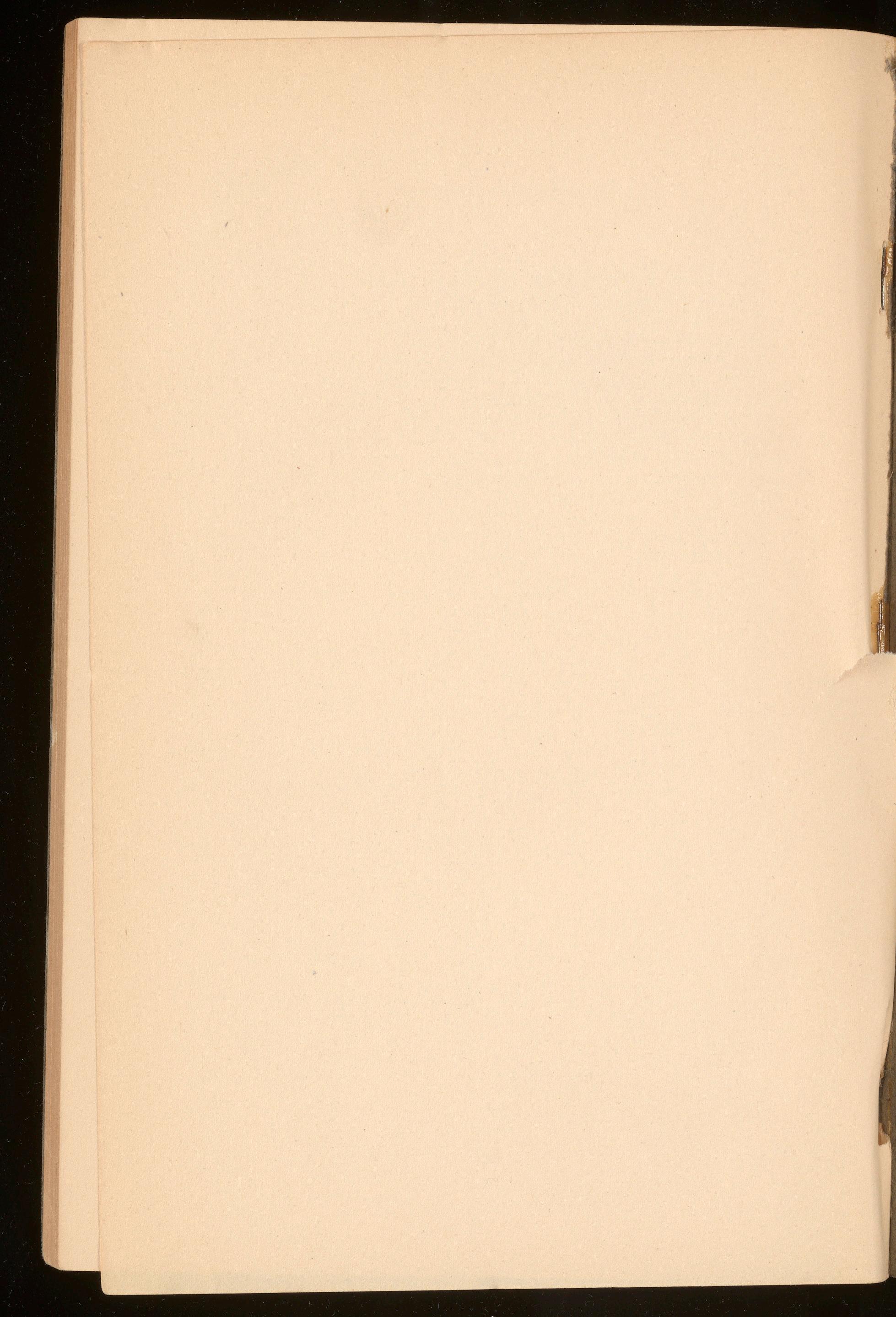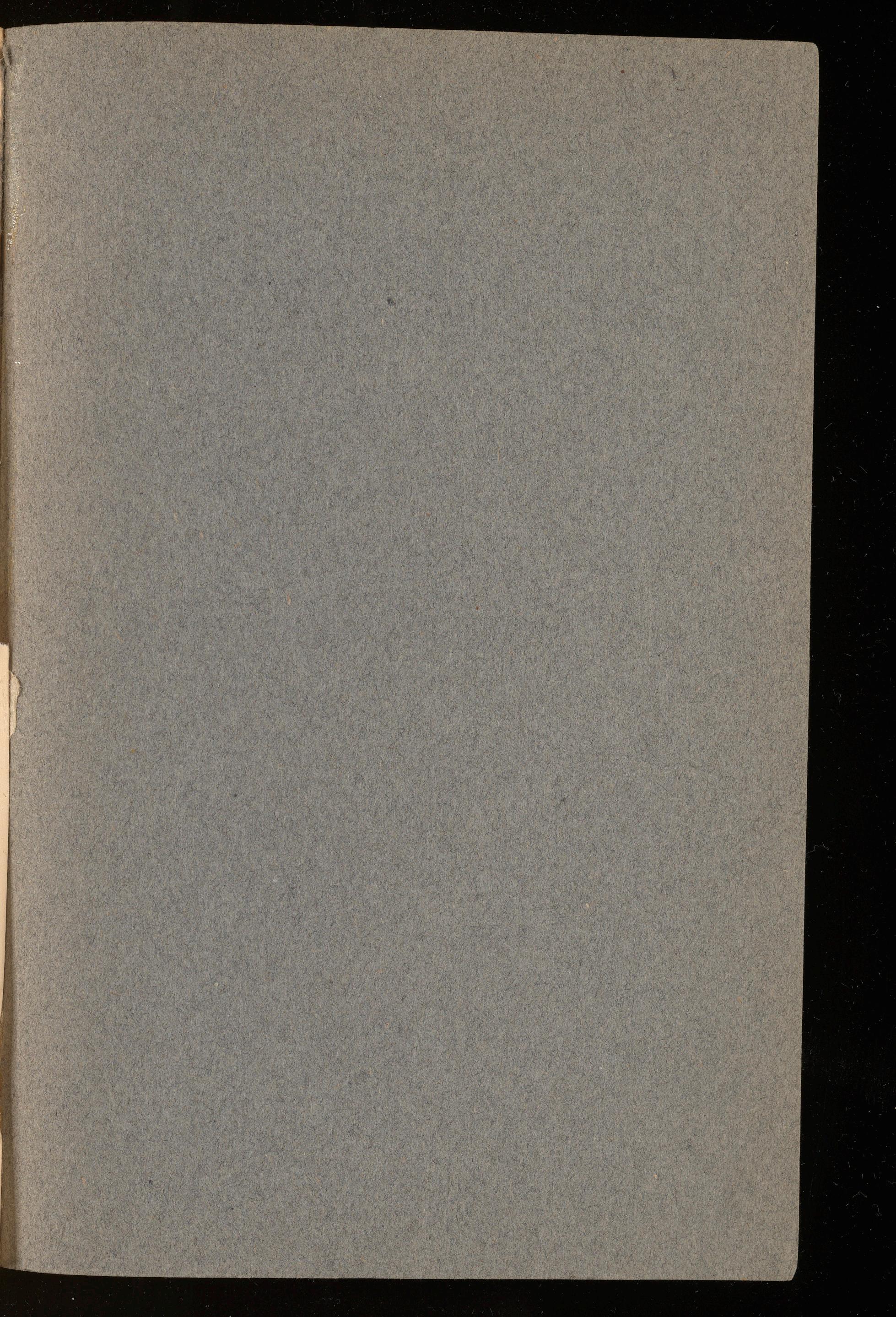University of Richmond . Bulletin
Vol, XXIV. MARCH 1, 1922 •

Published Quarterly
Bntered at the Poat Office at University of Richmond, Virginia •• second-ciaos mail matter
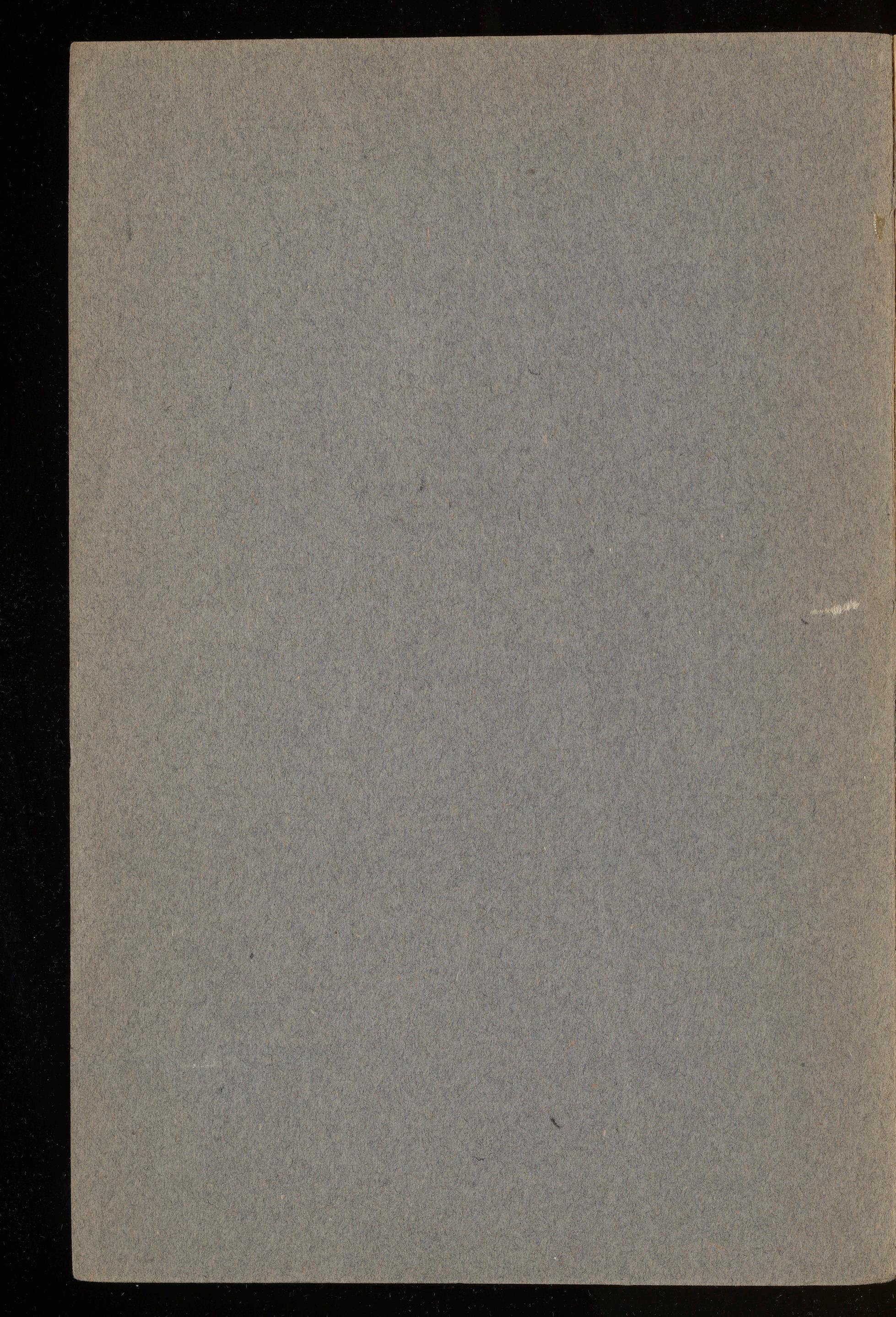

Vol, XXIV. MARCH 1, 1922 •

Published Quarterly
Bntered at the Poat Office at University of Richmond, Virginia •• second-ciaos mail matter

UNIVERSITY OF RICHMOND

SESSION 1921-1922 with An nounc em e nt s for
SESSION 1922-1923


SEPTEMBER 12-13, TuESDAY AND WEDNESDAY.-Entrance Examinations.
SEPTEMBER 13, WEDNESDAY, 9:00 A. M.-Registration of new students.
SEPTEMBER 14, THURSDAY.-Session begins: registration of students.
SEPTEMBER 15, FRIDAY.-Organi tation of classes.
SEPTEMBER 18, MONDAY, 11:00 A. M.-First chapel assembly.
SEPTEMBER 23, SATURDAY.-End of Special Examinations
OCTOBER 13, FRIDAY.-Applications for degrees. No,·EMBER 30, THURSDAY.-Thanksgiving holiday.
DECEMBER 15, FRIDAY.-Examinations begin.
DECEMBER 20, WEDNESDAY, 6:00 P. M.-Close of first term.
JANUARY 2, TUESDAY, 10:00 A. M.-Second term begins.
FEBRUARY 22, Washington's Birthday.
MARCH 4, SuNDAY.-Founders' Day.
MARCH 9, FRJDAY.-Examinations begin.
MARCH 14, WEDNESDAY, 6:00 P. M.-Close of second term.
MARCH 21, WEDNESDAY, 10:00 A. M.-Third term begins.
MAY 9, WEDNESDAY.-M. A. Theses handed in.
MAY 28, MoNDAY.-Regular examinations begin.
JuNE 3, SUNDAY, 11 :00 A. M.-Baccalaureate Sermon.
JUNE 4, MoNDAY.-Class Day Exercises.
JuNE 5, TuESDAY.-Annual meeting of Trustees, Alumni Reunions.
JuNE 6. WEDNESDAY, 10:30 A. M.-Commencement Day.
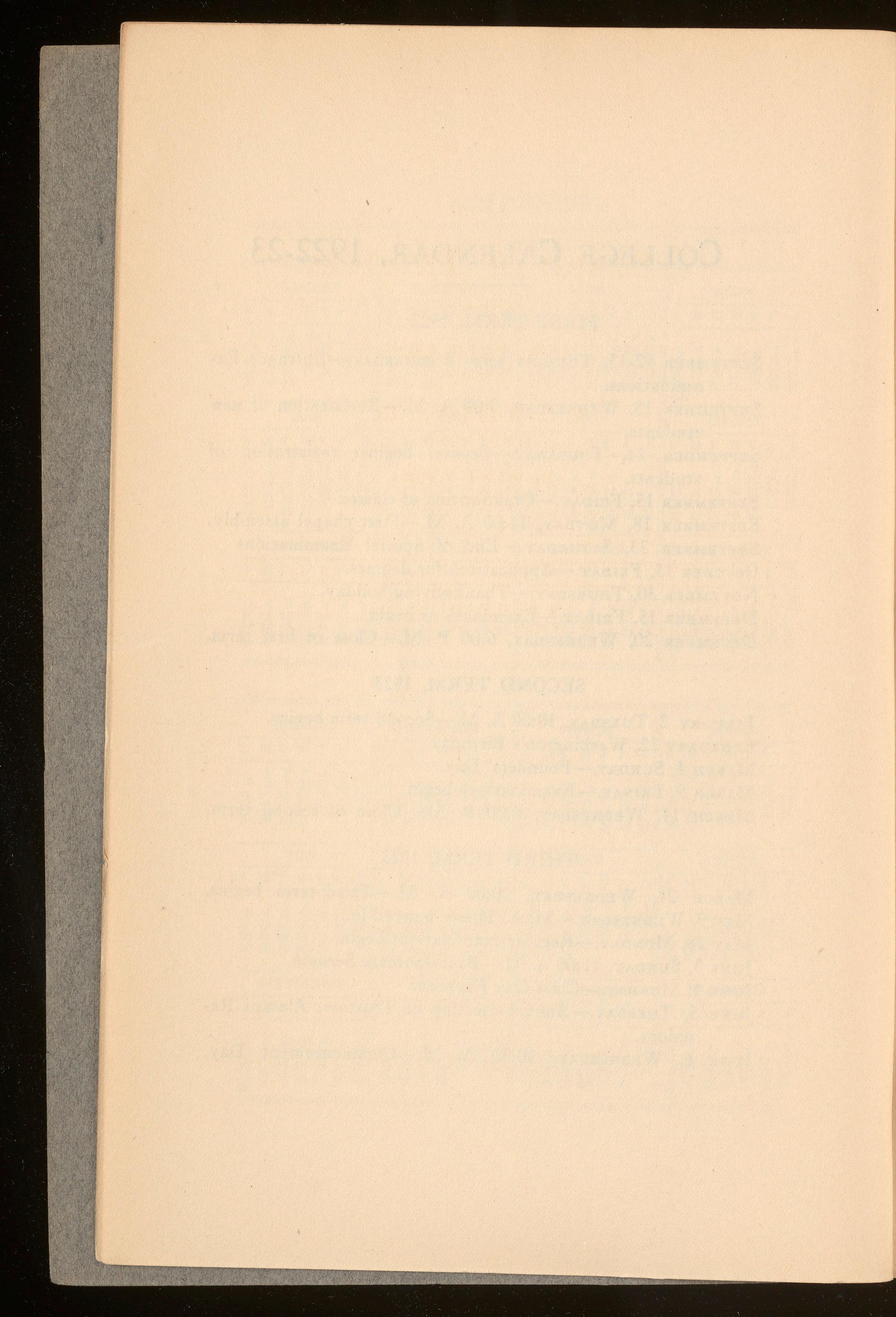
A. W. PATTERSON PRESIDENT
T. C. WILLIAMS, JR. VicE-PREs,bENT
B. WEST TABB SECRETARY
CLASS ONE
Term expires June, 1922
J. A. C. CHANDLER, Ph. D., Williamsburg.
C. T. WATKINS.................... Richmond
T. C. SKINNER, D . D., Columbia, s. C.
W. H. BAYLOR, D. D .. ...... Baltimore
NORMAN H. WILLIAMS Chase City
CLASS TWO
Term expires June, 1923
J. HuNT HARGRAVE............. Chatham
R.H PITT, D. D., LL. D., Richmond
H. W. STRALEY, Princeton, W. Va.
W. B. VEsT .................. Newport News
W. J. PARRISH........... Richmond
CLASS THREE
Term expires June, 1924
J. J. MONTAGUE.... Richmond
J.M. PILCHER, D. D Petersburg
PROF. GEo. SwANN.............. Trenholm
D. H. PITTS ....................... Scottsville
W. S. FORRES............ .Richmond
CLASS FOUR
Term expires June, 1925
W. C. CoR!lITT .... Portsmouth
JAMES D. CRUMP ...... Richmond
STUARTMcGuIRE, LL.D., Richmond
T. C. WILLIA~fS,JR. LL.D.,Richmond
Miss LULA WINSTON ..... Richmond

CLASS FIVE
Term expires June, 1926
A. J. MONTAGUE,LL. D ... . Richmond
R. C. WILLIAMS .... ... Richmond
B. T. GUNTER .............. Accomac
A. R. LONG...... ... Lynchburg
JOHN R. D1cKEY...................... Bristol
CLASS SIX
Term expires June, 1927
J. L. CAMP.... ....... Franklin
A. W. PATTERSON........ ..... Richmond
GEo. B. TAYLOR, D. D ........... Hollins
C. J. BILI.UPS...... .... Richmond
BURNLEY LANKFORD, M. D .. Norfolk
CLASS SEVEN
Term expires June, 1928
R. M. Sl\nTH .. ........ Richmond
T. B. McADAMS .... . ........ Richmond
JuDGE C. E. N1coL Alexandria
REv. J. T. STINSON, Bluefield, W. Va.
MRs. G. W. McDANIEL, University of Richmond.
CLASS EIGHT
Term expi res June, 1929
JUDGE W. R. BARKSDALE, Houston
I. B. LAKE, D. D ............ Uppcrville
E. M. LoNG ...................... Richmond
E. B. JACKSON, D. D Alexandria
B. P. WILLIS ............ Fredericksburg

The By-Laws provide that the President of the Trustees shall be a member of all standing committees, and that the President of the College shall be ex-officio a member of all except the Committee on Nomination of New Trustees. The Secretary of the Board is ex-officio Secretary of all standing committees of the Board.
ExECUTIVE.-T. C. Williams, Jr., Thos. B. McAdams, Russell C. Williams, J. D. Crump, J. L. Camp, R.H. Pitt, B. West Tabb.
LrnRARY.-T. C. Skinner, Stuart McGuire, A. J. Montague, C. J. Billups, Professor Handy, Professor Lough, W. J. Parrish, Miss Lula Winston.
Am FuNos (Scholarships and Donations).-]. M. Pilcher, W. H. Baylor, J. T. Stinson, W. B. Vest, B. P. Willis, R. M. Smith, H. W. Straley, Mrs. G. W. McDaniel.
NOMINATIONOF NEW TRUSTEEs.-W. R. Barksdale, B. T. Gunter, A. R. Long, G. B. Taylor, N. H. Williams, I. B. Lake.
NoMINATiONFOR HONORARYDEGREEs.-J. H. Hargrave, C. T. Watkins, C. E. Nicol, E. B. Jackson, Professor Gaines, D. H. Pitts, W. C. Corbitt.
FREDERICK WILLIAM BOATWRIGHT, M. A., LL. D., Ryland Hall President
RoBERT EDWIN GAINES, M. A., Litt. D., Ryland Hall Dean of Faculty
WILLIAM LOFTIN PRINCE, M. A., Ryland Hall Dean of Students and Registrar
BENJAMIN WEST TABB, B. A., Ryland Hall Treasurer
MARION GARNETT RYLAND, B. A., B. s., Librarian
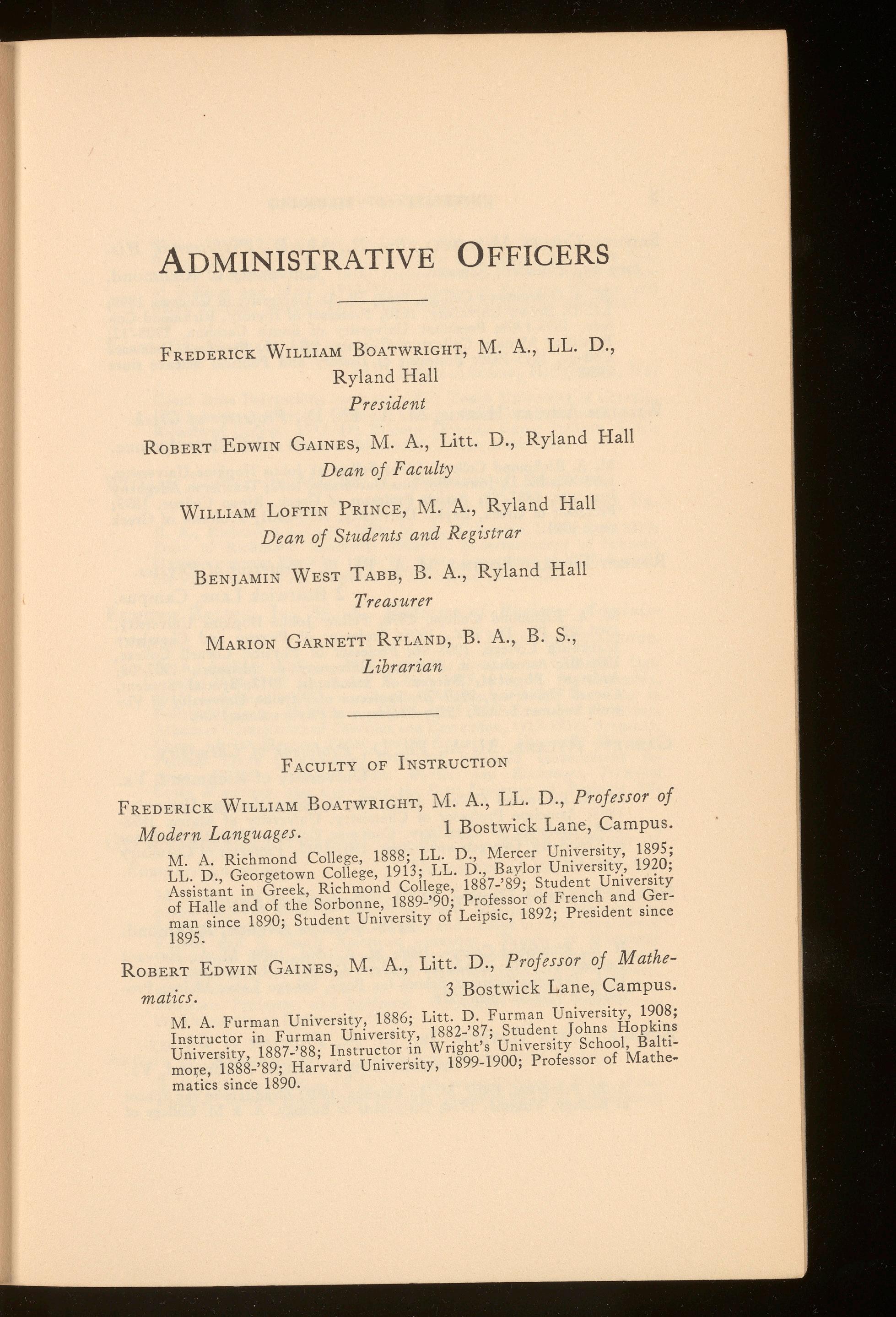
FACULTY OF INSTRUCTION
FREDERICK WILLIAM BoATWRIGHT, M. A., LL. D., Professor of Modern Languages. l Bostwick Lane, Campus.
M. A. Richmond College, 1888; LL. D., Mercer University, 1895; LL. D., Georgetown College, 1913; LL. D., Baylor University, 1920; Assistant in Greek, Richmond College, 1887-'89; Student University of Halle and of the Sorbonne, 1889-'90; Professor of French and German since 1890; Student University of Leipsic, 1892; President since 1895.
Ro BERT EDWIN GAINES, M. A., Litt. D., Professor of Mathematics. 3 Bostwick Lane, Campus.
M. A. Furman University, 1886; Litt. D. Furman University, 1908; Instructor in Furman University, 1882-'87; Student Johns Hopkins Univers ity, 1887-'88; Instructor in Wright's University School, Baltimor,e, 1888-'89; Harvard Univer 'sity, 1899-1900; Professor of Mathematics since 1890.

SAMUEL CHILES MITCHELL, PH. D., LL. D., Professor of History and Political Science. University of Richmond.
M. A. Georgetown College, 1888; Ph. D. University of Chicago, 1899; LL. D. Brown University, 1910; Professor of History, Richmond Col- lege, 1895-1908; President University of South Carolina, 1908-'12; President Medical College of Virginia, 1913-'15; Pres ,ident Delaware College, 1915-1920; Professor of Hi's'tory and Political Science since 1920.
WILLIAM AsBURY HARRIS, M. A., Ph. D., Professor of Greek. 2 College Avenue.
M. A. Richmond College, 1886; Fellow at Johns Hopkins University, 1891-'92; Ph. D. Johns Hopkins University, 1892; Teacher in Allegheny Institute, 1887-'88; Acting Professor of Greek , Ripon College, 1893; Professor of Greek, Baylor University, 1893-1901; Professor of Greek since 1901.
ROBERT EDWARD LovING, M. A., Ph. D., Professor of Physics. 2 Bostwick Lane, Campus.
M. A. Richmond College, 1898; Fellow Johns Hopkins University, 1901-'02; Ph. D., ibid., 1905; Professor of Physics and Chemistry Blackburn College, 1905-'06; Professor of Physics, Cornell College, 1906-' 07; Associate in Physics, University of Missouri, 1907-'08; Assistant Physicist, Bureau of Standards, 1917; Special Student, Cornell University, 1919-'20; Professor of Physics, University of Vir- ginia Summer School, 1920; Professor of Physics since 1908.
GARNETT RYLAND, M. A., Ph. D., Professor of Chemistry.
University of Richmond, Va.
M. A. Richmond College, 1892; Ph. D. Johns Hopkins University, 1898; Associate Professor of Chemistry, University of Maine, 1898- 1901; Professor of Chemistry, Converse College, 1901-'03; Professor of Chemistry, Georgetown College, 1903-1917; Professor of Chemistry since 1917.
HENRY BRANTLY HANDY, M. A., Professor of English. 2218-A Grove Avenue, Richmond.
B. _A., ~ichmond College, 1906; M. A., ibid., 1909; M. A., Harvard Umvers1ty, 1913; Graduate Student Columbia University, summer 1915; Director Summer School for Boys Sebago Lake Maine· Pro- fessor of English since 1918. ' ' '
HoRACE EDWIN HAYDEN, JR.,M. A., Professor of Biolog y. Chesterfield Apartments, Richmond, Va.
A. B., Princeton, 1905; M. A., Virginia, 1907· Graduate in the School of Biology, Virginia, 1910; Instructor in Biol~gy, A. & M. College of
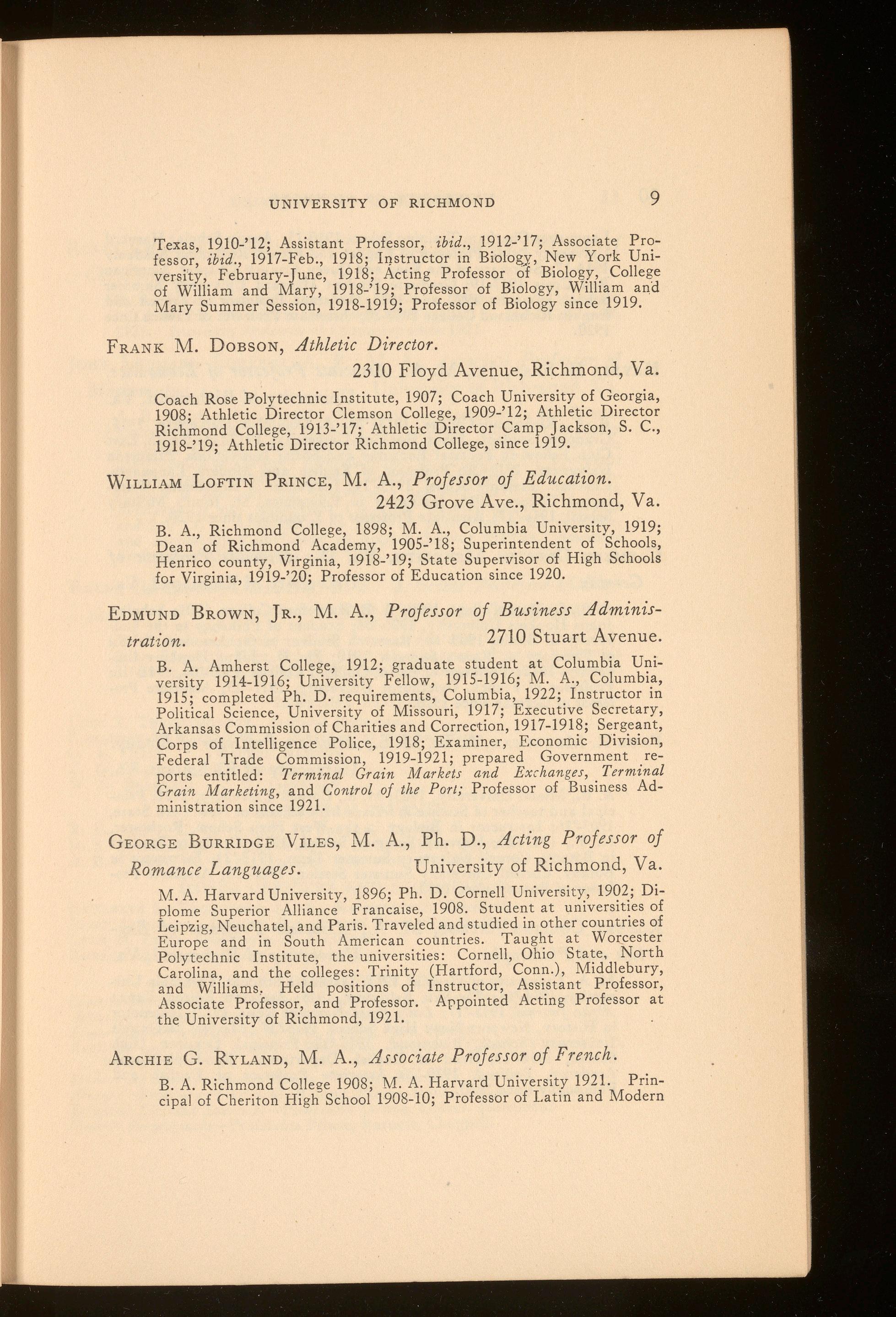
Texas, 1910-'12; Assistant Professor, ibid., 1912-'17; Associate Professor, ibid., 1917-Feb., 1918; Il)structor in Biology, New York University, February-] une, 1918; Acting Professor of Biology, College of William and Mary, 1918-'19; Professor of Biology, William an,d Mary Summer Session, 1918-1919; Professor of Biology since 1919.
FRANK M. DOBSON, Athletic Director.
2310 Floyd Avenue, Richmond, Va.
Coach Rose Polytechnic Institute, 1907; Coach University of Georgia, 1908; Athletic Director Clemson College, 1909-'12; Athletic Director Richmond College, 1913-'17; Athletic Director Camp Jackson, S. C., 1918-'19; Athletic Director Richmond College, since 1919.
WILLIAM LOFTIN PRINCE, M. A., Professor of Education. 2423 Grove Ave., Richmond, Va.
B. A., Richmond College, 1898; M. A., Columbia University, 1919; Dean of Richmond Academy, 1905-'18; Superintendent of Schools, Henrico county, Virginia, 1918-'19; State Supervisor of High Schools for Virginia, 1919-'20; Professor of Education since 1920.
EDMUND BROWN, JR., M. A., Professor of Business Administration.
2710 Stuart Avenue.
B. A. Amherst College, 1912; graduate student at Columbia University 1914-1916; University Fellow, 1915-1916; M. A., Columbia, 1915; completed Ph. D. requirements, Columbia, 1922; Instructor in Political Science, University of Missouri, 1917; Executive Secretary, Arkansas Commission of Charities and Correction, 1917-1918; Sergeant, Corps of Intelligence Poli~e, 1918; Examiner, Economic Division, Federal Trade Commission, 1919-1921; prepa.red Government reports entitled: Terminal Grain Markets and Exchanges, Terminal Grain Marketing, and Control of the Port; Professor of Business Administration since 1921.
GEORGE BURRIDGE VILES, M. A., Ph. D., Acting Professor of Romance Languages. University of Richmond, Va.
M.A. Harvard University, 1896; Ph. D. Cornell University, 1902; Diplome Superior Alliance Francaise, 1908. Student at universities of Leipzig, Neuchatel, and Paris. Traveled and studied in other countries of Europe and in South American countries. Taught at Worcester Polytechnic Institute, the universities: Cornell, Ohio State, North Carolina, and the colleges: Trinity (Hartford, Conn.), Middlebury, and Williams. Held positions of Instructor, Assistant Professor, Associate Professor, and Professor. Appointed Acting Professor at the University of Richmond, 1921.
ARCHIE G. RYLAND, M. A., Associate Professor of French.
B. A. Richmond College 1908; M. A. Harvard University 1921. Principal of Cheriton High School 1908-10; Professor of Latin and Modern

Languages Chatham Training School 1910-13; Austin Scholar Harvard University 1914; Professor of English and French Richmond Academy 1914-17; Secretary of the King and Queen County Chapter American Red Cross 1917-19; Graduate Student Harvard University Summer School, summers 1920 and 1921; Assistant Professor of French and English Richmond College 1919-20; Associate Professor of French since 1920.
HAYNIE H. SEAY, JR., M. A., Associate Professor of Economics. University of Richmond, Va.
B. A., Richmond College, 1913; M. A. Columbia University, 1915; Graduate Student, Johns Hopkins University, 1917-'18; Smith East Club Fellow in Political Economy and Social Institutions, Princeton University, 1919-'20; Professor of English and Modern Languages, Chatham Training School, 1913-'14; Instructor in Economics, Washington College, 1916; Instructor in Economics, St. John's Military School, 1916-' 17; Associate Professor of Economics since 1920.
CLEMENT ORESTES MEREDITH, Ph. D., Associate Professor of German. University of Richmond, Va.
A. B., Guilford College, 1900; A. B Haverford College, 1901; Scholar, Johns Hopkins University, 1906-'08; Student of Philology in the University of Berlin, 1908-' 10; Research Student in the American School of Philology at Rome, Summer 1910; Ph. D., Johns Hopkins University, 1912; Professor of Latin, Guilford College, 1903-'06, 1911-'16; Professor of French, Oglethorpe University, 1917-'19; Associate Professor of German since 1920.
PAUL R. MERRIMAN, A. B., M. S., Associate Professor of Botany. University of Richmond, Va.
A. B., Miami Unive'rsity, 1903; M. S., Corne!! University, 1921; Principal and teacher of Science in village high school ,s of New York State, 1903-'16; Instructor in Biology in the West High School, Rochester , N. Y , 1917-'20; Harvard Summer School, 1912; Graduate Student in Botany, Cornell University Summer Term, 1915-'21; Instructor in Botany, Cornell University Summer Session, 1920-'21; Associate Professor of Botany since 1920.
RoBERT COLLINS AsTROP, M. A., Associate Professor of English and Philosophy. University of Richmond, Va.
M.A., University of Virginia, 1913; Graduate Student, Columbia University, 1914-'15; The Sun , Baltimore, 1915; Associate Editor, Kappa Alpha Journal, 1915-'17; Daily Press, Newport News, 1917; Instructor in History, Newport News High School, 1916-'17; Master, McGuire's University School, Richmond, 1917-'18; Principal Dendron High School, 1918-'19; Head of English Department, Randolph-Macon Academy, Bedford, 1919-'20; Associate Professor of English and Philosophy since 1920.

11
RoBIN CHARLES BURRELL, M. S., M. A., Associate Professor of Chemistry.
B. Sc. Mount Union College 1918; Graduate Student and Instructor in Chemistry, Ohio State University 1919-'21; M. S., and M. A., ibid, 1921. Associate Professor of Chemistry since 1921.
JoHN LEONARD ROBERTS, A. B., M. A., Associate Professor of Mathematics. University of Richmond, Va.
A. B. Bowdoin College 1911; Instructor in Mathematics and Science Kennebunk High School 1911-'12; and in North Yarmouth Academy 1 1912-'13; Teacher Maunabo, Porto Rico, 1913-'14; Instructor in Mathematics and History Jefferson School for boys 1914-'15; Instructor in Mathematics and Astronomy, University of Maine, 1915-'17; Instructor in Mathematics, Mercersburg Academy, 1917-'18; M. A. in Mathematics and Education, Columbia University, 1917. Student and 2nd Lt. C. A. in the Army 1918-'19; Instructor in Mathematics, and Astronomy Case School of Applied Science 1919'21. Associate Professor of Mathematics since 1921.
RALPH RAYMOND CHAPPELL, B. S., Associate Professor of Physics. 2112 E. Clay St., Richmond, Va.
B. S. Richmond College 1919; Instructor in Physics and Chemistry, John Marshall High School, 1919-'21; Graduate Student Columbia University 1920 and 1921. Associate Professor of Physics since 1921.
LIBRARY STAFF
Lucy T. THROCKMORTON, Assistant Librarian.
ELIZABETH P. GAINES, B. A. Westhampton Reading R oom
0. L. HITE; RACHEL NEWTON
C. G. CARTER; ELIIA1'ETH GAYLE w. N. BEEHLER; C. w. GARRISON
STUDENT ASSISTANTS
R. E. ALLEY, C. Y. Hui, J. T. TUCKER, Physics.
H. S. CuMMINS, S. H. BENNETT, W. E. ScRrnNER, Chemistry. A. B. CLARKE, R. E. GARST, BEE STOCKTON, English. OTHER OFFICERS AND SECRETARIES
ELIZABETH L. THOMASSON, M. A., Secretary to the President.
MARY LIGHFOOT, Assistant Registrar and Secretary to the Dean.
LEAH D. LYNN, Secretary to the Treasurer.
ROBERT M. STONE, Cashier and Bookkeeper.
FACULTY COMMITTEES FOR 1922-23.
Courses and Degrees-Professors Loving, Gaines, Prince, Handy, Harris. Athletics-Professors Dobson, Harris, Roberts. Fraternities-Professors G. Ryland, Prince, Seay 1 Harris. Publicity and Public Lectures-Professors Mitchell, Gaines, Viles, A. G. Ryland.
Student Affairs-Professors Handy, Hayden, Meredith, Astrop. Alumni-Professors Harris, G. Ryland, Prince, Handy, Seay. Religious Life and Exercises-Professors Loving, Gaines, Merriman. Student Employment-Professors Prince, Barnett, Chappell.
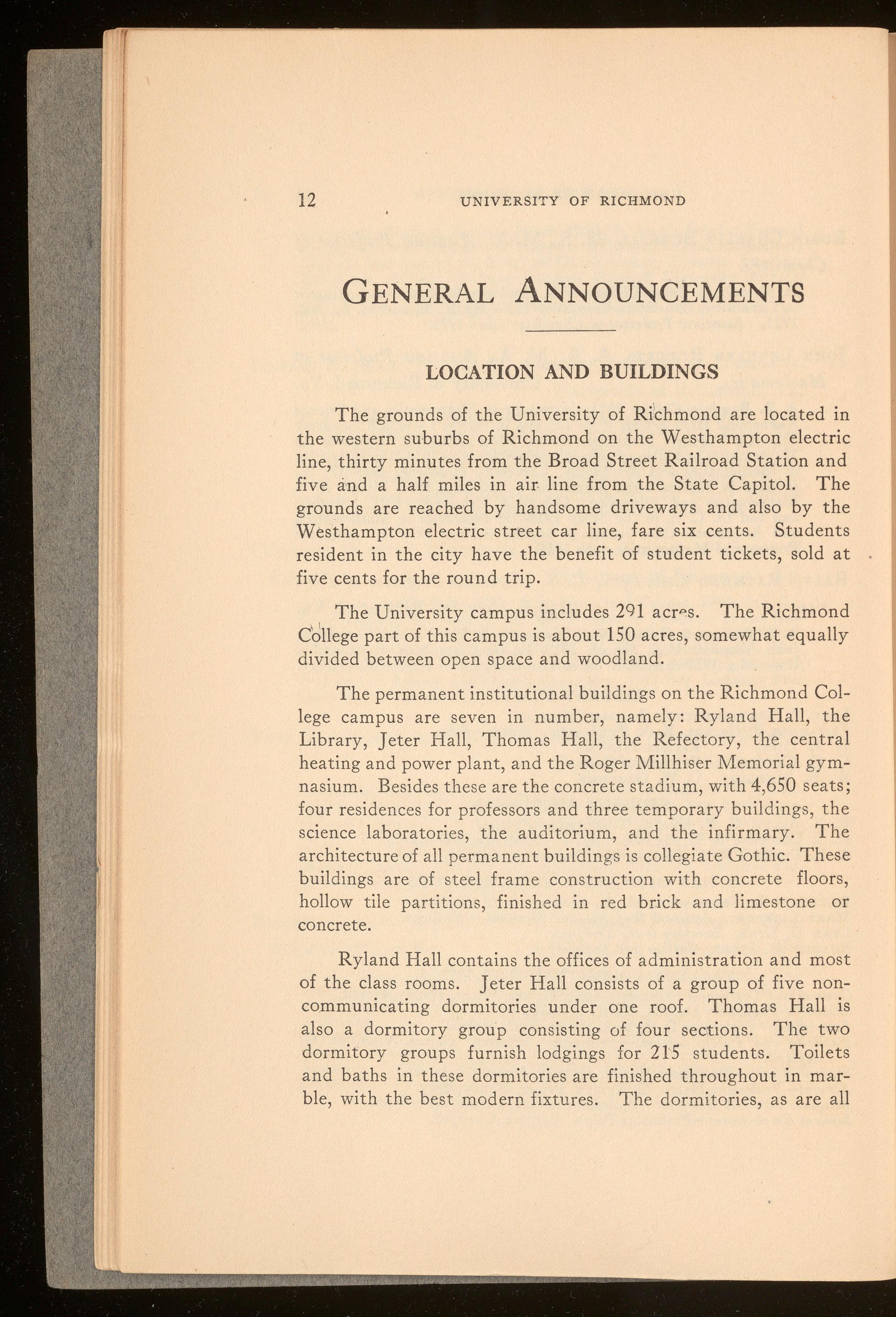
The grounds of the University of Ri'chmond are located in the western suburbs of Richmond on the Westhampton electric line, thirty minutes from the Broad Street Railroad Station and five ,ind a half miles in air line from the State Capitol. The grounds are reached by handsome driveways and also by the Westhampton electric street car line, fare six cents. Students resident in the city have the benefit of student tickets, sold at five cents for the round trip.
The University campus includes 291 acr~s. The Richmond Cbllege part of this campus is about 150 acres, somewhat equally divided between open space and woodland.
The permanent institutional buildings on the Richmond College campus are seven in number, namely: Ryland Hall, the Library, Jeter Hall, Thomas Hall, the Refectory, the central heating and power plant, and the Roger Millhiser Memorial gymnasium. Besides these are the concrete stadium, with 4,650 seats; four residences for professors and three temporary buildings, the science laboratories, the auditorium, and the infirmary. The architecture of all permanent buildings is collegiate Gothic. These buildings are of steel frame construction with concrete floors, hollow tile partitions, finished in red brick and limestone or concrete.
Ryland Hall contains the offices of administration and most of the class rooms. Jeter Hall consists of a group of five noncommunicating dormitories under one roof. Thomas Hall is also a dormitory group consisting of four sections. The two dormitory groups furnish lodgings for 215 students. Toilets and baths in these dormitories are finished throughout in marble, with the best modern fixtures. The dormitories, as are all
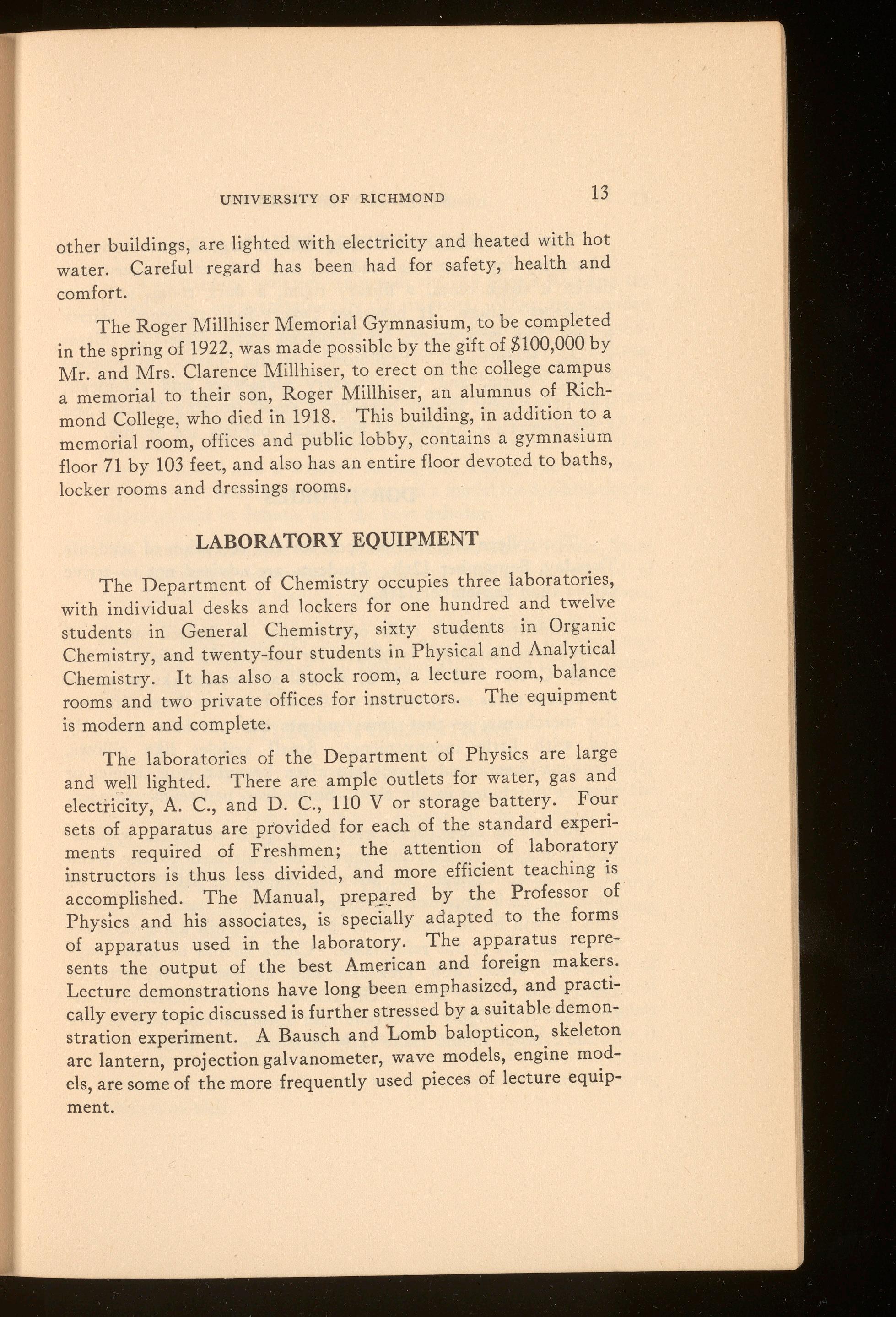
other buildings, are lighted with electricity and heated with hot water. Careful regard has been had for safety, health and comfort.
The Roger Millhiser Memorial Gymnasium, to be completed in the spring of 1922, was made possible by the gift of $100,000 by Mr. and Mrs. Clarence Millhiser, to erect on the college campus a memorial to their son, Roger Millhiser, an alumnus of Richmond College, who died in 1918. This building, in addition to a memorial room, offices and public lobby, contains a gymnasium floor 71 by 103 feet, and also has an entire floor devoted to baths, locker rooms and dressings rooms.
The Department of Chemistry occupies three laboratories, with individual desks and lockers for one hundred and twelve students in General Chemistry, sixty students in Organic Chemistry, and twenty-four students in Physical and Analytical Chemistry. It has also a stock room, a lecture room, balance rooms and two private offices for instructors. The equipment is modern and complete.
The laboratories of the Department of Physics are large and w:ell lighted. There are ample outlets for water, gas and electricity, A. C., and D. C., 110 V or storage battery. Four sets of apparatus are pr'ovided for each of the standard experiments required of Freshmen; the attention of laboratory instructors is thus less divided, and more efficient teaching is accomplished. The Manual, preµ,!!_red by the Professor of Physics and his associates, is specially adapted to the forms of apparatus used in the laboratory. The apparatus represents the output of the best American and foreign makers. Lecture demonstrations have long been emphasized, and practically every topic discussed is further stressed by a suitable demonstration experiment. A Bausch and Lomb balopticon, skeleton arc lantern, projection galvanometer, wave models, engine models, are some of the more frequently used pieces of lecture equipment.

The Department of Biology has a large lecture room, a laboratory for beginning students, and one for advanced students, a stock room, a library room, a dark room, and two professors' offices. It possesses twenty-four students' microscopes, five microscopes for advanced work, dissecting microscopes, microtomes, incubators, parafin baths, microscope lamps, vivaria, and the necessary glass-ware and chemicals. The department library contains a small working library, and a representative number of biological journals are on file.
The college dormitories open for the reception of students Tuesday, September 12th. Students are advised not to arrive earlier than September 12th.
Students furnish their own rooms. A limited supply of second-hand furniture is offered for sale at the college by the Y. M. C. A. The Y. M. C. A. will also undertake to secure the lowest r'ates on complete outfits of furniture from different city merchants, so that new students can purchase promptly and with little inconvenience. Small articles like pillows, blanke_!:s, sheets and towels are aften brought from home, or may be purchased in the city. Single iron bedsteads are used.
Rooms in dormitories will be assigned whenever application is made. Application should be addressed to the Dean of Richmond College. An advance deposit of $10.00 must be made by each applicant in order to hold a particular room. This fee will be deducted from the student's bill upon entrance to college, but is not refundable. Check should be made payable to B. West Tabb, Treasurer, and enclosed in the letter of application to the Dean. On account of the increase in attendance it is highly important that students who wish to live on the campus should make early application for room.
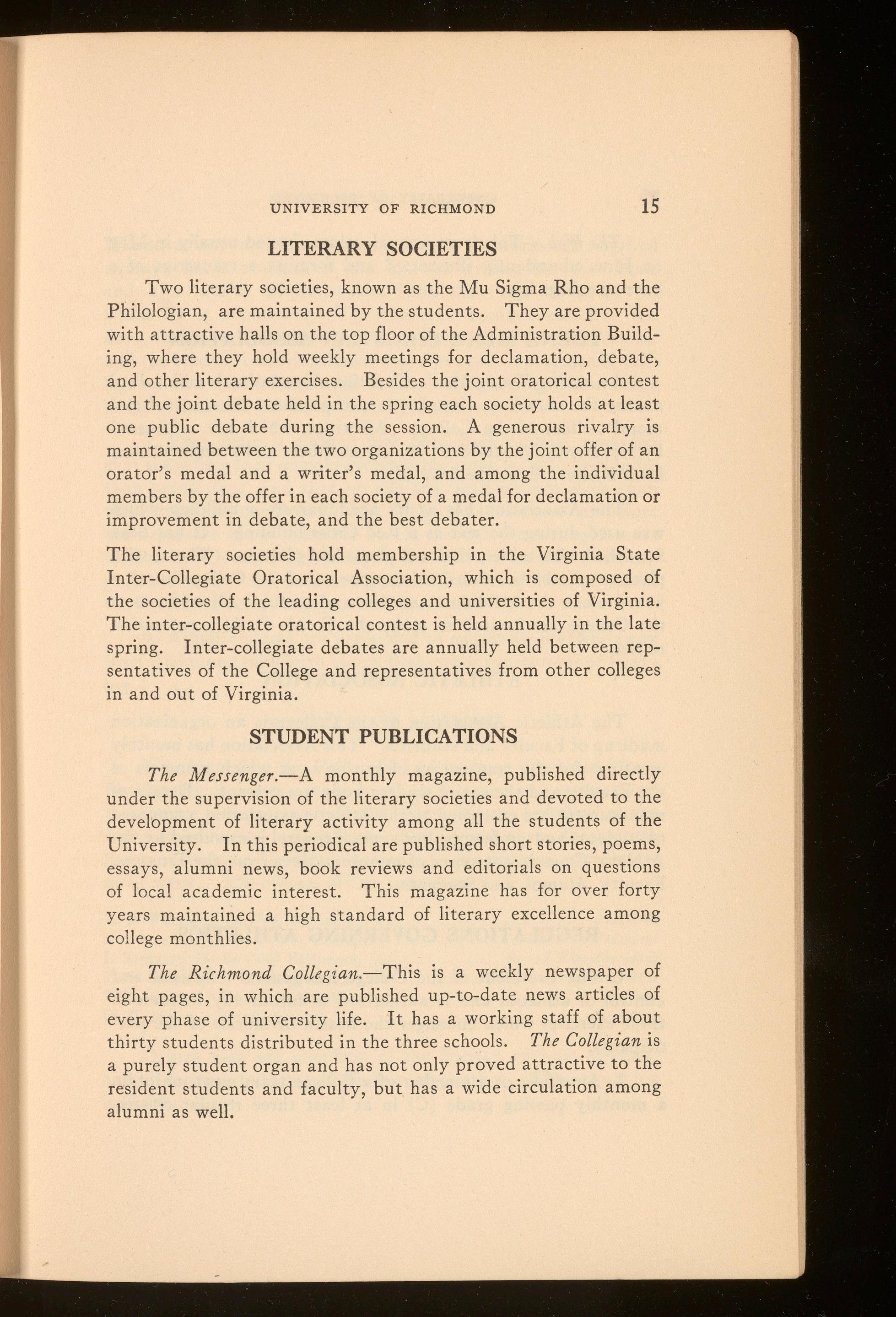
Two literary societies, known as the Mu Sigma Rho and the Philologian, are maintained by the students. They are provided with attractive halls on the top floor of the Administration Building, where they hold weekly meetings for declamation, debate, and other literary exercises. Besides the joint oratorical contest and the joint debate held in the spring each society holds at least one public debate during the session. A generous rivalry is maintained between the two organizations by the joint offer of an orator's medal and a writer's medal, and among the individual members by the offer in each society of a medal for declamation or improvement in debate, and the best debater.
The literary societies hold membership in the Virginia State Inter-Collegiate Oratorical Association, which is composed of the societies of the leading colleges and universities of Virginia. The inter-collegiate oratorical contest is held annually in the late spring. Inter-collegiate debates are annually held between repsentatives of the College and representatives from other colleges in and out of Virginia.
The Messenger.-A monthly magazine, published directly under the supervision of the literary societies and devoted to the development of literary activity among all the students of the University. In this periodical are published short stories, poems, essays, alumni news, book reviews and editorials on questions of local academic interest. This magazine has for over forty years maintained a high standard of literary excellence among college monthlies.
The Richmond Collegian .-This is a weekly newspaper of eight pages, in which are published up-to-date news articles of every phase of university life. It has a working staff of about thirty students distributed in the three schools. The Collegian is a purely student organ and has not only proved attractive to the resident students and faculty, but has a wide circulation among alumni as well.

The Web.-This is an annual volume issued usually in May or June, abundantly illustrated and forming a transcript of a year of college life.
An active Young Men's Christian Association is maintained among the students. Its object is to promote the spiritual and moral welfare of the College. Meetings, which are addressed by representative students, faculty members and prominent men from Richmond, are held weekly.
The Association has as its headquarters a building which was used during the war as a Red Cross building. It has been furnished with tables, chairs, a piano and pictures. These, with pictures of athletic teams which represented the College in other years, make the buildil'l.g attractive and useful. All students of the College are invited to make the Y. M. C. A. a recreation center.
The Athletic Association of the College is an organization made up of Faculty and students. This Association has monthly meetings for the transaction of business, at which members of the Faculty and the entire student body are present. Details of management are entrusted to the Athletic association, composed of students and professors, but general control is exercised by the Athletic Council, composed of representatives from the Trustees, Faculty, Alumni, and Students.
1. The President of the College has general oversight and control of athletics and is authorized to forbid any features in these exercises which endanger the health or morals of the participants.
2. An officer or a member of a College team must maintain a monthly passing grade (C) in at least three regular classes.

Whenever any member of a team fails to maintain the required average he is notified of the fact in writing by the Dean and this notice dismisses him from the team or teams of which he is a member. The dismissal becomes effective ten days, including date of notice, from date of official notification, and the student receiving notice may not again represent the College on an athletic team until he has made the required average in his classes and has been formally reinstated
3. Each team is allowed four trips from College, provided that these four trips do not involve being away from College more than seven days, and that no one trip shall require more than three days' absence from College duties. At least one day before the departure of any team the coach, through the manager, must furni sh the Dean of the College a list of the men who will compose the team. All propo sed games must have the approval of the President before engagements are made.
4. Athletic teams are permitted to engage in contests away from Richmond only with teams from other institutions of learnmg.
The Alumni of the College have long been organized into a Society, which holds annual meetings to renew old associations, maintain a close connection with Alma Mater, and further the cause of education and letters. For several years the custom has been to have an annual banquet on Tuesday of commencement week. The officers of the Society are:
H. R. POLLARD,JR. ('89) Richmond, Va . ... .... .. President DoucLAS S. FREEMAN('04) Richmond, Va ............ . ........First Vice-President
J. EMERSONHICKS ('00) Baltimore, Md ..... Second Vice-President
E. S. LIGON ('99) Blackstone, Va .... ....... Third Vice-President
W. L. PRINCE ('98) Richmond, Va ................... ....... Treasurer
H B. HANDY ('06) Richmond, Va ............. . ..Secretary
Degree men are members of the Society without election, and all former students are eligible for election. The annual fee is $1.00.

In May, 1898, there was organized in Louisville a Chapter of the G e ner a l Society of Alumni, which is known as the "Kentucky A ssociation of Richmond College Alumni". The pre se nt officers are Dr S. E. Woody, Louisville, President; Dr. W . 0. Carver, Louisville, Secretary and Treasurer.
In February, 1899, the alumni resident in Norfolk, Va., and vicinity organized a "Norfolk Chapter of Richmond College Alumni." The chapter holds annual meetings in February. The present officers are L. B. Cox, Norfolk, President; Burnley Lankford, Esq., Norfolk, Secretary and Trea surer.
In April, 1903, there was organized in N ewport News, Va., a" Peninsula Chapter of Richmond College Alumni." The chapter holds annual meetings.
During the session of 1905-06 alumni chapters were organized in Richmond, Baltimore, Lynchburg and Roanoke.
The West Virginia Chapter was organized October, 1910, at Hinton, W. Va., with J. W. Mitchell, M. L. Wood, and W. L. Richardson as officers.
The Richmond Chapter holds its annual meeting on March 4th , "Founders' Day." The officers of the Chapter are Col. John A. Cu .tchins, President; Claude M. Dean, Secretary-Treasurer
In May, 1916, a New York Chapter was organized at th e Waldorf-Astoria with twenty-nine members. The officers of this chapter are:
JESSE READ TAYLOR ... P,esid ent
CHARLES MARSHALL GRAVES Vice-Presid ent
HENRY K. ELLYSON, JR Vice-Pr esi dent
CURTIS LEE LAWS Trearurer
J, LAURENS ELMORE Secr etary
In June, 1920, a Chapter of Alumni was organized in Danville, Va. Rev. J. E. Hicks, D. D., was elected President.
The President of the College will be glad to correspond with alumni who desire to form local associations.
I. The Tanner Medal.-Founded by Colonel William E. Tanner, of Richmond, Va., in honor of his parents, John F. and Harriet L. Tanner-is given to the most proficient graduate in the Department of Greek.
II. The James D. Crump Prize-Founded by the gentleman whose name it bears-is a prize of twenty dollars in gold, given for excelle .nce in Course 2 in Mathematics. It is awarded in part on the regular class work and in part on extra work.
IV. The J. Taylor Ellyson Medal in History-Lieutenant-Governor J. Taylor Ellyson, of Richmond, established in 1912 a prize to be awarded to the student in the Department of History and Political Science, who shall present the best piece of orginal investigation in Virginia or Southern History.
In response to a petition from the student body, members of the Faculty, who were also members of the College SocietyPhi Beta Kappa~qrgart.ized a scholarshi;p society in Richmond College to be known as the Arachnidre. In order to be eligible to the Arachnidre, a student must have maintained an average grade of 90 per cent. throughout the College course, he must belong to the first sixth of the graduating class on the basis of scholarship, and he must have good character. Election is by the Faculty from a list of eligibles presented by a Faculty Committee of Phi Beta Kappa and Arachnidre men.
The Society of Arachnidre has been extended to include members of Westhampton College.
The elections for 1921 were as follows:
Stover H Bowles
Maie A. Collins

Leonora Dorsey
Theresa Po!lak
Katherine H. Spicer

In 1920 a group of students assisted by faculty members founded a local society-Chi Eta Upsilon-for the recognition of superlative attainment in scholarship, athletics, literary endeavor, and social leadership. Emphasis was also placed upon character. In 1921 Chi Eta Upsilon was merged into the national organization, Omicron Delta Kappa, an honor society of like aims and ideals.
Elections to Omicron Delta Kappa are held twice a year, and a formal announcement made before the entire student body at a designated chapel period.
The elections for 1922 were as follows:
A. B. CLARKE, 1923 of Richmond, Va.
W. 0. CARVER, 1923 of Louisville, Ky.
W. T. HAYNES, 1922 of Richmond, Va.
R. T. MARSH, 1922 of Richmond Va.
R. T. PRICE, 1923 of Blacksburg, Va.
The deportment of a Christian gentleman is the standard to which every student is expected to conform. All appropriate means are used to develop and confirm a sense of personal honor and sacred regard for truth, as upon these rests the best reliance for good conduct. A few plain and reasonable rules are prescribed, and each matriculate must pledge himselftoobeythem.
1. Occupants of rooms will be held responsible for the good order of their rooms, as well as for any damage or defacement they may sustain. Changes from one room to another may be allowed by the Dean, but must not be made without his previous consent.
2. A resident student desiring to leave the premises during the ]:iours when, by the schedule of recitations, he should be in his classes, shall get permission from the Dean. Any student desiring to be absent from college must get the Dean's permit in writing and exhibit to each of his professors.
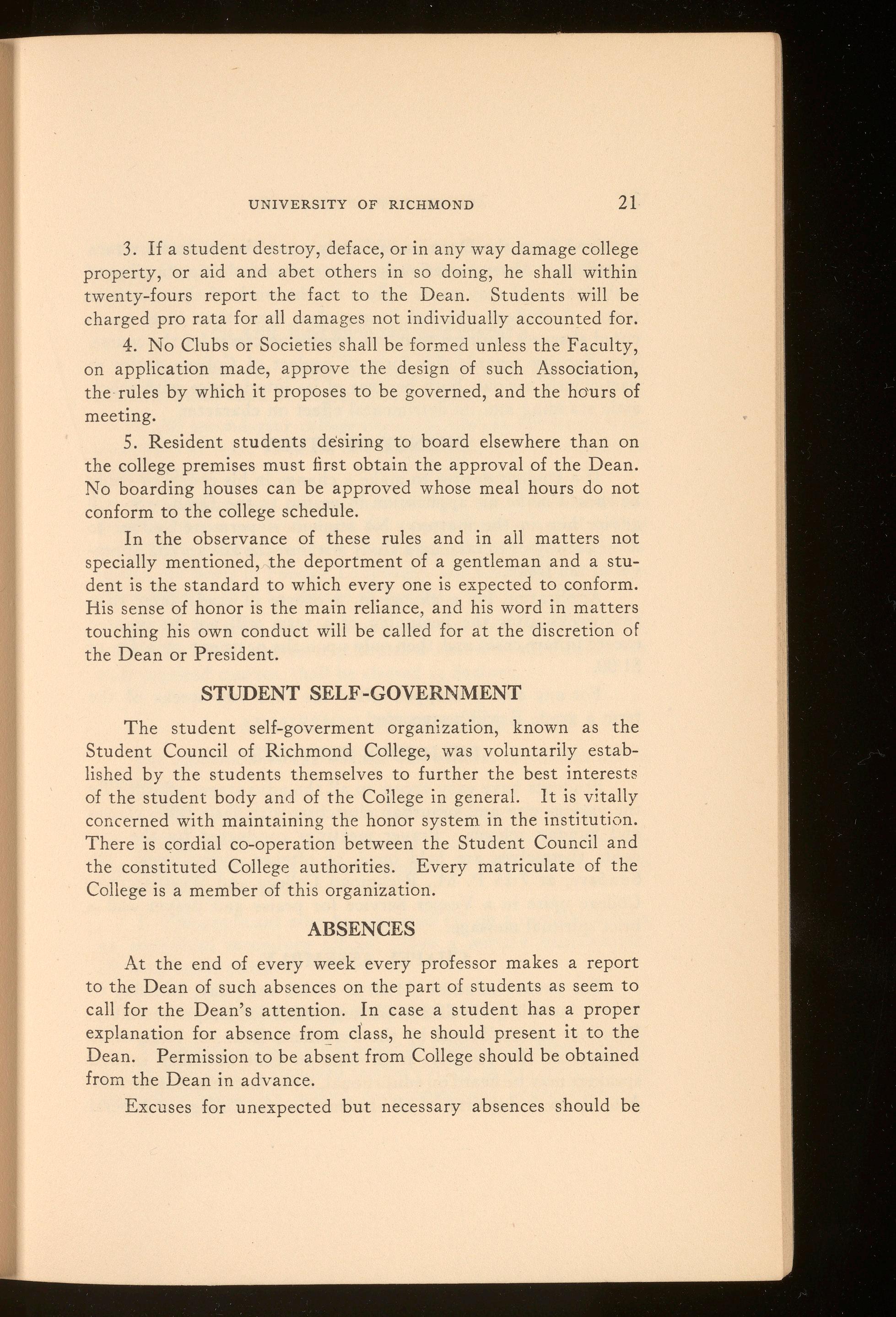
3. If a student destroy, deface, or in any way damage college property, or aid and abet others in so doing, he shall within twenty-fours report the fact to the Dean. Students will be charged pro rata for all damages not individually accounted for.
4. No Clubs or Societies shall be formed unless the Faculty, on application made, approve the design of such Association, the rules by which it proposes to be governed, and the ho'urs of meeting.
5. Resident students desiring to board elsewhere than on the college premises must first obtain the approval of the Dean. No boarding houses can be approved whose meal hours do not conform to the college schedule.
In the observance of these rules and in all matters not specially mentioned, the deportment of a gentleman and a student is the standard to which every one is expected to conform. His sense of honor is the main reliance, and his word in matters touching his own conduct will be called for at the discretion of the Dean or President.
The student self-goverment organization, known as the Student Council of Richmond College, was voluntarily established by the students themselves to further the best interests of the student body and of the College in general. It is vitally concerned with maintaining the honor system in the institution. There is cordial co-operation between the Student Council and the constituted College authorities. Every matriculate of the College is a member of this organization.
At the end of every week every professor makes a report to the Dean of such absences on the part of students as seem to call for the Dean's attention. In case a student has a proper explanation for absence from class, he should present it to the Dean. Permission to be ab;ent from College should be obtained from the Dean in advance.
Excuses for unexpected but necessary absences should be

obtained from the Dean immediately upon the student's return to college. Absences seriously reduce the scholastic standing of a student, a~d may cause failure on the work of the month or term. A student who has in any class more than three unexcused absenses during a term will receive no credit for the course. The Faculty regards this form of neglect of College duties as particularly serious, both because of its interference with scholastic standing and its detrimental effect on character.
If a student desires to make a change in his course of study he should make his application in person to the Dean, who will advise him in the matter. No student is permitted either to drop a study or to take up a study without the advice and approval of the Dean.
Application for a change in a course of study later than two weeks after the beginning of a term will not be granted except in rare cases and then only upon the payment of a fee of $1.00.
For any course dropped after the first two weeks of the term a grade E will be recorded.
Students have easy access to all the advantages afforded by the various city and suburban churches, with their Bible classes and Sunday schools. Prayer meetings cortducted by the students themselves are held once, or oftener, every week. On Sundays, at 7:15 P. M., Richmond College and Westhampton College unite in a Vesper Service for praise and prayer and a brief spiritual message.
For twenty minutes (11 :00 to 11 :20) each day, Monday ta Friday inclusive, all classes are suspended for chapel assembly. Exercises are conducted by the President, Dean, or some other member of the Faculty; from time to time specially invited speakers may be heard on educational, civic, and religious themes. Attendance is required of all students in the College of Liberal
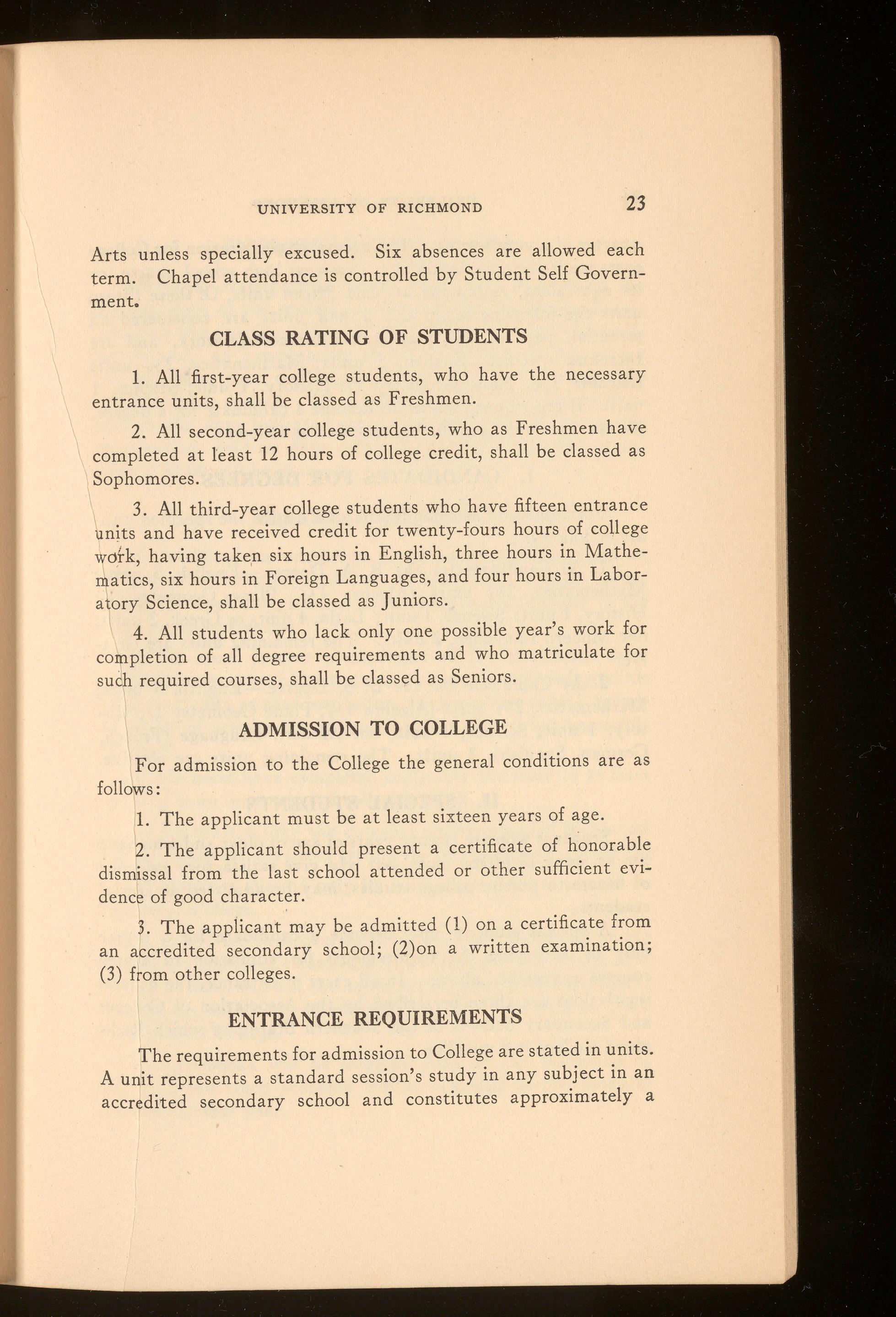
Arts unless specially excused. Six absences are allowed each term. Chapel attendance is controlled by Student Self Government.
1. All first-year college students, who have the necessary entrance units, shall be classed as Freshmen.
2. All second-year college students, who as Freshmen have completed at least 12 hours of college credit, shall be classed as Sophomores.
3. All third-year college students who have fifteen entrance units and have received credit for twenty-fours hours of college woi'k, having taken six hours in English, three hours in Mathematics, six hours in Foreign Languages, and four hours in Laboratory Science, shall be classed as Juniors.
4. All students who lack only one possible year's work for completion of all degree requirements and who matriculate for su& required courses, shall be classed as Seniors.
For admission to the College the general conditions are as follows:
1. The applicant must be at least sixteen years of age.
2. The applicant should present a certificate of honorable dismissal from the last school attended or other sufficient evidence of good character.
3. The applicant may be admitted (1) on a certificate from an accredited secondary school; (2)on a written examination; (3) from other colleges.
The requirements for admission to College are stated in units. A unit represents a standard session's study in any subject in an accredited secondary school and constitutes approximately a
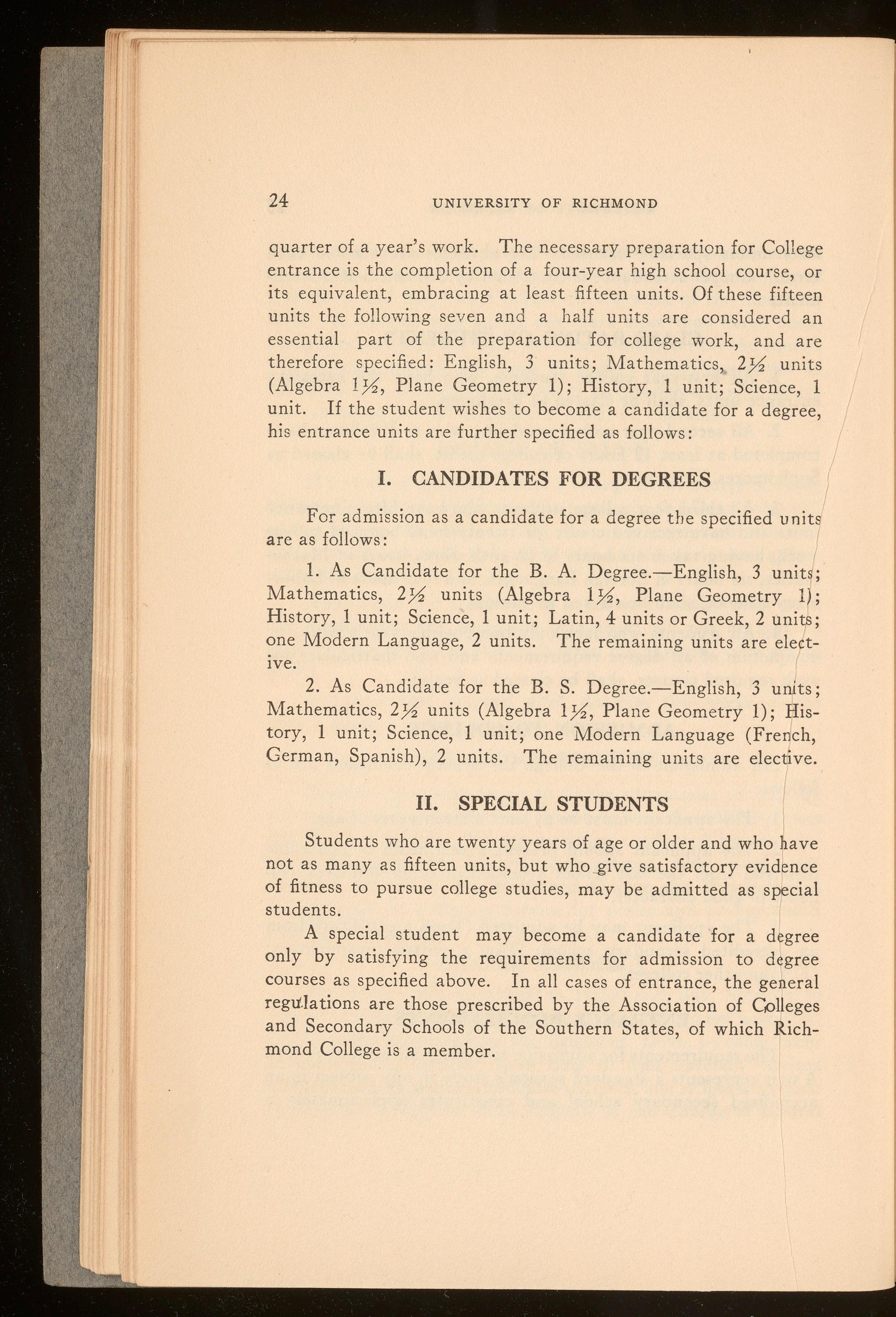
quarter of a year's work. The necessary preparation for College entrance is the completion of a four-year high school course, or its equivalent, embracing at least fifteen units. Of these fifteen units the following seven and a half units are considered an essential part of the preparation for college work, and are therefore specified: English, 3 units; Mathematics, 2 ,½ units (Algebra 1,½, Plane Geometry 1); History, 1 unit; Science, 1 unit. If the student wishes to become a candidate for a degree, his entrance units are further specified as follows:
For admission as a candidate for a degree the specified units are as follows:
1. As Candidate for the B. A. Degree.-English, 3 units; Mathematics, 2,½ units (Algebra 1,½, Plane Geometry 1); History, 1 unit; Science, 1 unit; Latin, 4 units or Greek, 2 uni~; one Modern Language, 2 units. The remaining units are elective.
2. As Candidate for the B. S. Degree.-English, 3 units; Mathematics, 2,½ units (Algebra 1,½, Plane Geometry 1); History, 1 unit; Science, 1 unit; one Modern Language (French, German, Spanish), 2 units. The remaining units are elective.
Students who are twenty years of age or older and who have not as many as fifteen units, but who_give satisfactory evidence of fitness to pursue college studies, may be admitted as special students.
A special student may become a candidate for a degree only by satisfying the requirements for admission to degree courses as specified above. In all cases of entrance, the general regu'.lations are those prescribed by the Association of Colleges and Secondary Schools of the Southern States, of which Richmond College is a member.
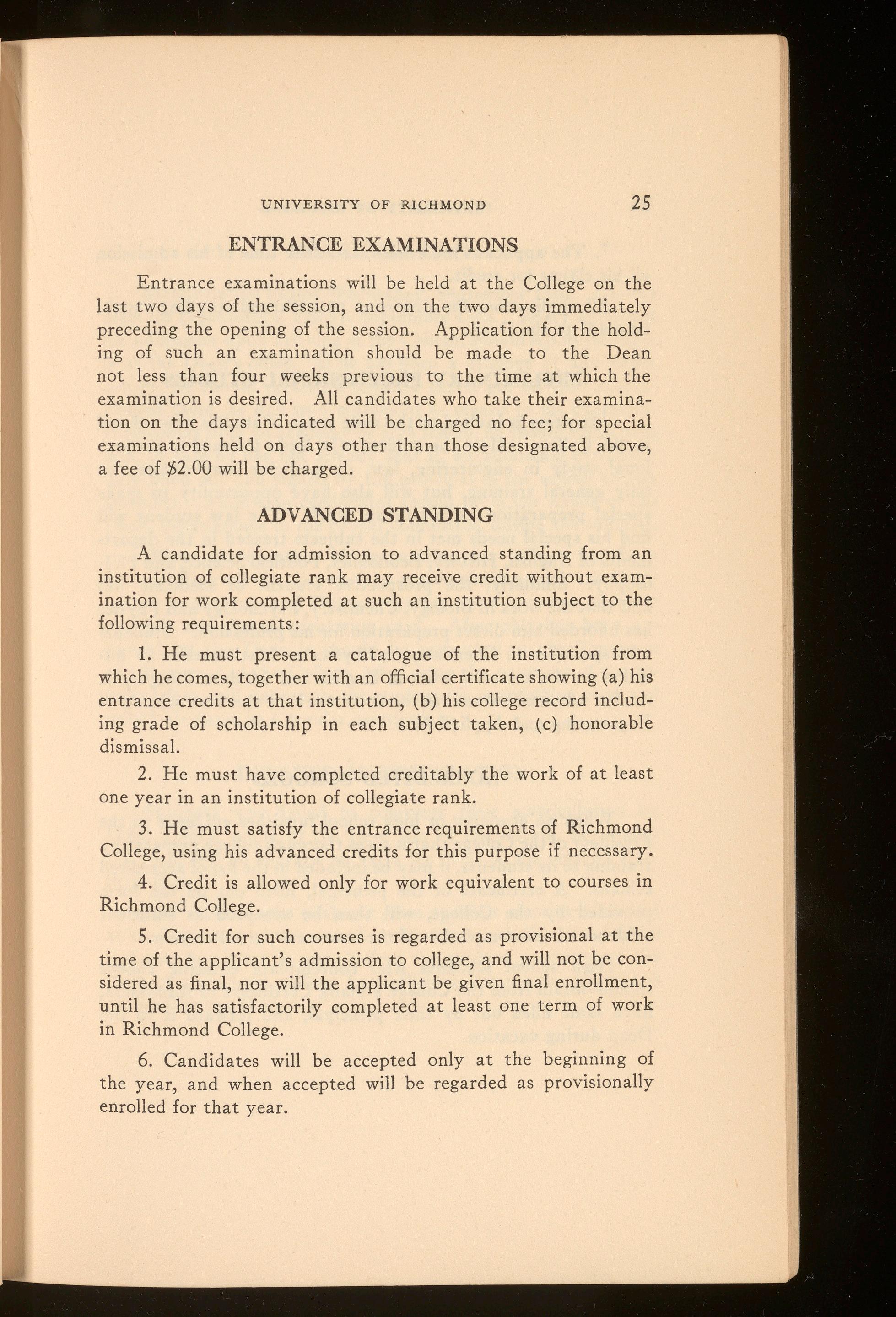
Entrance examinations will be held at the College on the last two days of the session, and on the two days immediately preceding the opening of the session. Application for the holding of such an examination should be made to the Dean not less than four weeks previous to the time at which the examination is desired. All candidates who take their examination on the days indicated will be charged no fee; for special examinations held on days other than those designated above, a fee of iz.OO will be charged.
A candidate for admission to advanced standing from an institution of collegiate rank may receive credit without examination for work completed at such an institution subject to the following requirements:
1. He must present a catalogue of the institution from which he comes, together with an official certificate showing (a) his entrance credits at that institution, (b) his college record including grade of scholarship in each subject taken, (c) honorable dismissal.
2. He must have completed creditably the work of at least one year in an institution of collegiate rank.
3. He must satisfy the entrance requirements of Richmond College, using his advanced credits for this purpose if necessary.
4. Credit is allowed only for work equivalent to courses in Richmond College.
5. Credit for such courses is regarded as provisional at the time of the applicant's admission to college, and will not be considered as final, nor will the applicant be given final enrollment, until he has satisfactorily completed at least one term of work in Richmond College.
6. Candidates will be accepted only at the beginning of the year, and when accepted will be regarded as provisionally enrolled for that year.
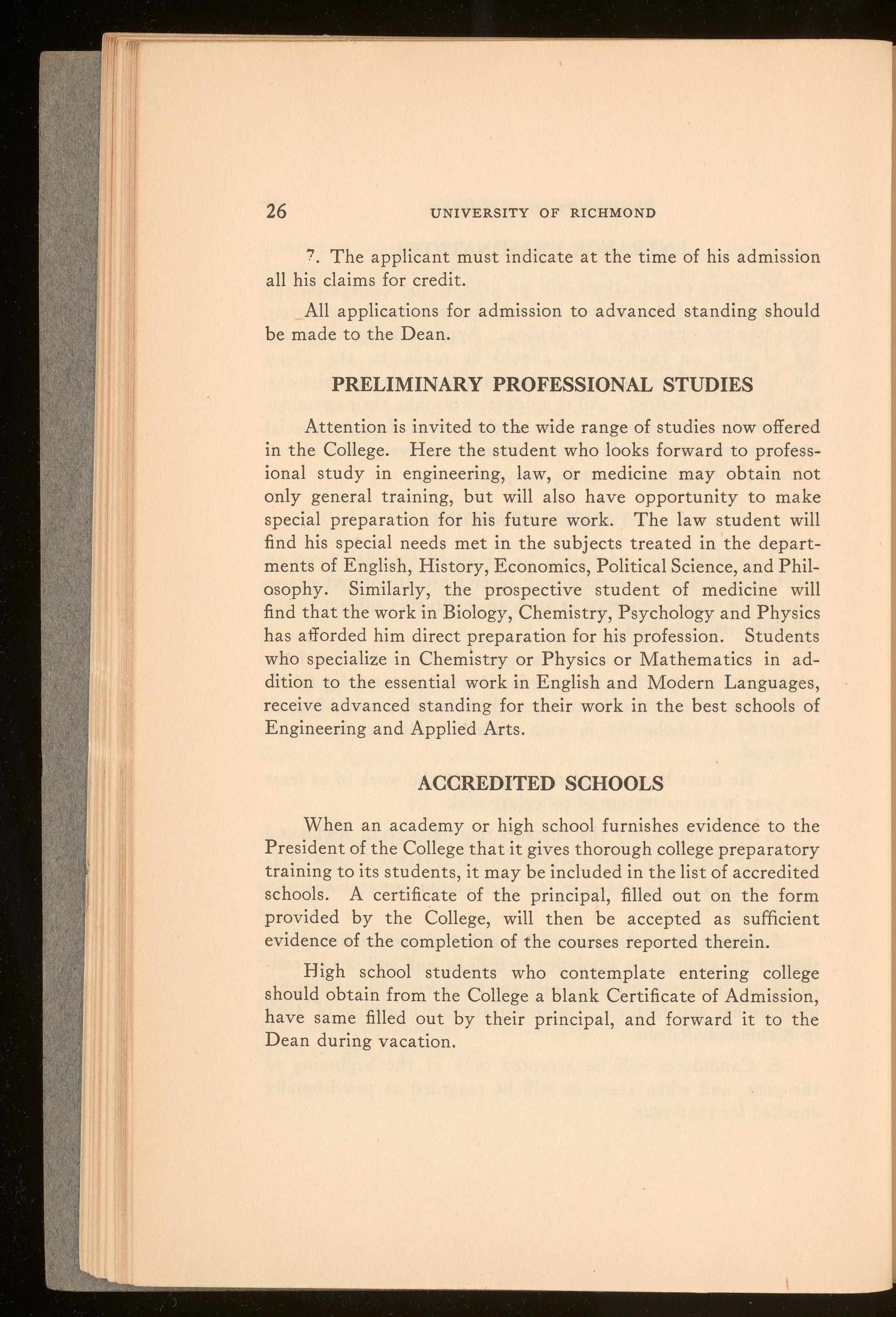
., The applicant must indicate at the time of his admission all his claims for credit.
All applications for admission to advanced standing should be made to the Dean.
Attention is invited to the wide range of studies now offered in the College. Here the student who looks forward to professional study in engineering, law, or medicine may obtain not only general training, but will also have opportunity to make special preparation for his future work. The law student will find his special needs met in the subjects treated in the departments of English, History, Economics, Political Science, and Philosophy. Similarly, the prospective student of medicine will find that the work in Biology, Chemistry, Psychology and Physics has afforded him direct preparation for his profession. Students who specialize in Chemistry or Physics or Mathematics in addition to the essential work in English and Modern Languages, receive advanced standing for their work in the best schools of Engineering and Applied Arts.
When an academy or high school furnishes evidence to the President of the College that it gives thorough college preparatory training to its students, it may be included in the list of accredited schools. A certificate of the principal, filled out on the form provided by the College, will then be accepted as sufficient evidence of the completion of the courses reported therein.
High school students who contemplate entering college should obtain from the College a blank Certificate of Admission, have same filled out by their principal, and forward it to the Dean during vacation.
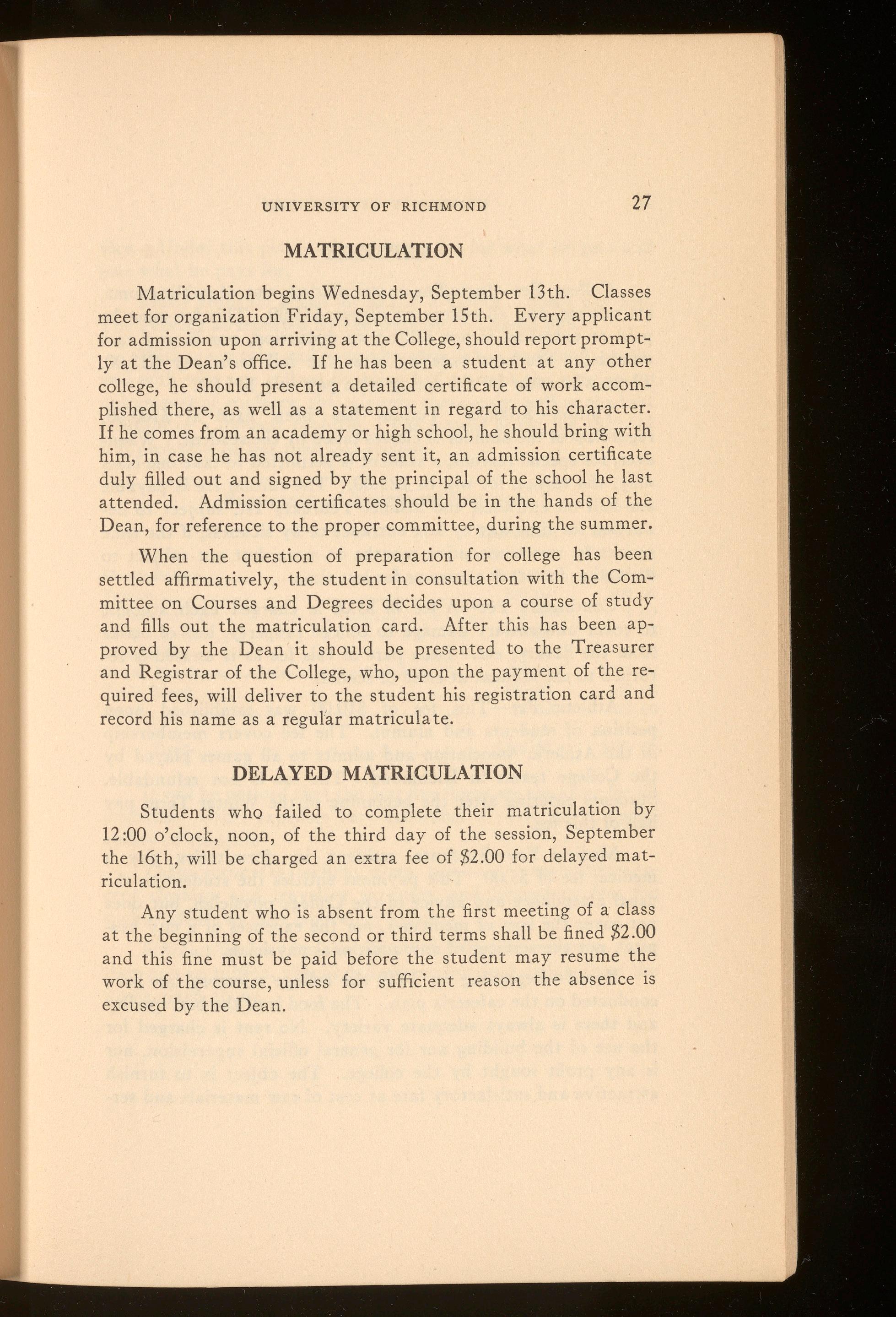
Matriculation begins Wednesday, September 13th. Classes meet for organirntion Friday, September 15th. Every applicant for admission upon arriving at the College, should report promptly at the Dean's office. If he has been a student at any other college, he should present a detailed certificate of work accomplished there, as well as a statement in regard to his character. If he comes from an academy or high school, he should bring with him, in case he has not already sent it, an admission certificate duly filled out and signed by the principal of the school he last attended. Admission certificates should be in the hands of the Dean, for reference to the proper committee, during the summer.
When the question of preparation for college has been settled affirmatively, the student in consultation with the Committee on Courses and Degrees decides upon a course of study and fills out the matriculation card. After this has been approved by the Dean it should be presented to the Treasurer and Registrar of the College, who, upon the payment of the required fees, will deliver to the student his registration card and record his name as a regufar matriculate.
Students who failed to complete their matriculation by 12:00 o'clock, noon, of the third day of the session, September the 16th, will be charged an extra fee of $2.00 for delayed matriculation.
Any student who is absent from the first meeting of a class at the beginning of the second or third terms shall be fined $2.00 and this fine must be paid before the student may resume the work of the course, unless for sufficient reason the absence is excused by the Dean.

College Fee-Including matriculation, use of public rooms, attendance, and all college privileges, $35 00. This fee must be paid at entrance, is not subject to deduction, nor in any case refunded. Students entering after the fall term pay $25.00. Those who enter for the spring term pay only $15.00.
Tuition-$100.00. Tuition has been fixed at $100.00, regardless of the number of classes taken by the student. Whenever, for special reasons, a student is permitted to take one class only, the tuition fee will be $25.00. The tuition fee is payable one-half on entrance, the balance February 1st, subject to deduction for time lost by late entrance or by sickness, if the time so lost be two consecutive months or more, but not subject to deduction for other causes or for less time.
Contingent Fee-A fee of $5.00 is charged each student to cover unnecessary damage to college property, loss of books from the library, etc. Such part of this fee as is unused 1s returned to the student at close of session.
Athletic Fee-This fee of $10.00 was established upon petition of students and alumni. The fee covers membership in the Athletic Association and admits to all games played by the College teams in Richmond. The fee is not refundable. Students entering after the beginning of the Winter Term pay half df this fee.
Medical Fee-Students resident in dormitories pay a medical fee of $5.00 This payment entitles the student to the usual attendance and advice of the College physician, but does not cover the cost of medicines, nor the expenses of a city hospital, nor the services of any additional physician.
Board-Beginning in 1919 the college refectory has been conducted on the cafeteria plan. The food is of the best quality and there is always adequate variety. No rent is charged for the use of the building nor for general official supervision, nor is any profit sought by the college. The object is to furnish attractive and satisfactory fare at cost of raw materials and ser-
vice. Under this plan each student pays for what he gets and get s what he pays for.
Many student s b o ard for $22.50 a month. Some pay $30. The average as reported by the treasurer is around $25.
With uncertain and ever chan ging labor and food prices, and with only one colle ge boardin g hall to meet the varying requirements of students, the cafeteria commends it self as the best solution of a difficult problem. The cost of board for 1922-'23 will probably be less than la st ses sion.

It will be noticed that the first five items ar e the same for all students. Other expenses vary according to ta ste and financial ability of students.
These estimates include every necessary expenditure except clothing and vaveling expenses, and laboratory fees for such students as take laboratory classes.
Scholarship students, or candidates for the · ministry, since they pay no tuition, should deduct one hundred dollars from the totals given above.

The Collegy, Contingent, Medical and Athletic Fees, and one-half of Tuition, are payable at date of entrance. The second half of tuition is payable February 1st.
Diploma Fees-For every Bachelor's Diploma awarded, the charge is $5.00. For a Master's Diploma and Hood the charge is $10.00.
Students who take degrees are required to pay for the Degree Diplomas. No honors are announced at Commencement unless all fees have been satisfactorily settled.
Laboratory Fees-Students who take Chemistry, are required to pay a fee of $10.00 for laboratory expenses; those who take Biology or Physics are required to pay a fee of $7.50. These fees are not refundable.
Students need not keep money about their persons or in their rooms, but may, without expense, deposit it for safe-keeping with an officer of the College. Some students open an account with one of the city banks, and this plan is strongly commended by the College authorities.
Mini sters of the Gospel of all denominations, and young men duly approved by their churches as candidates for the ministry, are admitted free of charge for tuition. They pay matriculation fee, and for fuel, light, board, etc., the same with other students.
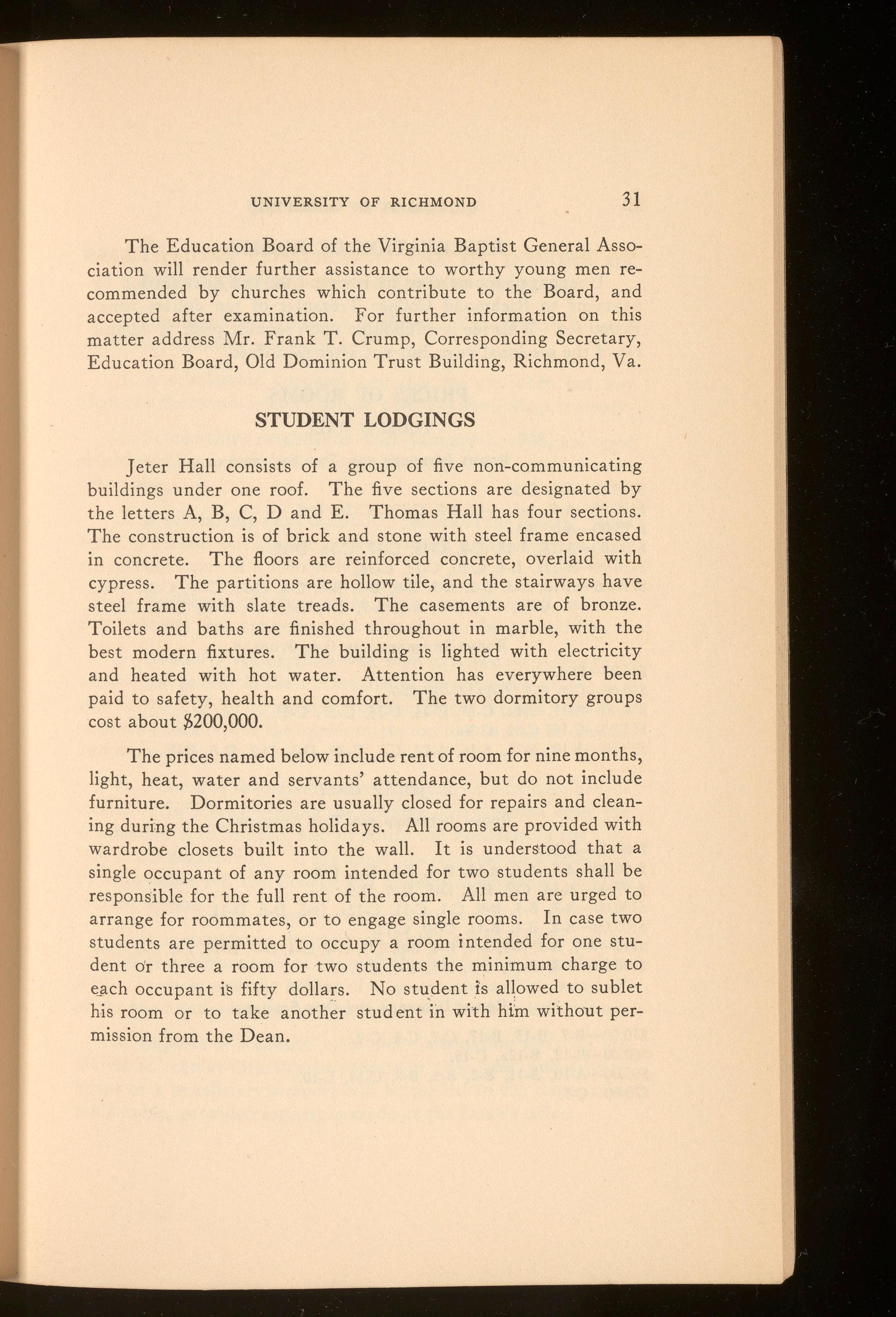
The Education Board of the Virginia Baptist General Association will render further assistance to worthy young men recommended by churches which contribute to the Board, and accepted after examination. For further information on this matter address Mr . Frank T. Crump, Corresponding Secretary, Education Board, Old Dominion Trust Building, Richmond, Va.
Jeter Hall consists of a group of five non-communicating buildings under one roof. The five sections are designated by the letters A, B, C, D and E. Thomas Hall has four sections. The construction is of brick and stone with steel frame encased in concrete. The floors are reinforced concrete, overlaid with cypress. The partitions are hollow tile, and the stairways have steel frame with slate treads. The casements are of bronze. Toilets and baths are finished throughout in marble, with the best modern fixtures. The building is lighted with electricity and heated with hot water. Attention has everywhere been paid to safety, health and comfort. The two dormitory groups cost about $200,000.
The prices named below include rent of room for nine months, light, heat, water and servants' attendance, but do not include furniture. Dormitories are usually closed for repairs and cleaning during the Christmas holidays. All rooms are provided with wardrobe closets built into the wall. It is understood that a single occupant of any room intended for two students shall be respons •ible for the full rent of the room. All men are urged to arrange for roommates, or to engage single rooms. In case two students are permitted to occupy a room intended for one student o'r three a room for two students the minimum charge to e ach occupant is fifty dollars. No stu dent i~ allowed to sublet his room or to take anoth~r student in with him without permission from the Dean.
UNIVERSITY OF RICHMOND
Unengaged rooms may be reserved for the next session by payment to Richmond College Treasurer of ten dollars reservation fee. Thfs fee is refundable upon request prior to August 1st of the sessional year, but not after that date.
RooMs INTENDED FOR Two STUDENTS
$ 80.00-A-1, C-30.
$ 90.00-A-4, A-5, A-9, B-1, C-12a, C-28, D-5.
$ 95.00-A-8, B-5.
$100 00-A-14, A-15, C-4, C-16, C-37, C-38, D-10.
$ll0 .00-A-12a, B-4, C-10, C-22, C-34.
$120.00-A-12, A-3, B-2, B-3, B-6, B-7, B-8, C-8, C-ll, C-17, C-20, c:33 , C-35, D-3, D-8, A-6, A-7, C-5, C-6, C-9, C-18, C-21, C-23.
ROOMS INTENDED FOR ONE STUDENT

$45.00-D-4
$50.00-C-2, C-3, C-12, C-25, D-9
$60.00-A-11, C-14, C-15, C-24, C-26, C-27, C~31.
$65.00-C-f9, C-32, C-36.
$70.00-A-10, A-12, A-16, A-17, C-7, C-29, D-1, D-2, D-6, D-7.
RooMs INTENDED FOR Two STUDENTS
$ 80.00-E-ll.
$ 90.0~A-5, A-6, A-12, D-1, E-1, E-4, E-8.
$ 95.00-B-14, C-7, D-3, D-5, D-8, D-9.
$100.00-A-7, B-3, B-9, C-1, C-ll, C-12a, D-2, D-6, D-11.
$105.00-A-2, B-1, B-ll, C-10, C-12.
$110-A-1, A-3, A-4, A-9, B-4, B-6, C-3, C-4, D-4, D-7, D-10, E-2, E-3, E-9.
$120.00-A-8, B-10, C-6, E-5, E-6, E-7.
ROOMS INTENDED FOR ONE STUDENT
$50.00-B-7, B-15, B-17, C-2, C-8, C-9
$60.00-B-12, B-12a, C-15.
$65.00-A-10, A-ll, B-2, B-5, B-8, C-14, E-10.
~70.00-C-5.

Scholarships established in Richmond College shall be used under the following regulations:
1. A scholarship becomes available for use when not less than two thousand dollars has been paid into the College treasury.
2. Scholarships established since January 1, 1908, are open to either male or female students, unless the donor sp~cifies a sex limitation.
3. A scholarship pays the annual tuition of the holder. This fee is at present one hundred dollars, which is therefore the present annual value of a scholarship.
4. Recipients of scholarships must meet the usual entrance requirements that are demanded of students who pay tuition.
5. Donors of scholarships who wish to nominate students to receive the benefit of their scholarships are informed that it is a rule of the College to make its appointments for one year at a time, and then repeat the appointment as often as may be needful and desirable.
6. Donors of scholarships are requested to nominate beneficiaries by July 1st preceding the opening of the session when the scholarship is to be used, and to notify the President of the College of the nomination. If the donor has reported no nomination by September 1st, the College will appoint a beneficiary for the current session.
7. It is sometimes desirable to divide a scholarship and to appoint two persons each to enjoy the benefits of a minor scholarship. In such case the holder of a minor scholarship pays half of the one hundred dollar tuition fee, or $25 for each half session.
8. Reports of students' class and examination standing are mailed at regular intervals to parents or guardians, and a transcript of a beneficiary's report will be mailed to the donor of a scholarship, provided request is made at the Dean's office.
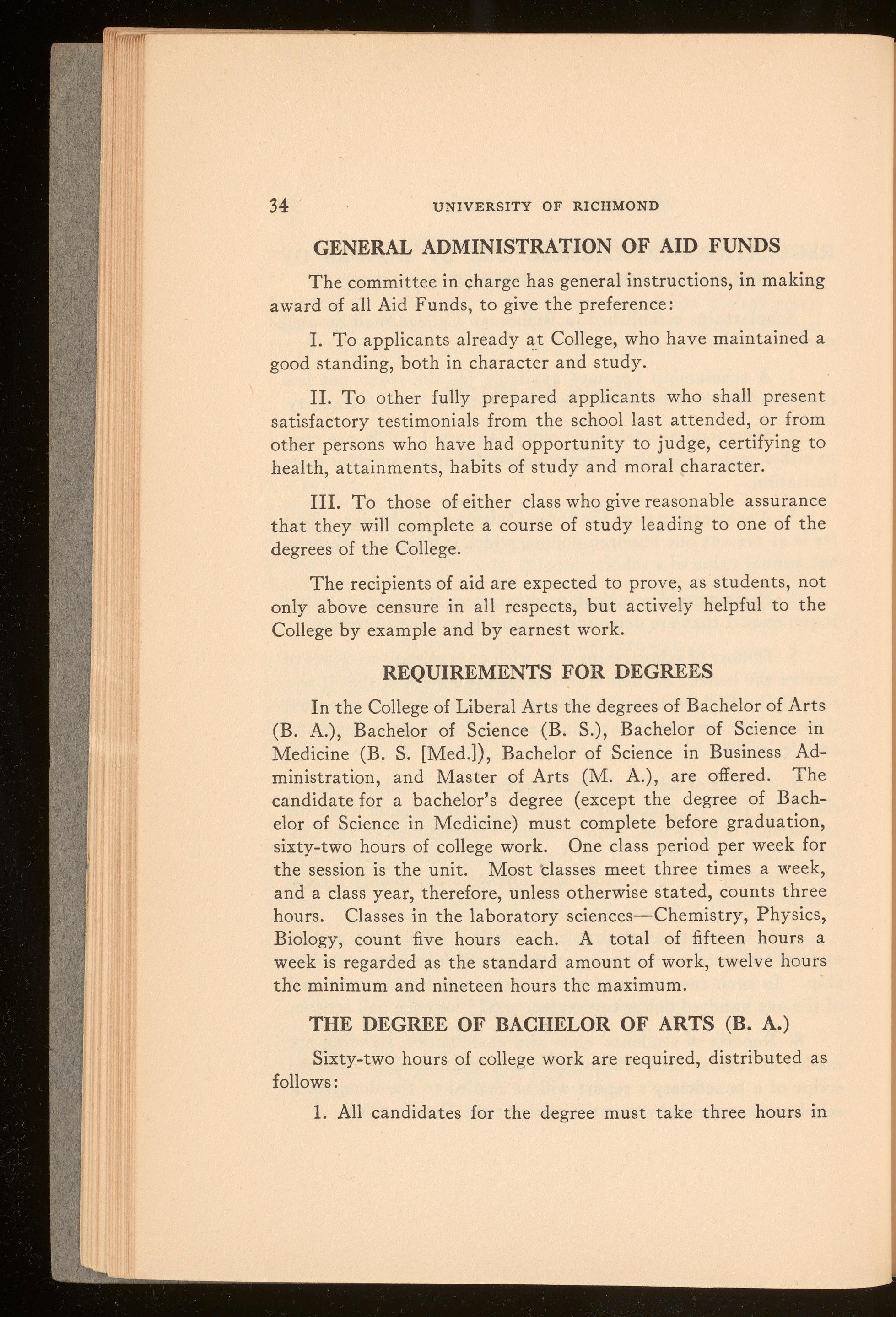
The committee in charge has general instructions, in making award of all Aid Funds, to give the preference:
I. To applicants already <l:tCollege, who have maintained a good standing, both in character and study.
II. To other fully prepared applicants who shall present satisfactory testimonials from the school last attended, or from other persons who have had opportunity to judge, certifying to health, attainments, habits of study and moral character.
III. To those of either class who give reasonable assurance that they will complete a course of study leading to one of the degrees of the College.
The recipients of aid are expected to prove, as students, not only above censure in all respects, but actively helpful to the College by example and by earnest work.
In the College of Liberal Arts the degrees of Bachelor of Arts (B. A.), Bachelor of Science (B. S.), Bachelor of Science in Medicine (B. S. [Med.]), Bachelor of Science in Business Administration, and Master of Arts (M. A.), are offered. The candidate for a bachelor's degree (except the degree of Bachelor of Science in Medicine) must complete before graduation, sixty-two hours of college work. One class period per week for the session is the unit. Most classes meet three times a week, and a class year, therefore, unless otherwise stated, counts three hours. Classes in the laboratory sciences-Chemistry, Physics, Biology, count five hours each. A total of fifteen hours a week is regarded as the standard amount of work, twelve hours the minimum and nineteen hours the maximum.
Sixty-two hours of college work are required, distributed as follows:
1. All candidates for the degree must take three hours in

Latin, or Greek through course 2; six hours in two of the three modern languages, French, Spanish and German; six hours in English; three hours in Philosophy or Education; three hours in History; three hours in Mathematics; five hours in each of two of the sciences, Physics, Chemistry and Biology. A student who takes both Latin and Greek may choose between French, Spanish and German, taking three hours in the one in which his entrance units were offered. It is further required that six of the elective hours must be chosen from the Social Sciences, and six from Foreign Languages, Mathematics and Science.
2. In addition to the specific requirements mentioned above, the student must, before the beginning of his Junior year, choose two major subjects from the following list:
Latin, nine hours; Greek, nine (or twelve) hours; any two of the three modern foreign languages, French, Spanish and German, twelve hours; English, twelve hours; Philosophy and EBucation, nine hours; History and Political Science, nine hours; Mathematics, nine hours; Physics fifteen hours; Chemistry, fifteen hours; Biology, fifteen hours; Business Administration, twelve hours.
3. Students who have attained Junior stan,ding will, as a rule, be required to elect courses which are not intended primarily for Freshmen and Sophomores.
NoTE.-The number of hours required for a Major includes the hours previously specified in that subject.
Sixty-two hours of college work are required, distributed as follows:
1. All candidates for the degree must take nine hours in two of the three modern foreign languages, French, Spanish and German; six hours in English; three hours in Economics or Political Science; six hours in Mathematics; five hours in each of the three sciences, Physics, Chemistry and Biology.
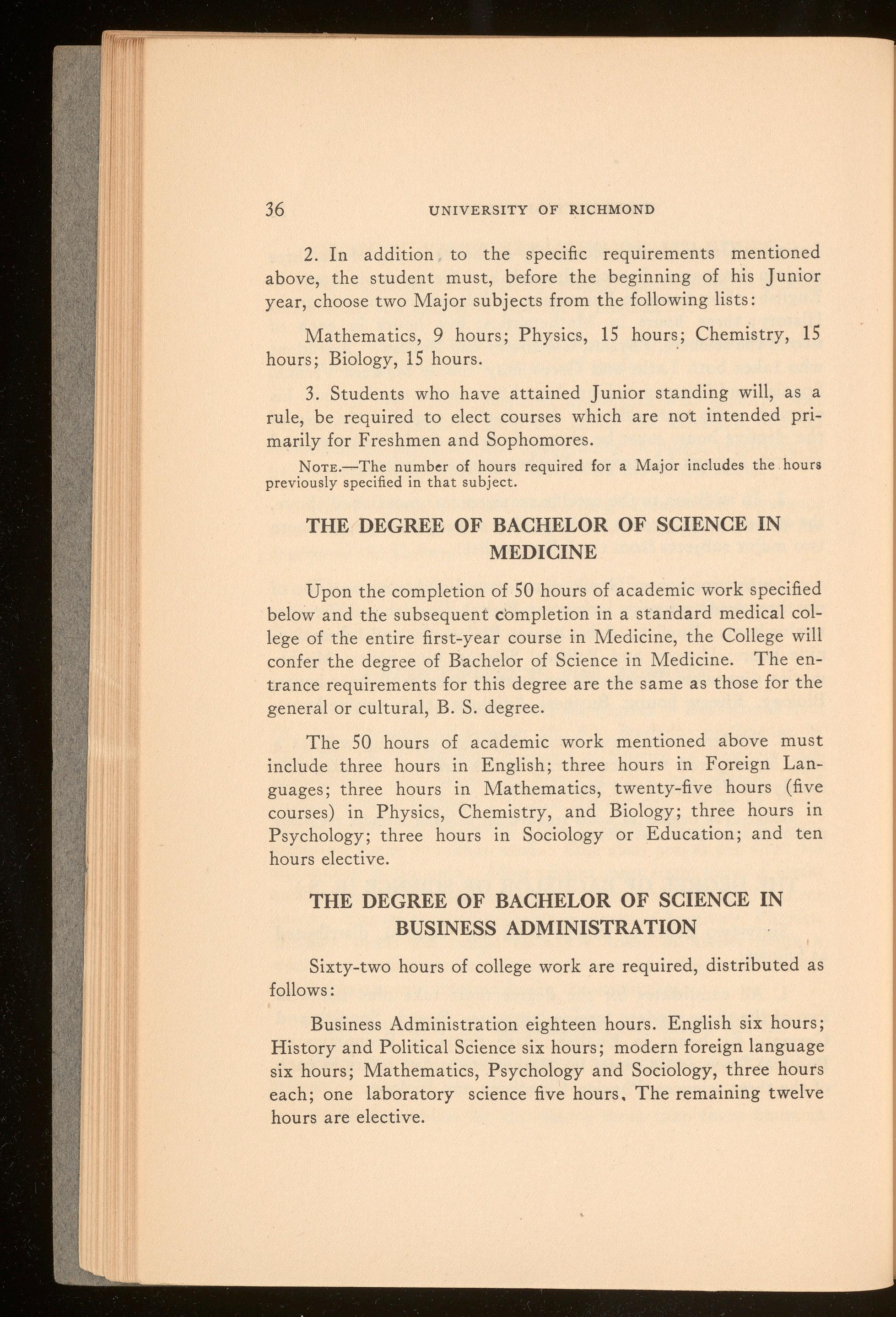
2. In addition to the specific requirements mentioned above, the student must, before the beginning of his Junior year, choose two Major subjects from the following lists: Mathematics, 9 hours; Physics, 15 hours; Chemistry, 15 hours; Biology, 15 hours. ·
3. Students who have attained Junior standing will, as a rule, be required to elect courses which are not intended primarily for Freshmen and Sophomores.
NoTE.-The number of hours required for a Major includes the hours previously specified in that subject.
Upon the completion of 50 hours of academic work specified below and the subsequent cbmpletion in a standard medical college of the entire first-year course in Medicine, the College will confer the degree of Bachelor of Science in Medicine. The entrance requirements for this degree are the same as those for the general or cultural, B. S. degree.
The 50 hours of academic work mentioned above must include three hours in English; three hours in Foreign Languages; three hours in Mathematics, twenty-five hours (five courses) in Physics, Chemistry, and Biology; three hours in Psychology; three hours in Sociology or Education; and ten hours elective.
Sixty-two hours of college work are required, distributed as follows:
Business Administration eighteen hours. English six hours; History and Political Science six hours; modern foreign language six hours; Mathematics, Psychology and Sociology, three hours each; one laboratory science five hours. The remaining twelve hours are elective.

The applicant for the degree of Master of Arts of the University of Richmond must previously have met all requirements for the Bachelor's degree.
He must obtain from the Dean at the beginning of the session in which he expects to take the advanced degree formal approval of his course of study which shall constitute a full year of work, none of which shall have been offered for the Bachelor's degree.
This course must include not less than fifteen hours of work in advanced classes, twelve hours of which must be in a major subject or in cognate subjects. Each advanced course must have been preceded by at least six hours in the same or closely related subjects. All of these courses must be acceptable to the heads of the departments concerned and must be approved by the University Committee on Advanced Degrees, consisting of the Dean and the Chairman of the Committee on Courses and Degrees of Richmond College and the Dean and the Chairman of the Committee on Advanced Standing of Westhampton College.
Each candidate for the Master's degree must submit to the Dean, not later than May 15th a report in the required form covering the work done in his major subject, accompanied by a written statement of approval from the professor under whom the work was done.
The holder of a Bachelor's degree from another institution of learning who enters the University of Richmond as a candidate for the degree of Master of Arts, must first satisfy the Dean that his previous scholastic work is equivalent in amount and quality to that required for the Bachelor's degree in this institution. He will then be accepted as a candidate for the M. A. degree, on the conditions prescribed for graduates of this College.
All reports accepted in partial fulfillment of the requirements for the degree of Master of Arts, must be typewritten on linen paper of good weight and quality, on only one side of the paper. These sheets must be of the standard letter size,

llx8¼ inches, and there must be a margin of not less than one inch on each side and at the top and bottom of the page. The sheets must be securely riveted in a manila cover, the cover being imprinted as the title page.
The completed report, presented for the Master's degree, must be deposited with the Dean not later than May 15th, and must be accompanied by a written statement of approval from the professor under whose direction the work was done. All reports, accepted in partial fulfillment of the requirements for the degree of Master of Arts, shall become the property of the College Library, and shall be kept there for reference uses. A carbon copy shall be presented to the professor who directed the work. A suggested form of title page may be seen on request of the Librarian.
To the parent or guardian is sent, at the end of each of the three terms, a record of the student's class and examination standing, with such other information as may be deemed important. Whenever it may seem desirable more frequent reports are sent. By prompt and judicious attention on the part of those to whom they are addressed, these reports may be made of great value in promoting improvement and sustaining a just discipline.
The standing of students in classes and in examinations is i'ndicated as follows: Students making a passing grade in any study are divided into three groups, designated by the letters A, B, C, respectively. The letter A opposite a student's name indicates that his work for the term including e xamination, has been of excellent quality (95-100%); B, that it has been good (85-94%); C, that it has been of passing grade, (75-84%); D, (65-74%), indicates that his work has been unsatisfactory, and that he is conditioned on the subject for the term. In some subjects the student may remove such condition by good work in the other tw'o terms. Grade E indicates failure.

Besides frequent oral and written tests, there are held in every class three general written examinations at the close of the fall, winter, and spring terms, respectively. All examinations are limited to three hours. Recitations and lectures are suspended during the examination period. The valuation of examination papers is equitably combined with the average of the student's class standing for the term. If this average is of C grade or higher, the student receives credit; if the average is of A or B grade, the student passes with distinction. A condition (D) may be removed by special examination.
All candidates for College honors of any kind are expected to maintain at least the grade of C in their classes. This grade is expected of every student who wishes to appear before the public in a representative capacity.
A student automatically severs his connection with the college if, at the end of any term he has failed to make a minimum grade of C (the lowest passing grade), in at least two full courses.
If a student, who has thus severed his connection with the college, offers to the Dean a written application for reinstatement, giving his reasons for such request, he may be reinstated, on probation only, at the discretion of a committee appointed by the President of the University to consider such case s
Special examinations during the current session may be granted by the Dean upon the written request of the student. A condition may be removed by a special examination at the end of a subsquent term in the current session or in the first ten days of the following session. A student who fails to pass such examination or neglects to take it within this limit must repeat the term's work. A fee of $2 00 is charged for each special examination.

Students who have received the grade of E on any term may not absolve the requ 'irements in this course by a special examination, but must repeat the term's work.
A schedule of special examinations for the removal of conditions will be posted by the Dean on the opening day of the sess10n.

BIBLICAL HISTORY AND LITERATURE
PROFESSOR-----
The aim of these courses is to put the student into possession of a first-hand working knowledge of the Bible, and to create an interest in Biblical and religious study, thus opening the way for a permanent interest in the prosecution of these vital themes. The Bible text is used as the basis for class work and discussion.
I. OLD TESTAMENT HISTORY AND LITERATURE:
(a) History of the Hebrews to the Di'sruption of the Kingdom; the origin of the Hebrews, their relation to other Semitic peoples, their early religious and political institutions; and the character and contents of the historical books.
(b) History of the Hebrews from the Disruption of the Kingdom to the Restoration; the relation of the Hebrews to other nations of the period; and the rise and development of prophecy.
(c) History of the Restoration and subsequent times; the Hebrew Wisdom Literature as seen in Job, Proverbs and Ecclesiastes. The rise, development, and final forms of lyric poetry among the Hebrews, with studies of representative forms.
Three hours a week.
2. NEW TESTAMENT HISTORY AND LITERATURE:
(a) A brief survey of the Persian, Greek, Jewish, and Roman ages; the world into which Jesus came; currents of life and thought; the social, ethical, and religious conditions, and preparations for Christianity.
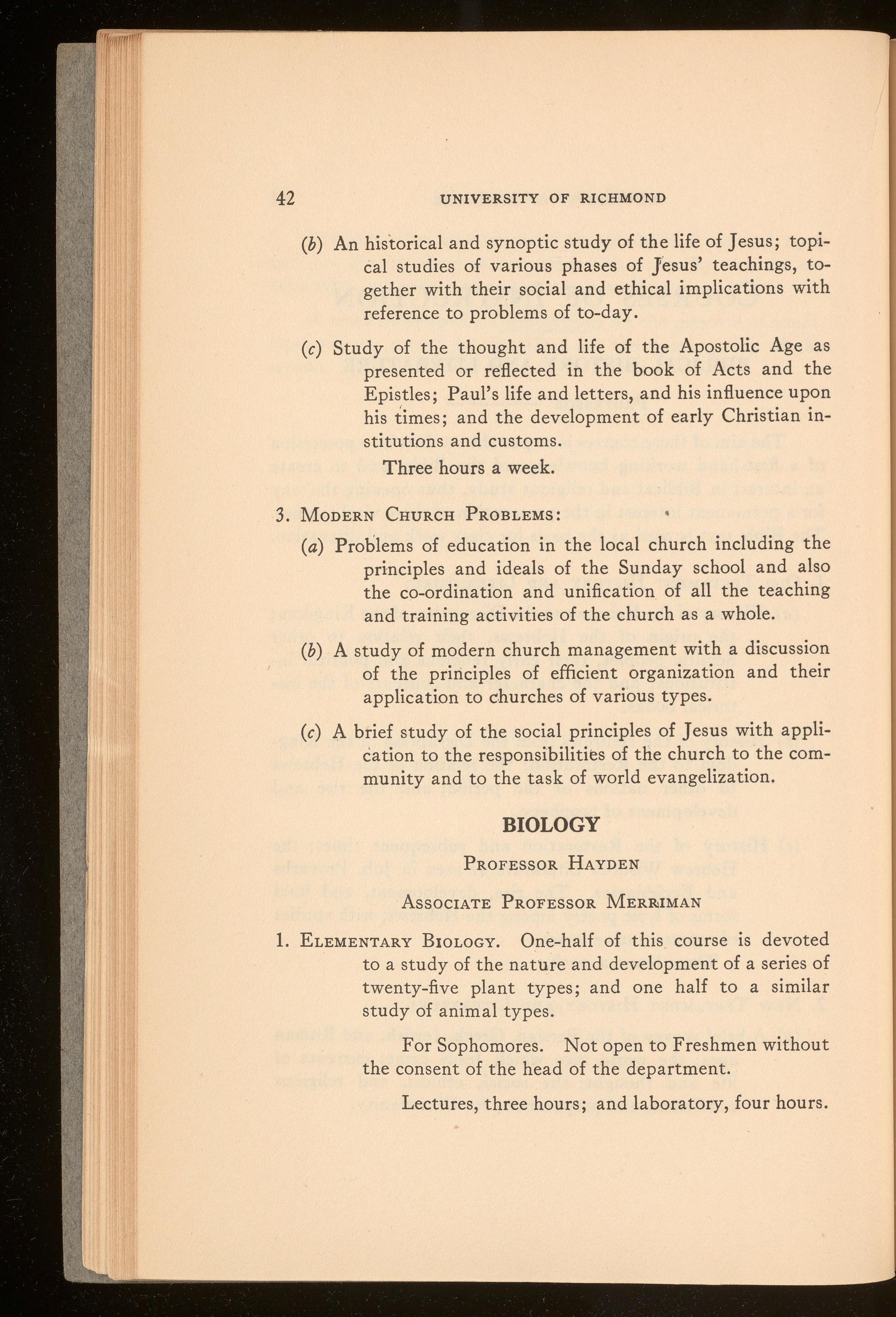
(b) An historical and synoptic study of the life of Jesus; topical studies of various phases of Jesus' teachings, together with their social and ethical implications with reference to problems of to-day.
(c) Study of the thought and life of the Apostolic Age as presented or reflected in the book of Acts and the Epistles; Paul's life and letters, and his influence upon his times; and the development of early Christian institutions and customs.
Three hours a week.
(a) Problems of education in the local church including the principles and ideals of the Sunday school and also the co-ordination and unification of all the teaching and training activities of the church as a whole.
(b) A study of modern church management with a discussion of the principles of efficient organization and their application to churches of various types.
(c) A brief study of the social principles of Jesus with application to the responsibilities of the church to the community and to the task of world evangelization.
PROFESSORHAYDEN
AssocIATE PROFESSORMERR,IMAN
1. ELEMENTARYBIOLOGY. One-half of this . course is devoted to a study of the nature and development of a series of twenty-five plant types; and one half to a similar study of animal types.
For Sophomores. Not open to Freshmen without the consent of the head of the department.
Lectures, three hours; and laboratory, four hours.

2. VERTEBRATEZooLOGY. This course, though open to others is designed primarily for premedical student!s. It is largely a study of the comparative anatomy of vertebrates, though some histology and embryology is 'included. Biology 1, pr~requisite.
Lectures, two hours; laboratory, six hours. For Juniors, or Sophomores, who have taken Biology 1 m their Freshmen year.
3. INVERTEBRATEZooLOGY. This course affords a more detailed study of the animal kingdom than is given in Course 1, largely of forms not studied in that course. Biology 1, prerequisite.
Lectures, three hours; laboratory, four hours. For Juniors and Seniors.
4. ADVANCEDBoTANY. This is a course in the histology and physiology of plants and in suitable seasons will include field botany The text-book for the course is the 1921 edition of Strasburgers Text-Book of Botany.
Biology 1, prerequisite.
Lectures, three hours; laboratory, four hours. For Juniors and Seniors.
5. GENERAL BIOLOGICALPROBLEMS. A lecture course, dealing with the problems and theories of ontogeny, phylogeny, heredity, etc. Prerequisite, two years' work in College Biology.
Lectures, two hours; conference, one hour. For Seniors.
11. RESEARCH CouRsE. Advanced students majoring in Biology, as well as graduate students, may register for this course and will be given work suited to their training and needs.
4-4

UNIVERSITYOF RICHMOND
BUSINESS ADMINISTRATION
PROFESSORBROWN
AssocIATE PROFESSORSEAY
l. BusINESS ORGANIZATIONAND BooKKEEPING. The purposes of this course are (1) to acquaint the student with the ordinary types of business organization and their administrative methods and (2) to provide a thorough grounding in the elements of bookkeeping and office practice. Prerequisite to the courses in Accountancy unless satisfactory credentials, covering the scope of the course, have been presented.
2. PRINCIPALS OF EcoNOMics. This is a basic course in the theory and technique of economics and is required as prerequisite to all courses in this department excepting No. l. The underlying theories of economics are developed by reference to specific conditions. Topics such as the following are discussed: Wealth, Production, Consumption, Value, Price, Rent, Wages, Capital, Interest, Profits. (Not open to first year students.)
3. MONEY, BANKING AND PUBLIC FINANCE. During the first half session a study is made of the monetary and banking systems of the United States with special reference to the National Banking and Federal Reserve Systems. The preparation and analysis of bank statements is required. In addition, the main features of the Canadian Banking System, the Banks :of England, France and Germany are considered.
During the second half session a comprehensive study is made of public finance, including Expenditures, Revenues, and Budgets. Special attention is given to the Income Tax, and to State Taxation.
4. TRANSPORTATION. (2 hours first and second terms). Presents the development of the existing System of Railroad Transportation, the Rules of Rate-Making, and

the Regulations of public agencies. Outlines the problems and methods of Traffic Management.
5. COMMERCIALLAW. (1 hour, Third Term). Covers the Principles of the Law and leading cases in the Law of Contracts with a view to meeting the requirements of business managers and accountants generally.
6. MARKETING AND STORE KEEPING. An intensive course in the marketing of farm products, other raw materials, and manufactured products.
The problem method is used throughout. The student is required to submit a note-book for approval at the close of each term and to prepare at least one special report on the methods employed in distributing a given commodity. Not offered in 1922-23.
7. FIRST YEAR AccouNTANCY. The accepted first-year course in the principles and practice of accountancy. In addition to the development of accounting theory and 0 the solution of class problems, the student is required to submit at least one practice set each term. (Required of Sophomores who are candidates for the degree in Business Administration).
8. SECOND YEAR AccoUNTANCY. Develops the principles and practice of corporation accounting and cost accounting with some examination of the systems of specific industries. Recommended for students considering the field of accountancy or auditing as a profession. Practice sets and special reports required.
9. BusINEss FINANCE AND BusINESS STATISTICS. First and Second Terms: Specific problems in the organization and expansion of business, and the administration of revenue and expense, with special reference to corporations. Note-book required.
Third Term: The principles and methods of statistical analysis and presentation in business research. Practice in the preparation of tables, graphs,

UNIVERSITYOF RICHMOND
and charts and in the use of averages, percentages and index numbers. Not offered in 1922-23.
10. SALES MANAGEMENTAND ADVERTISING. Problem method in sales management and selling practice. Development of the principles and technique of advertising, in its various forms, by use of actual advertising copy and discussion of specific advertising campaigns. Not offered in 1922-23.
PROFESSOR RYLAND
ASSOCIATEPROFESSOR BURRELL
1. GENERAL CHEMISTRY. An introduction to the phenomena, methods, principles, history and practical applications of the science of Chemistry. Prerequisite, High School Physics.
Three hours of class and four hours of laboratory work a week. Credit, five hours.
2. ORGANIC CHEMISTRY. A general introductory course. Prerequisite, Chemistry 1.
Two hours of class and two hours of laboratory work a week. Credit, three hours.
(a) Qualitative Analysis. The course is developed from the modern physical chemistry standpoint, with emphasis on the theoretical basis of analytical methods. Prerequiste, Chemistry 1.
Two hours of class and six hours of laboratory work a week for the first half year. Credit, two and one half hours.
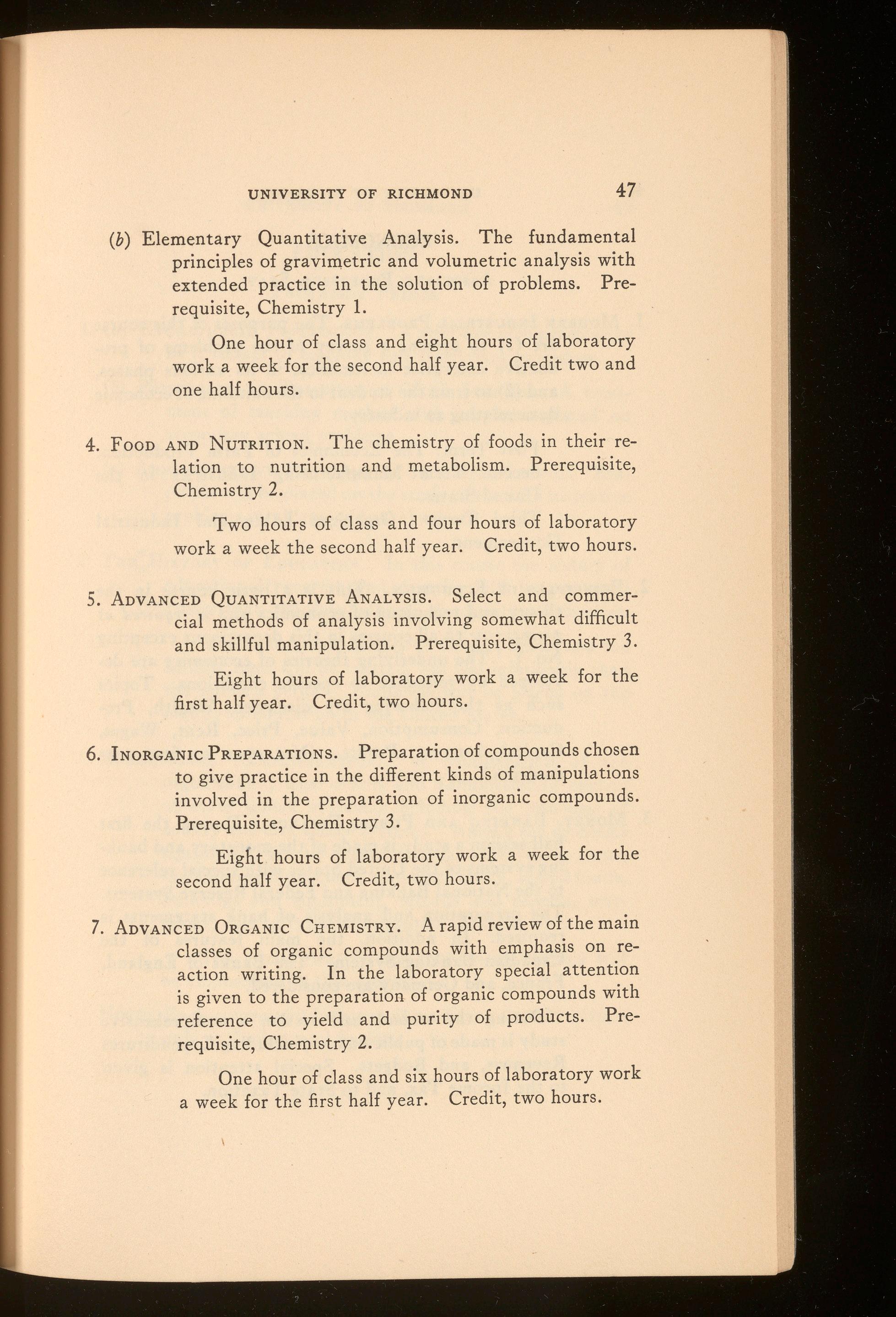
(b) Elementary Quantitative Analysis. The fundamental principles of gravimetric and volumetric analysis with extended practice in the solution of problems. Prerequisite, Chemistry 1.
One hour of class and eight hours of laboratory work a week for the second half year. Credit two and one half hours.
4. FooD AND NUTRITION. The chemistry of foods in their relation to nutrition and metabolism. Prerequisite, Chemistry 2.
Two hours of class and four hours of laboratory work a week the second half year. Credit, two hours.
5. ADVANCEDQUANTITATIVEANALYSIS. Select and commercial methods of analysis involving somewhat difficult and skillful manipulation. Prerequisite, Chemistry 3.
Eight hours of laboratory work a week for the first half year. Credit, two hours.
6. INORGANICPREPARATIONS. Preparation of compounds chosen to give practice in the different kinds of manipulations involved in the preparation of inorganic compounds. Prerequisite, Chemistry 3.
Eight hours of laboratory work a week for the second half year. Credit, two hours.
7. ADVANCEDORGANICCHEMISTRY. A rapid review of the main classes of organic compounds with emphasis on reaction wntmg. In the laboratory special attention is given to the preparation of organic compounds with reference to yield and purity of products. Prerequisite, Chemistry 2.
One hour of class and six hours of laboratory work a week for the first half year. Credit, two hours.
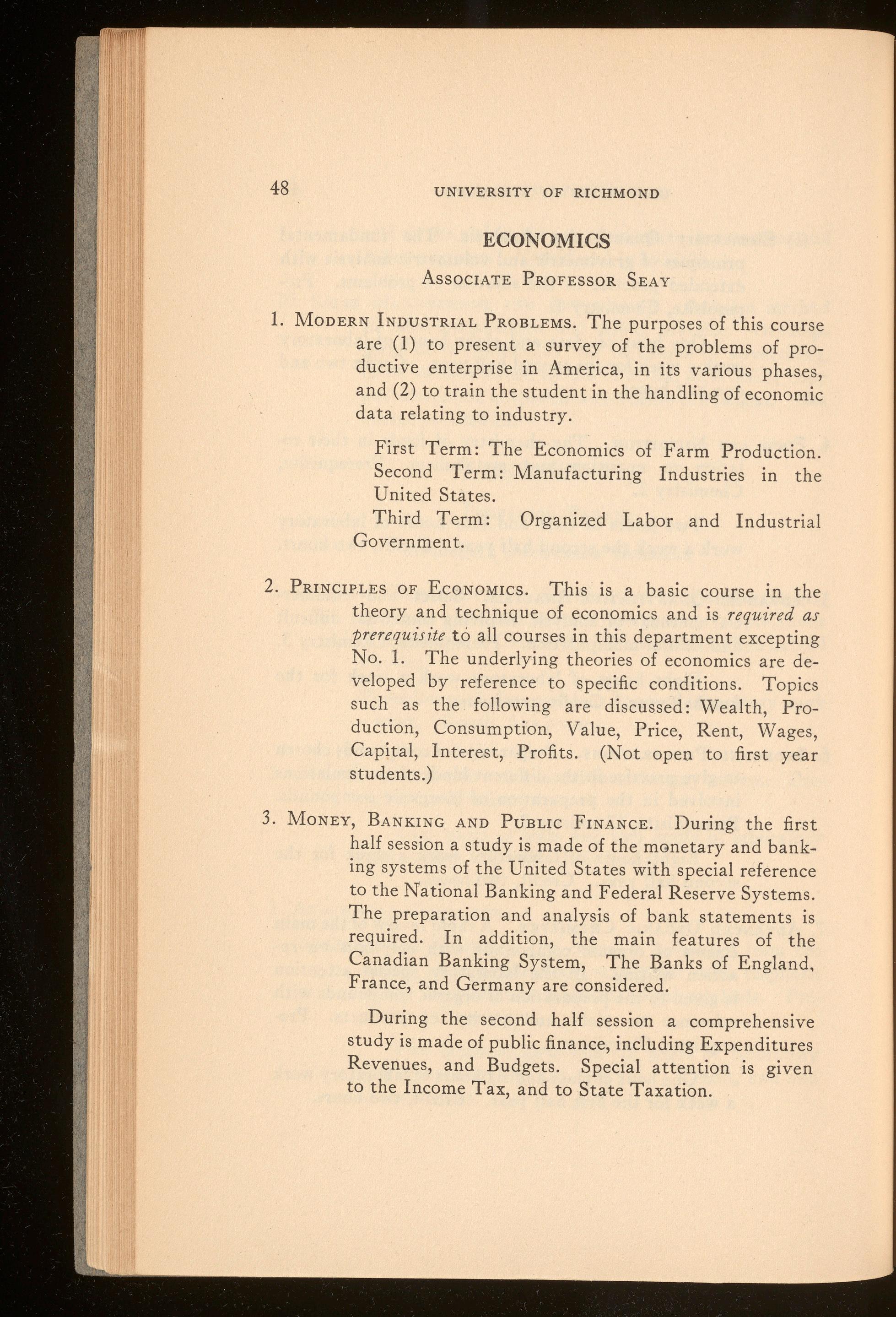
UNIVERSITYOF
ASSOCIATEPROFESSOR SEAY
I. MoDERN INDUSTRIALPROBLEMS.The purposes of this course are (1) to present a survey of the problems of productive enterprise in America, in its various phases, and (2) to train the student in the handling of economic data relating to industry.
First Term: The Economics of Farm Production
Second Term: Manufacturing Industries in the United States.
Third Term: Organized Labor and Industrial Government.
2. PRINCIPLES OF EcoNOMICS. This is a basic course in the theory and technique of economics and is required as prerequisite to all courses in this department excepting No . I. The underlying theories of economics are developed by reference to specific conditions. Topics such as the following are discussed: Wealth, Production, Consumption, Value, Price, Rent, Wages, Capital, Interest, Profits. (Not open to first year students.)
3. MONEY, BANKING AND PUBLIC FINANCE. During the first half session a study is made of the monetary and banking systems of the United States with special reference to the National Banking and Federal Reserve Systems. The preparation and analysis of bank statements is required. In addition, the main features of the Canadian Banking System, The Banks of England, France, and Germany are considered.
During the second half session a comprehensive study is made of public finance, including Expenditures Revenues, and Budgets. Special attention is given to the Income Tax, and to State Taxation.
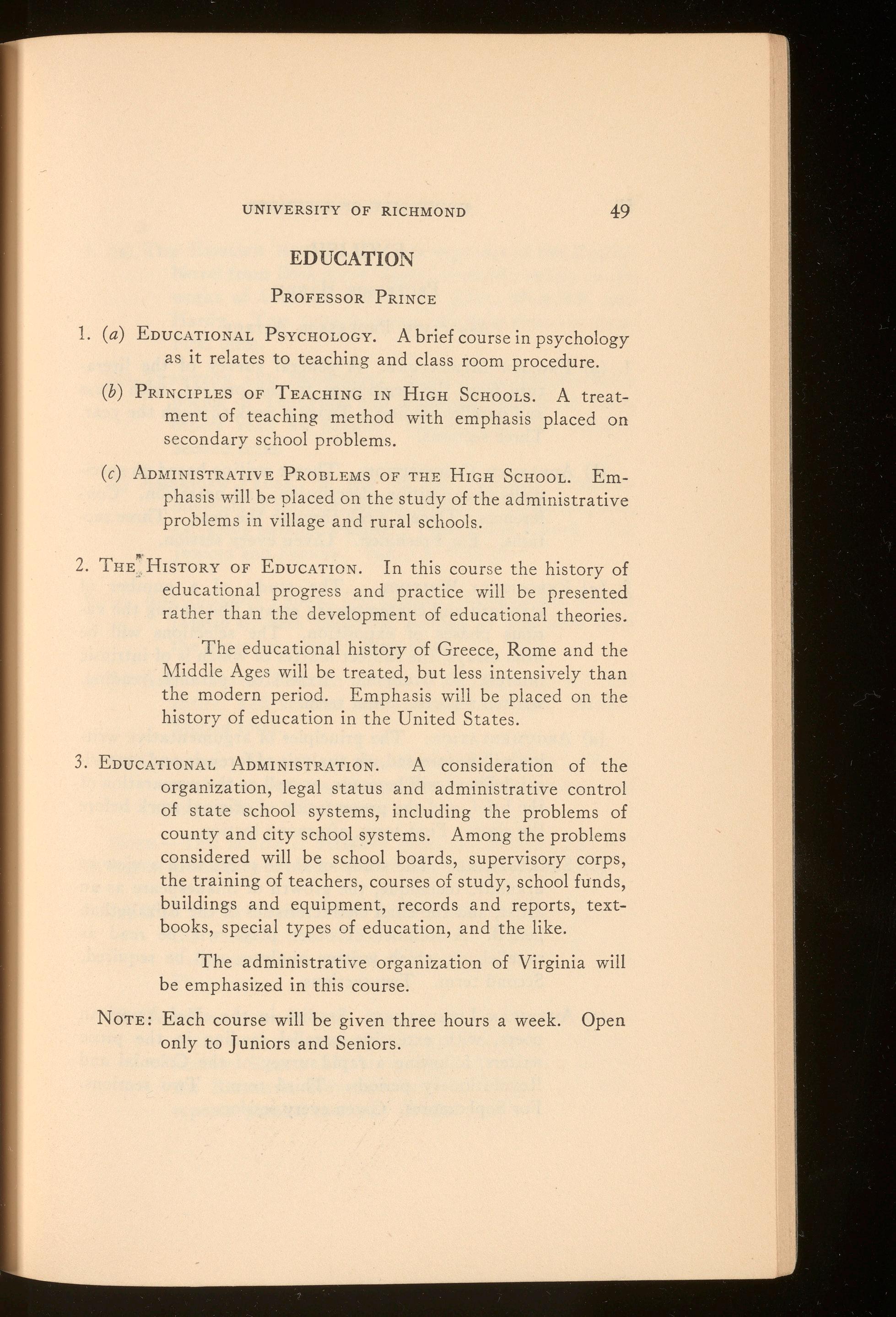
1. (a) EDUCATIONALPSYCHOLOGY. A brief course in psychology as it relates to teaching and class room procedure.
(b) PRINCIPLES OF TEACHING IN HIGH SCHOOLS. A treatment of teaching method with emphasis placed on se condary school problems.
(c) ADMINISTRATIVEPROULEMSOF THE HIGH SCHOOL. Empha sis will b e placed on the study of the administrative problem s in village and rural schools.
2. THE • HISTORY OF EDUCATION. In this cour se the history of educational progr ess and practice will be presented rath er than th e development of educational theories.
The educational history of Greece, Rome and the Middle Ag es will be treated, but less intensively than the modern period. Emphasis will be placed on the history of education in the United States .
3. EDUCATIONAL ADMINISTRATION. A consideration of the organization, legal status and administrative control of state school systems, including the problems of county and city school systems. Among the problems considered will be school boards, supervisory corps, the training of teachers, courses of study, school funds, buildings and equipment, records and reports, textbooks, special types of education, and the like.
The administrative organization of Virginia will be emphasized in this course.
NoTE: Each course will be given three hours a week. Open only to Juniors and Seniors.

PROFESSORHANDY
Assoc1ATE PROFESSOR AsTROP
1. (a) ENGLISH LITERATURE. A general survey of the literature from the beginnings to the present, with class and parallel reading. Twice a week through the year. Three sections.
(b) ADVANCEDCoMPOSITION. Theme writing based on specimens of exposition, description, and narration. Conferences. Once a week through the year. Three sections. For Freshmen. Given every session.
2. (a) EXPOSITORYWRITING. The study of a number of standard and contemporary essays illustrating the various phases of exposition. The selections will be from essays, the subject matter of which is of intrinsic interest to students. Extensive parallel reading, written reports. First term.
(a) ARGUMENTATION. The principles of argumentative writing will be stressed, an analysis of forensic and oratorical delivery will be made, as well as the preparation of the brief, and the presentation of original work before the class. First term, afternoon section.
(b) SHAKESf'EARE. The study of three plays with a view to dramatic technique, the growth of Shakespeare as an artist, and the chief characteristics of the Elizabethan period. A number of other plays will be read as parallel, on which written analyses will be required . Second term. Two sections.
(c) AMERICAN LITERATURE. Studies in the chief American poets, with extensive parallel reading in the prose writers, following a rapid survey of the Colonial and Revolutionary periods. Third term. Two sections. For Sophomores. Given every session.

3. (a) Tim ENGLISH NoVEL. The development of the English Novel from Dickens to Hardy. Parallel reading in the works of Dickens, Thackeray, Eliot, Meredith, and Hardy. Two typical novels will be analyzed in class. First term.
(b) TENNYSON AND BROWNING. poems of Tennyson and others read as parallel. Second term.
Some of the representative Browning studied in class, Lectures; written reports.
(c) AMERICANPROSE. A few of the principal American novelists or essayists will be studied. Written reports; extensive parallel reading. Three t:imes a week. For Juniors and Seniors. Given in 1922-23.
4. (a) ANGLO-SAXONPROSE. Old English Grammar and Reader (Smith's), with collateral reading of selections from the prose literature. First term.
(b) ANGLO-SAXONPoETRY. Beowulf (Wyatt's edition) read entire, and several hundred lines critically studied. Second term.
(c) CHAUCER. Several of the Canterbury Tales will be studied and others, along with the shorter poems, read as parallel. Third term.
N OTE.-This course is designed primarily for students preparrng for graduate work and for those expecting to teach English.
5. (a) THE SHORT STORY. The development and technique of the short story. Wide reading of classic and contemporary short stories, and exercise in story writing. First term.
(b) THE RoMANTIC PoETS. Several of the Romantic poets of the earlier nineteenth century (Wordsworth, Byron, Shelley, Keats) will be studied. The beginnings of the Romantic movement will be traced. Lectures, reports, parallel reading. Second term.
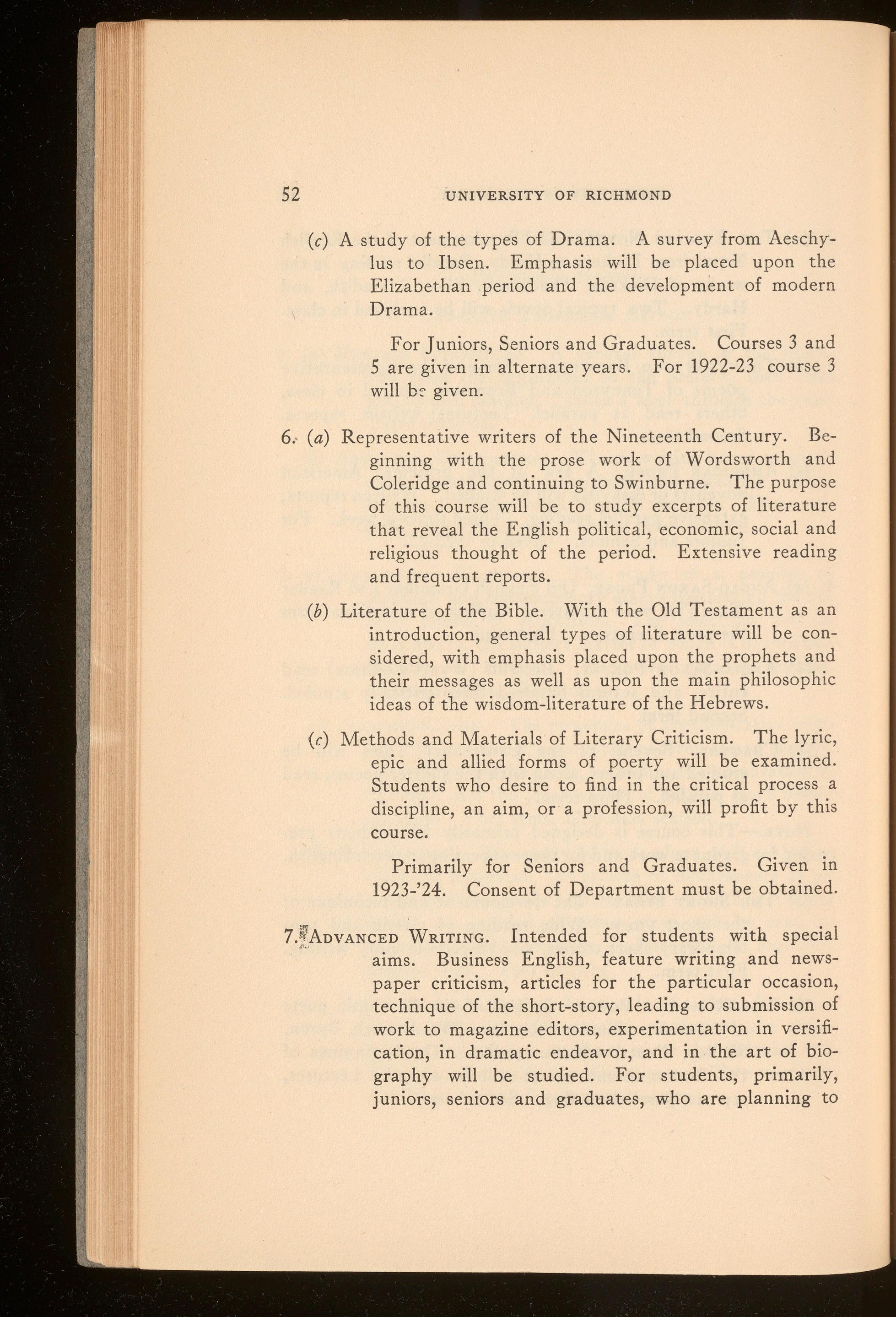
(c) A study of the types of Drama. A survey from Aeschylus to Ibsen. Emphasis will be placed upon the Elizabethan period and the development of modern Drama.
For Juniors, Seniors and Graduates. Courses 3 and 5 are given in alternate years. For 1922-23 course 3 will h given.
6 .- (a) Representative writers of the Nineteenth Century. B eginning with the prose work of Wordsworth and Coleridge and continuing to Swinburne. The purpose of this course will be to study excerpts of literature that reveal the English political, economic, social and religious thought of the period. Extensive reading and frequent reports.
(b) Literature of the Bible. With the Old Testament as an introduction, general types of literature will be considered, with emphasis placed upon the prophets and their messages as well as upon the main philosophic ideas of the wisdom-literature of the Hebrews.
(c) Methods and Materials of Literary Criticism. The lyric , epic and allied forms of poerty will be examined Students who desire to find in the critical process a discipline, an aim, or a profession, will profit by this course.
Primarily for Seniors and Graduates. Given in 1923-'24. Consent of Department must be obtained
7.! AnvANCED WRITING. Intended for students with special aims. Business English, feature writing and newspaper criticism, articles for the particular occasion, technique of the short-story, leading to submission of work to magazine editors, experimentation in versification, in dramatic endeavor, and in the art of biography will be studied. For students, primarily, juniors, seniors and graduates, who are planning to

UNIVERSITYOF RICHMOND 53
make literary work throughout session. Jar course. a profession. One hour a week Frequent consultations. A regu-
8. (a) ENGLISH LIFE AND THOUGHT IN Eic:HTEENTH CENTURY LITERATURE. A survey of literature from 1660 to 1780, emphasizing, (1) changes in national life and manners, (2) the growth of philosophic and political systems, (3) certain characteristic literary forms, such as comedy, the essay and the novel. Fall and winter terms:
(b) Recent American Literature. A consideration of prose, specifically papers of state, recent biography and magazine contribution, as indicative of national temper and development of national ideals. For Seniors and Graduates. Consent of department must be obtained.
9. THE ROMANTICMOVEMENT IN THE NINETEENTH CENTURY. A comparative literature course designed especially for graduates and for students doing work leading to the Master of Arts' degree. A reading knowledge of French and German will be found helpful in the investigations assigned and in the parallel reading necessary. Lectures and frequent reports. Consent of the department must be obtained. Three hours a week every session.
NoTE.-Every student in the department will possess a modern reputable dictionary and will purchase ''The Facts and Backgrounds of Literature."
GERMAN
PROFESSOR MEREDITH
I. A CouRSE FOR BEGINNERS. Elementary Grammar and Composition; special training in pronunci'ation and simple conversational German; reading of simple texts in

class and assigned parallel. For Freshmen. This course may be used to remove entrance conditions and may receive credit only as a second modern language.
2. INTRODUCTIONTo GERMAN LITERATURE. Open to students who have taken Course 1, or its equivalent. It includes a review of German forms, a rriore careful study of syntax, drill in pronunciation, conversational exercises, free reproduction based on texts read, the reading of modern prose and dramatic works in class and as assigned parallel on which reports are made. Introduction to German literature. For Freshmen and Sophomores.
3. ADVANCEDCouRSE. Open to students who have completed Course 2, or its equivalent. Emphasis is placed on the Literature and Realien, rather than the syntax. Literary periods and movements are studied. A great deal of reading is assigned, on which regular reports are made. So far as feasible, this course will be conducted in German.
The work of the year will gather about (a) An Introduction to the Classic Period, (b) Mid-Century Novelists, (c) German Literature since the founding of the Empire.
1. FoR BEGINNERS. This class begins with the alphabet, and is occupied in securing a thorough knowledge of forms, a working vocabulary, and the fundamental points of syntax. From the beginning of the course exactness will be insisted upon. To enter this course some knowledge of Latin is prerequisite. This course may be used to remove entrance conditions. Three hours a week.

2. XENOPHON. This class will read the Cyropaedia, from which selections will be taken, and will take up such other author as the needs of the class may indicate. Special attention will be paid to forms and the inflections. There will be weekly exercises in grammar and compos1t1on. As the student advances, translation at sight will be emphasized. For Freshmen and Sophomores. Three hours a week.
3. (a) PLATO, (b) LYSIAS. This class will be subject to change as the needs of the students may indicate. Half of the year is devoted to Plato and the other half to Lysias. There will be weekly exercises in composition throughout the year. Work will be assigned for private reading on which the student will be examined. As opportunity offers there will be conferences on Greek life, mythology, history, literature and art. At all times an effort will be made to lead the student into a keener appreciation of the genius of the Greeks, and to cultivate a sense for their literary standards. For Sophomores and Juniors. Three hours a week.
4. (a) THUCYDIDES, (b) DEMOSTHENES, (c) THE DRAMA. In this class the work will center around Thucydides, Demosthenes, and the Drama. Work will also be assigned for private reading, and English will be put into Greek, either as a set exercise or at dictation. This course will be made as general a s i s consistent with thoroughness. There will be le ctures on literature, grammar and rhetoric . For Juniors and Seniors. Three hours a week.
PROFESSOR MITCHELL AND DR. LOUGH
1. GENEIRALEUROPEAN HISTORY. In this course a broad survey of the history of Europe from the disintegration of the Roman Empire to the present time will be
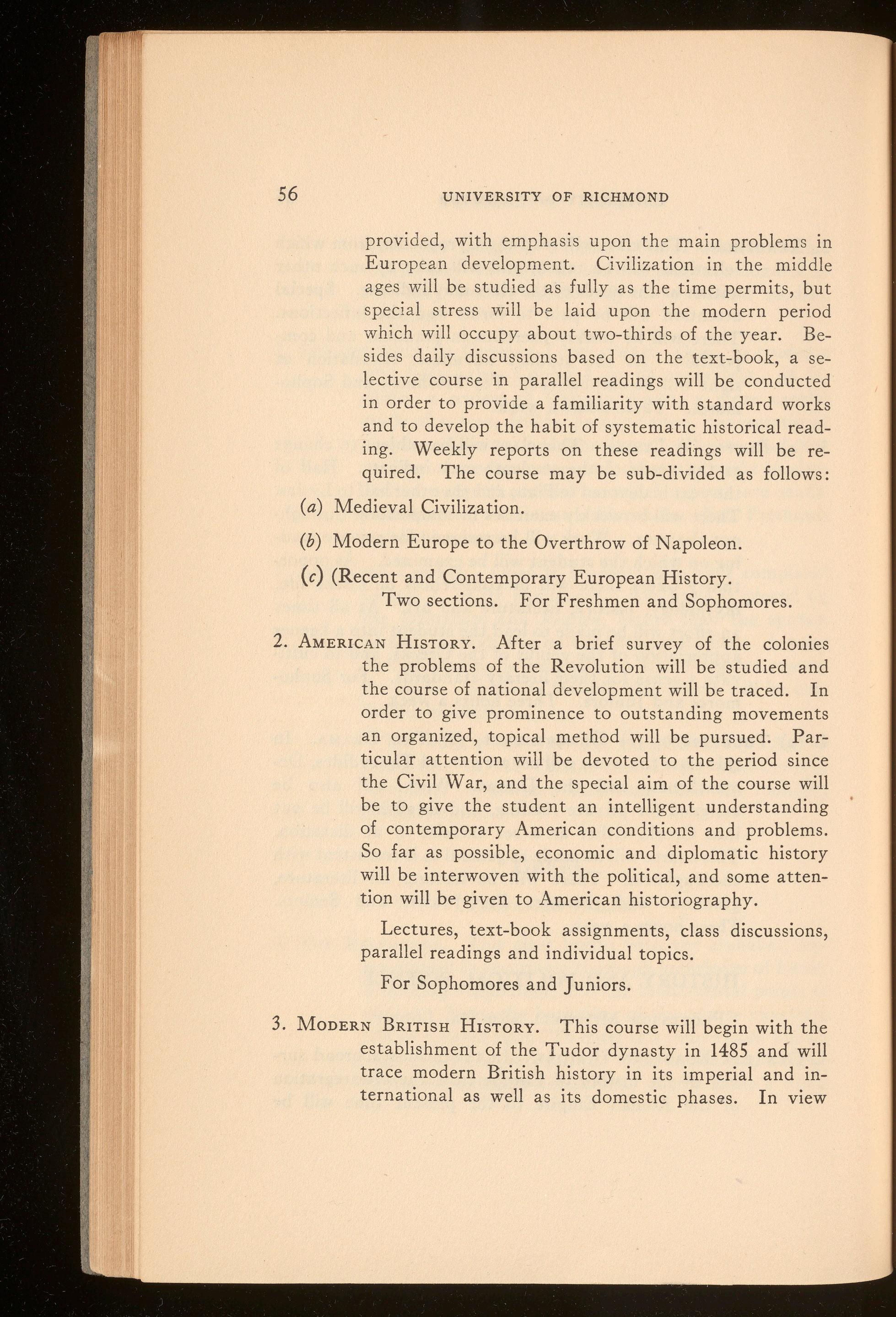
provi de d, with em p ha sis upon th e main probl e m s in Eur opea n dev elopm e nt. Ci v iliz ation in th e middle a ges will be stud i ed a s fully as the time permit s, but sp e cia l stress will b e laid upon the modern period which will occupy about two - third s of the year. Besid es daily discussion s based on th e text-book, a sel ective course in parallel readings will be conducted in order to provide a familiarity with standard works and to develop the habit of systematic historical reading. Weekly reports on these readings will be required. The course may be sub-divided as follows:
(a) Medieval Civilization.
(b) Modern Europe to the Overthrow of Napoleon.
(c) (Recent and Contemporary European History. Two sections. For Freshmen and Sophomores.
2. AMERICANHISTORY. After a brief survey of the colonies the problems of the Revolution will be studied and the course of national development will be traced. In order to give prominence to outstanding movements an organized, topical method will be pursued. Particular attention will be devoted to the period since the Civil War, and the spec i al aim of the course will be to give the student an intelligent understanding of contemporary American conditions and problems. So far as possible, economic and diplomatic history will be interwoven with the political, and some attention will be given to American historiography.
Lectures, text-book assignments, class discussions, parallel readings and individual topics.
For Sophomores and Juniors.
3. MODERN BRITISH HISTORY. This course will begin with the establishment of the Tudor dynasty in 1485 and will trace modern British history in its imperial and international as well as its domestic phasas. In view
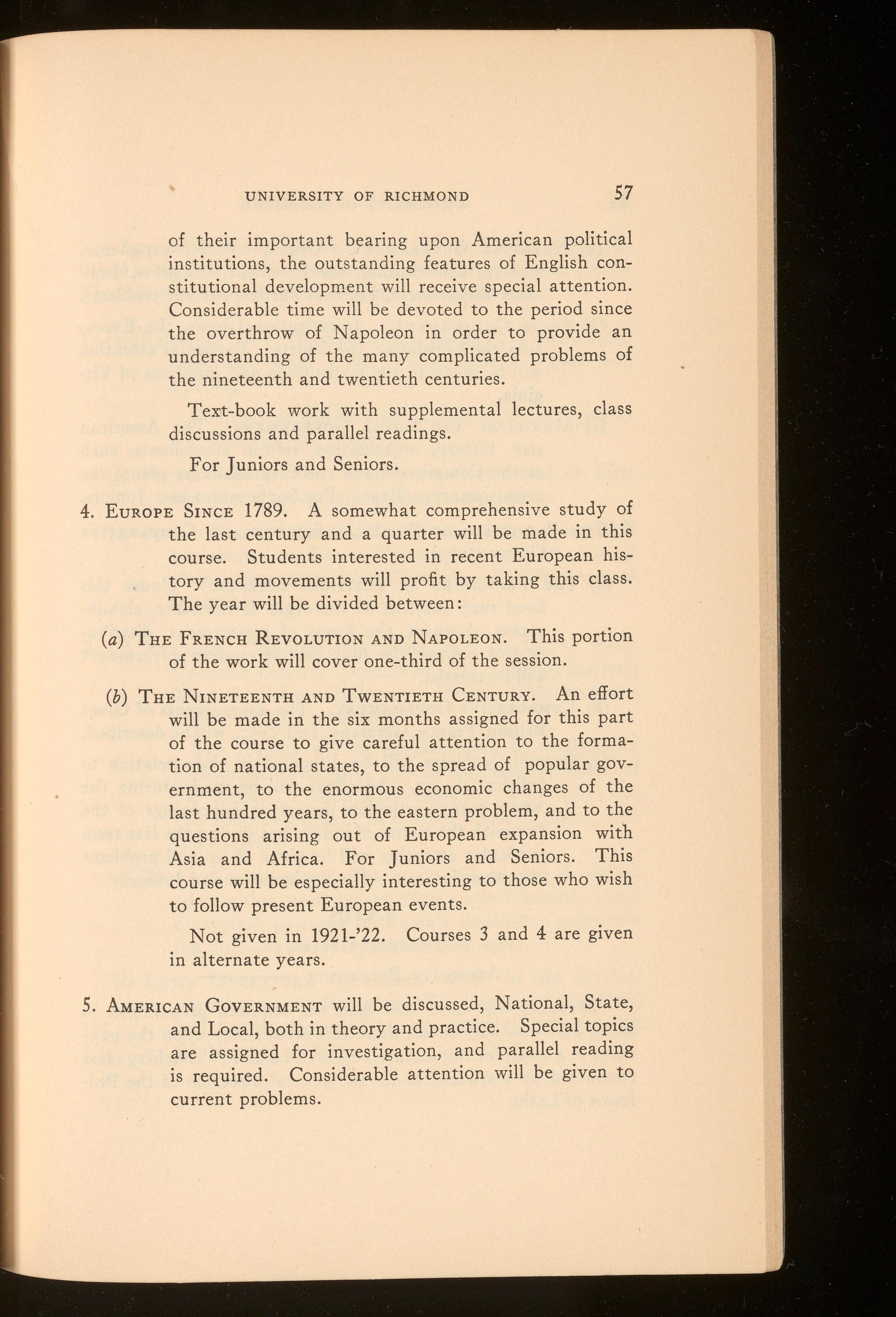
of their important bearing upon American political institutions, the outstanding features of English constitutional development will receive special attention. Considerable time will be devoted to the period since the overthrow of Napoleon in order to provide an understanding of the many complicated problems of the nineteenth and twentieth centuries.
Text-book work with supplemental lectures, class discussions and parallel readings.
For Juniors and Seniors.
4. EUROPE SINCE 1789. A somewhat comprehensive study of the last century and a quarter will be made in this course. Students interested in recent European history and movements will profit by taking this class. The year will be divided between:
(a) THE FRENCH REVOLUTIONANDNAPOLEON. This portion of the work will cover one-third of the session.
(b) THE NINETEENTH AND TWENTIETH CENTURY. An effort will be made in the six months assigned for this part of the course to give careful attention to the formation of national states, to the spread of popular government, to the enormous economic changes of the last hundred years, to the eastern problem, and to the questions arising out of European expansion with Asia and Africa. For Juniors and Seniors. This course will be especially interesting to those who wish to follow present European events.
Not given in 1921-'22. Courses 3 and 4 are given in alternate years.
5. AMERICANGOVERNMENTwill be discussed, National, State, and Local, both in theory and practice. Special topics are assigned for investigation, and parallel reading is required. Considerable attention will be given to current problems.
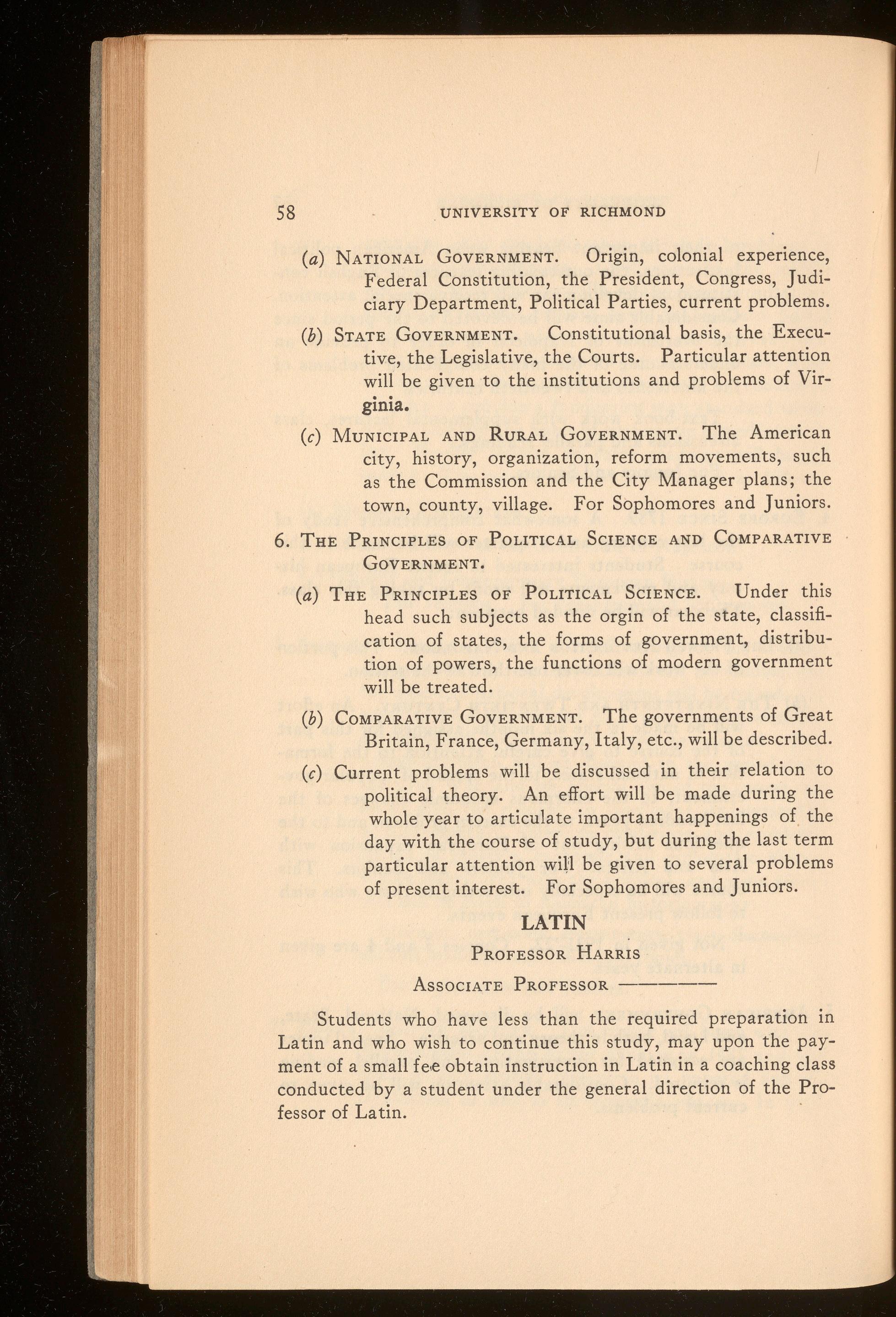
(a) NATIONAL GovERNMENT. Origin, colonial experience, Federal Constitution, the President, Congress, Judiciary Department, Political Parties, current problems.
(b) STATE GOVERNMENT. Constitutional basis, the Executive, the Legislative, the Courts. Particular attention will be given to the institutions and problems of Virginia.
(c) MUNICIPAL AND RURAL GovERNMENT. The American city, history, organization, reform movements, such as the Commission and the City Manager plans; the town, county, village. For Sophomores and Juniors.
6. THE PRINCIPLES OF POLITICAL SCIENCE AND COMPARATIVE GOVERNMENT.
(a) THE PRINCIPLES OF PoLITICAL SCIENCE. Under this head such subjects as the orgin of the state, classification of states, the forms of government, distribution of powers, the functions of modern government will be treated.
(b) COMPARATIVEGovERNMENT. The governments of Great Britain, France, Germany, Italy, etc., will be described.
(c) Current problems will be discussed in their relation to political theory. An effort will be made during the whole year to articulate important happenings of the day with the course of study, but during the last term particular attention wiU be given to several problems of present interest. For Sophomores and Juniors.
PROFESSORHARRIS ASSOCIATEPROFESSOR
Students who have less than the required preparation in Latin and who wish to continue this study, may upon the payment of a small fe,e obtain instruction in Latin in a coaching class conducted by a student under the general direction of the Professor of La tin.

Four units of the standard entrance requirements as published in the catalogue are required for entrance to the first course. The following courses are offered in the department:
1. (a) l READING. Livy (Selections from Books I., II. and XXL); Selections from Lyric Poets; Horace (Odes and Epodes).
Conferences will be held on Roman Historiography and Roman Lyric Poetry.
(b) PROSE COMPOSITION. Weekly exercises, based on Livy and Cicero; occasional original compositions.
(c) RoMAN PRIVATE LIFE. Text-book work, accompanied by lectures on Roman Private Life as illustrated by Roman literature and archaeology. For Freshmen or Sophomores.
2. (a) READING. Tacitus (Germania and Agricola); Pliny (Selected Letters); Juvenal or Horace (Select Satires); Martial (Select Epigrams); Plautus (Menaechmi); Terence (Self-Tormentor)
The reading will be supplemented by lectures on Roman Historiography during the classical period of the Empire, Roman Epistolography, Biography, the rise and development of Roman Comedy, Satire, and the Epigram.
(bf PROSE CoMPOSITION. The work will consist of orginal - co mposition, and the translation into Idiomatic Latin of typical passages of English literature, representing different subjects and different styles.
(c) LATIN LITERATURE. A general survey of the classical literature of the Romanc e . The study of a text-book will be supplemented by appropriate lectures. For Sophomores or Juniors.
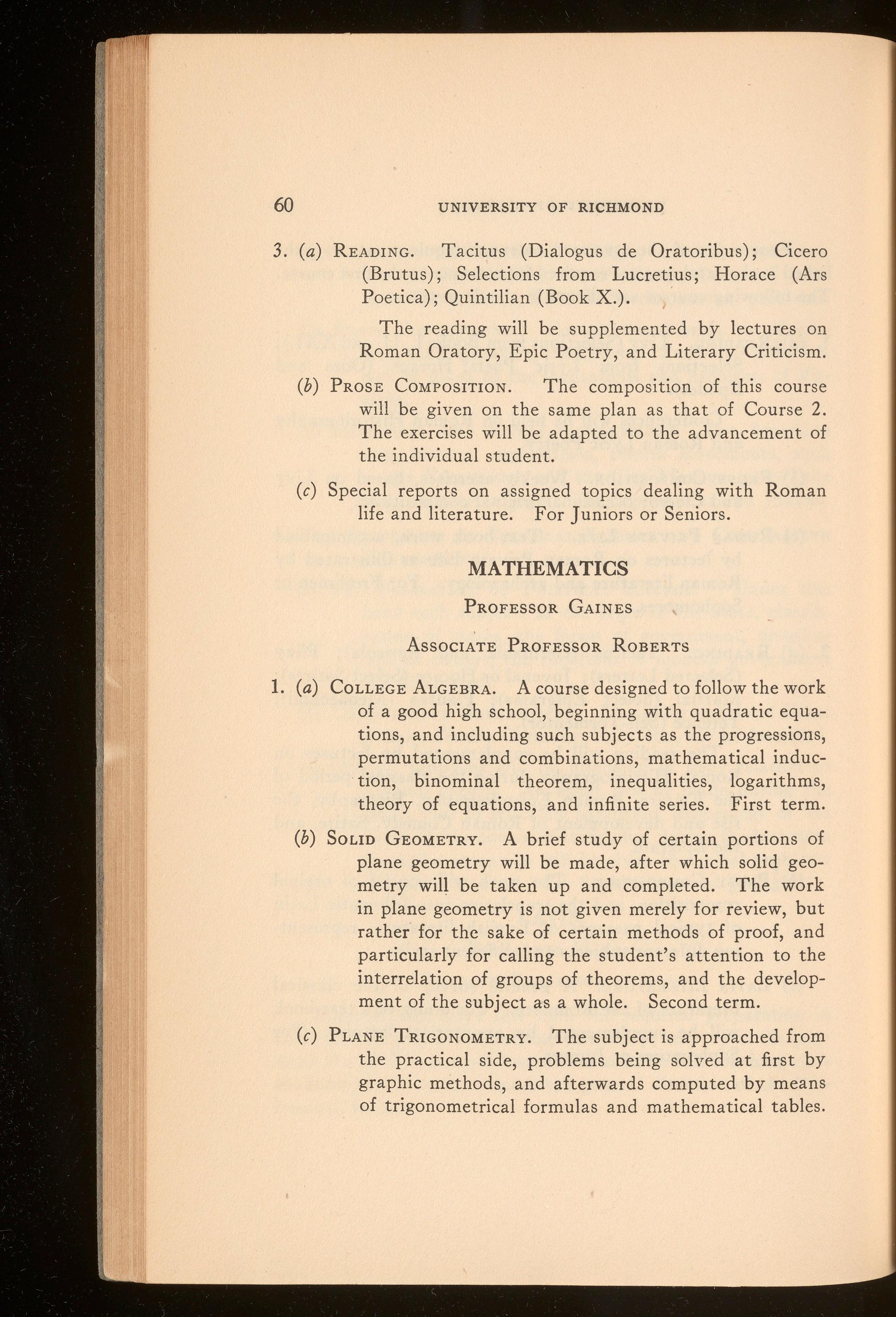
3. (a) READING. Tacitus (Dialogus de Oratoribus); Cicero (Brutus); Selections from Lucretius; Horace (Ars Poetica); Quintilian (Book X.). ·
The reading will be supplemented by lectures on Roman Oratory, Epic Poetry, and Literary Criticism.
(b) PROSE COMPOSITION. The composition of this course will be given on the same plan as that of Course 2. The exercises will be adapted to the advancement of the individual student.
(c) Special reports on assigned topics dealing with Roman life and literature. For Juniors or Seniors.
PROFESSOR GAINES
AssocIATE PROFESSOR RoBERTS
1. (a) CoLLEGE ALGEBRA. A course designed to follow the work of a good high school, beginning with quadratic equations, and including such subjects as the progressions, permutations and combinations, mathematical induction, binominal theorem, inequalities, logarithms, theory of equations, and infinite series. First term.
(b) SoLID GEOMETRY. A brief study of certain portions of plane geometry will be made, after which solid geometry will be taken up and completed. The work in plane geometry is not given merely for review, but rather for the sake of certain methods of proof, and particularly for calling the student's attention to the interrelation of groups of theorems, and the development of the subject as a whole. Second term.
(c) PLANE TRIGONOMETRY. The subject is approached from the practical side, problems being solved at first by graphic methods, and afterwards computed by means of trigonometrical formulas and mathematical tables.

After the interest of the student is thus secured, the remainder of the time is devoted to the development of analytical trigonometry. Third term.
(d) COLLEGE ALGEBRA. A course which follows (a), and includes a more extended study of theory of equations, logarithms, indeterminate forms, partial fractions, and determinants. Third term. (a), and two of (b), (c), and (d) are required of all Freshmen. Three hours a week.
2. (af ANALYTICALGEOMETRY. Elementary course. Systems of co-ordinates with various illustrations of the use of graphical methods, the construction and discussion of loci, a detailed study of the straight line and circle, and of the simpler properties of the parabola, ellipse, and hyperbola. First term.
(b)~DIFFERENTIAL CALCULUS. In this course the student is not only given much practice in differentiating the ordinary functions, but emphasis is laid upon getting a clear conception of the meaning and purpose of the calculus. The method is then applied to questions of maxima and minima, tangents and normals, inflexions, asymptotes, curve tracings, and the expansion of functions in series. Second term.
(c)} INTEGRALCALCULUS. An elementary course, but one in which care is taken to lay the foundations securely, and prepare the way for the more advanced work of the following year. During the course the method of integration is applied to a sufficient variety of problems to suggest to the student its wide range of usefulness. Third term. For Sophomores and Juniors. Three hours a week.
3.~(a)!ANALYTICAL GEOMETRY. An advanced course designed to follow course 2 (a). First term.
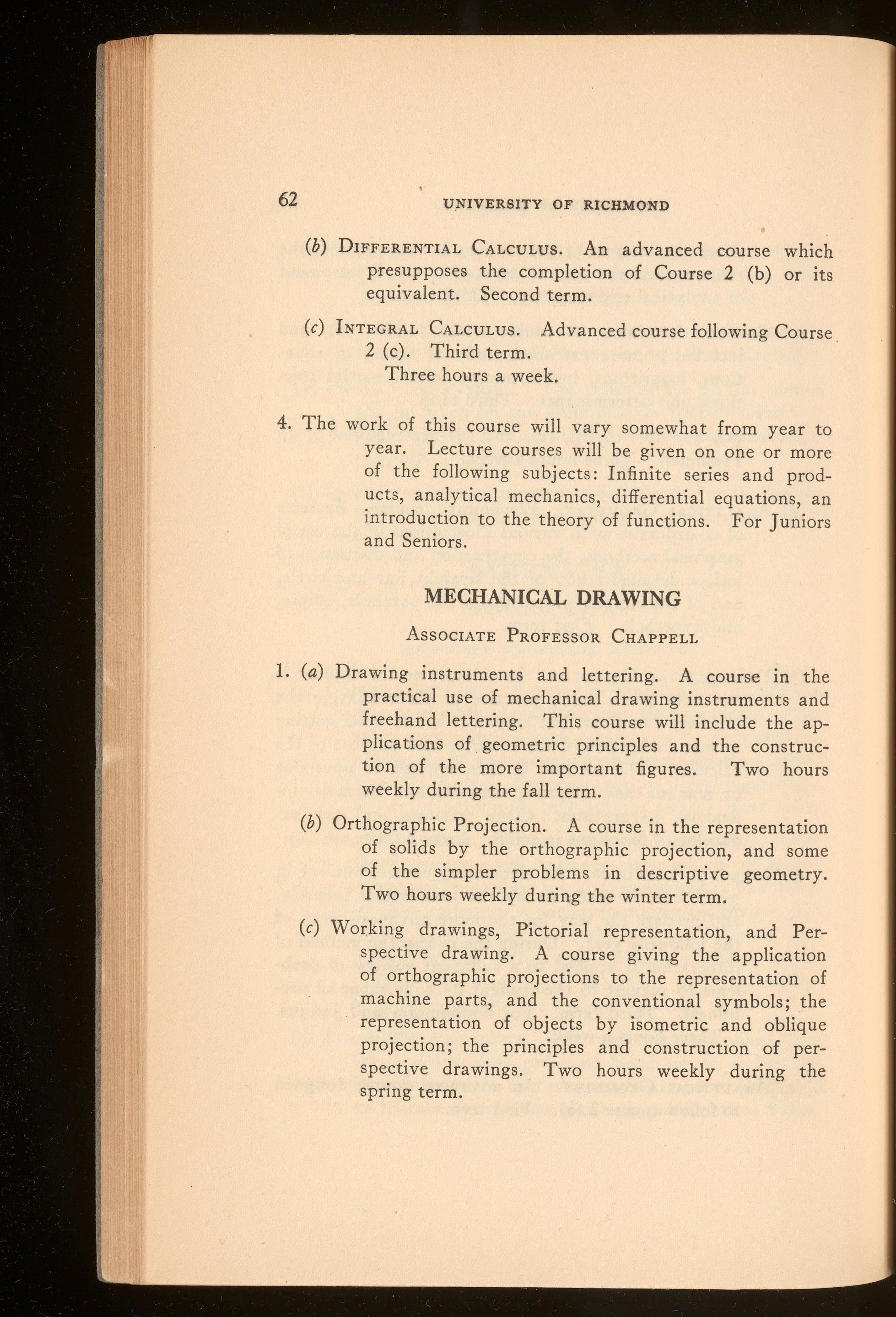
(b) DIFFERENTIAL CALCULUS. An advanced course which presupposes the completion of Course 2 (b) or its equivalent. Second term.
(c) INTEGRALCALCULUS. Advanced course following Course . 2 (c). Third term. Three hours a week.
4. The work of this course will vary somewhat from year to year. Lecture courses will be given on one or more of the following subjects: Infinite series and products, analytical mechanics, differential equations, an introduction to the theory of functions. For Juniors and Seniors.
I. (a) Drawing instruments and lettering. A course in the practical use of mechanical drawing instruments and freehand lettering. This course will include the applications of geometric principles and the construction of the more important figures. Two hours weekly during the fall term.
(b) Orthographic Projection. A course in the representation of solids by the orthographic projection, and some of the simpler problems in descriptive geometry. Two hours weekly during the winter term.
(c) Working drawings, Pictorial representation, and Perspective drawing. A course giving the application of orthographic projections to the representation of machine parts, and the conventional symbols; the representation of objects by isometric and oblique projection; the principles and construction of perspective drawings. Two hours weekly during the spring term.
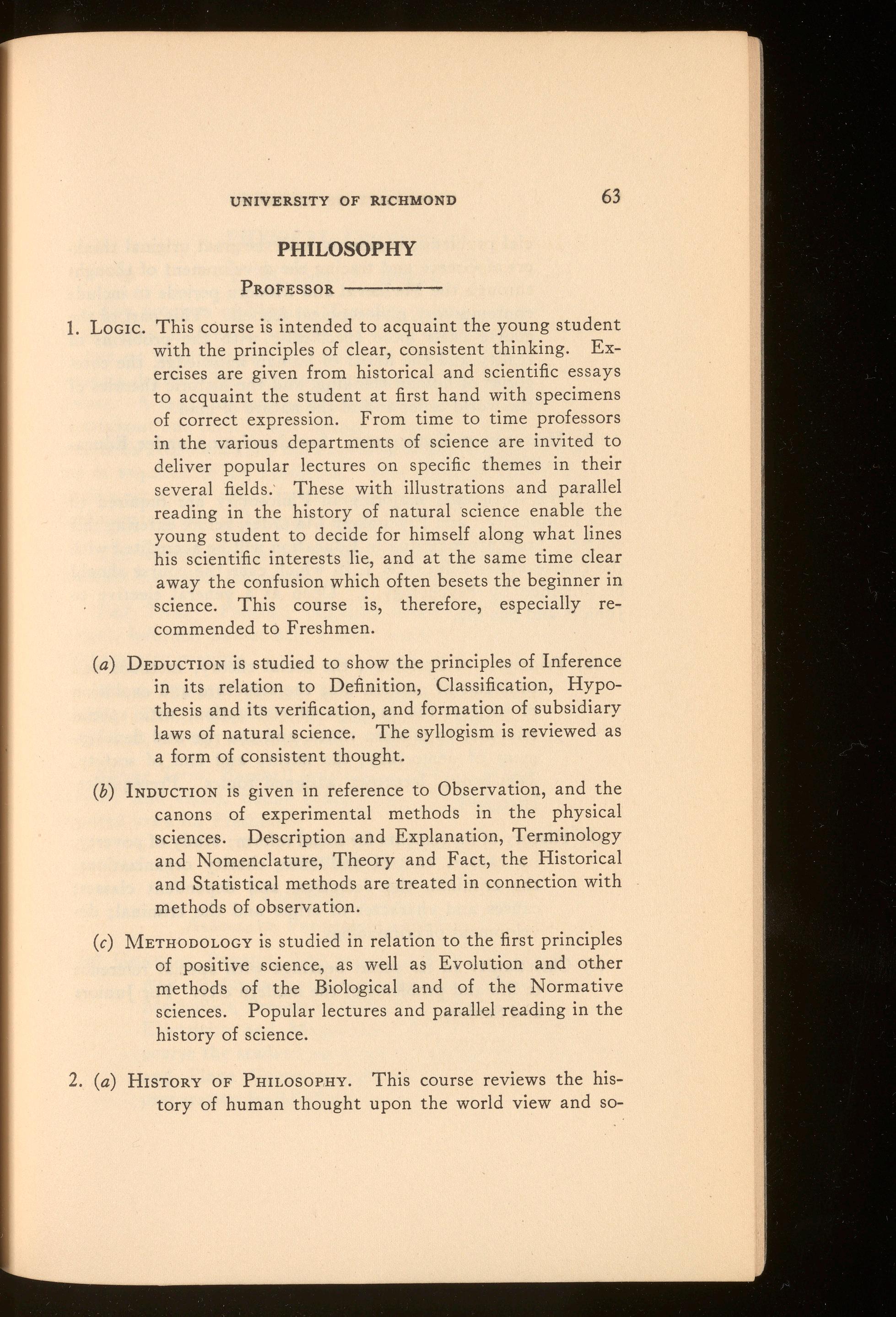
PROFESSOR-----
1. LOGIC. This course is intended to acquaint the young student with the principles of clear, consistent thinking. Exercises are given from historical and scientific essays to acquaint the student at first hand with specimens of correct expression. From time to time professors in the various departments of science are invited to deliver popular lectures on specific themes in their several fields : The se with illustrations and parallel reading in the history of natural science enable the young student to decide for himself along what lines his scientific interests lie , and at the same time clear away the confusion which often besets the beginner in science. This course is, therefore, especially recommended to Freshmen.
(a) DEDUCTIONis studied to show the principles of Inference in its relation to Definition, Classification, Hypothesis and its verification, and formation of subsidiary laws of natural science. The syllogism is reviewed as a form of consistent thought.
(b) INDUCTIONis given in reference to Observation, and the canons of experimental methods in the physical sciences. Description and Explanation, Terminology and Nomenclature, Theory and Fact, the Historical and Statistical methods are treated in connection with methods of observation.
(c) METHODOLOGYis studied in relation to the first principles of positive science, as well as Evolution and other methods of the Biological and of the Normative sciences. Popular lectures and parallel reading in the history of science.
2. (a) HISTORY OF PHILOSOP,HY. This course reviews the history of human thought upon the world view and so-
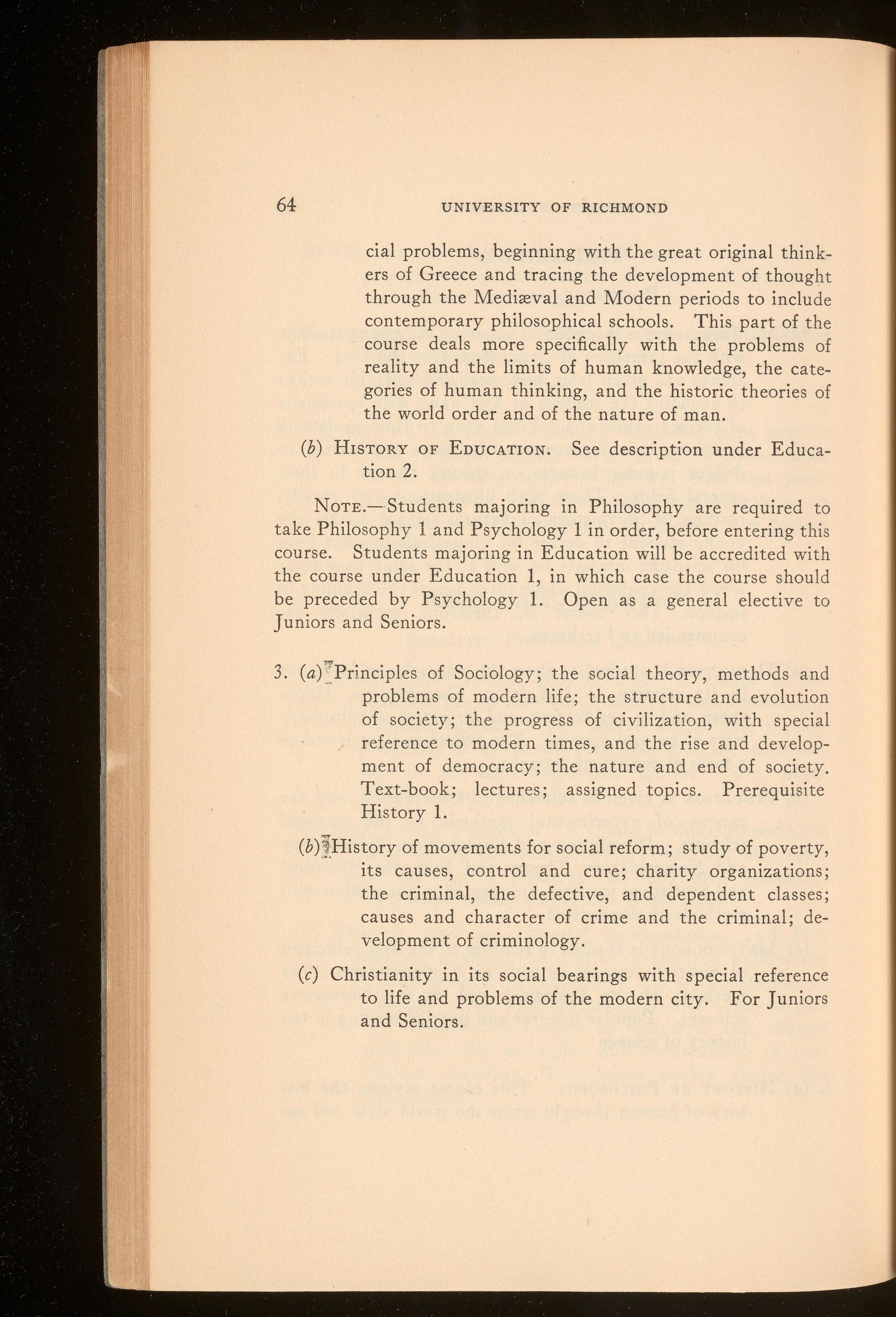
cial problems, beginning with the great original thinkers of Greece and tracing the development of thought through the Medi.eval and Modern periods to include contemporary philosophical schools. This part of the course deals more specifically with the problems of reality and the limits of human knowledge, the categories of human thinking, and the historic theories of the world order and of the nature of man.
(b) HISTORY OF EDUCATION. See description under Education 2.
NoTE.-Students majoring in Philosophy are required to take Philo sophy 1 and Psychology 1 in order, before ent ering thi s course. Students majoring in Education will be accredited with the course under Education 1, in which case the cour se should be preceded by Psychology 1. Open as a general elective t o Juniors and Seniors.
3. (af Principles of Sociology; the social theory, methods and problems of modern life; the structure and evolution of society; the progress of civilization, with special reference to modern times, and the rise and development of democracy; the nature and end of society. Text-book; lectur es; assigned topics. Prerequi site History 1.
(b)j:History of movements for social reform; study of poverty, its causes, control and cure; charity organizations; the criminal, the defective, and dependent classes; causes and character of crime and the criminal; development of criminology.
(c) Christianity in its social bearings with special reference to life and problems of the modern city. For Juniors and Seniors.

UNIVERSITYOF RICHMOND 65
F. M. DOBSON, Director
The program of Physical Training embraces various forms of athletics, making it possible for every student to participate in one or more sports. A maximum of two hours' credit towards a degree will be allowed, each hour being made up of four points. A credit of one point is given for three hours a week throughout one term in any branch of sport elected by the student if his attendance and work are satisfactory. Physical Training is required of all Freshmen. This required work will include a six weeks' course in the theory and practice of track and field events given in the spring term.
The following forms of athletics will be given from which students may elect for credit:
Fall Term: Football (varsity, scrub, second and class teams), informal basket-ball, tennis, track and volley ball and cross-country running.
Winter Term: Basket ball (varsity, second and class t eams), indoor track (varsity and class), informal and class volley ball, boxing, wrestling, swimming, and indoor baseball.
Spring Term: Baseball (varsity, second class teams), track (varsity and class), tennis (varsity and college leagues), and required work for Freshmen.
PROFESSOR LOVING
ASSOCIATEPROFESSOR CHAPPELL
L (a) GENERAL PHYSICS. This course covers in an elementary way the fundamental principles of Physics, including Mechanics, Properties of Matter, Heat, Sound, Light, Electricity and Magnetism. For admission to this course the student must have a knowledge of Algebra and Plane Geometry equivalent to the necessary pr;paration for Mathematics 1.

(b) A laboratory course to accompany 1 (a); two periods a week, two hours each. Credit, five hours.
For Freshmen and Sophomores.
2 (a) ADVANCEDPHYSICS: Mechanics, Heat, Light. Fundamental principles are recalled and their larger significance is shown . Emphasis is placed on the discus sion and derivation of physical laws as expres sed in math ematical formulae. Many illu strative problems ar e solved . Physics 1 (a) and 1 (b) and Mathematics 1 are prerequisite, and completion of Mathematics 2 is recommended.
(b) An advanced laboratory course dealing with the subjects treated in Course 2 (a); two periods a week, two hours each. Credit, five hours.
For Sophomores and Juniors.
3. (a) ADVANCEDPHYSICS: ELECTRICITYANDMAGNETISM. The grade of work and the requirements for admission are the same as for Course 2 (a). This course will include a study of magnets and the magnetic properties of iron, electrical measuring instruments, batteries, electromagnetic induction and its application in dynamos and motors, power transmission, and a brief study of the electrical theory of matter.
(b) An advanced laboratory course based on the topics treated in Course 3 (a); two periods a week, two hours each. Credit, five hours.
For Juniors and Seniors.
1. GENERAL PSYCHOLOGY. This course will give a systematic and constructive presentation of the theories, concerning the consciousness of the normal human individual. Comparisons will be made with the genetic develop-

ment of conscious life in general. The cour se is specially adapted to the cultural needs of the general student; and will prove helpful to those preparing for medicine, law, education, business, and the mini st ry. Practical applications are made throughout the course.
(a) PHYSIOLOGICALPSYCHOLOGY. The relation of mind and body shows the dependence of the conscious life upon the nervous system.
(b) ANALYTICALPsYCHOLOGY.Study of sensation with qualitative and quantitative analysis, including the relation of sensation to the sense organs and the physical environment.
(c) SYNTHETICPSYCHOLOGY. Constructive study of theories, concerning the complex phases of mind, including perception, association, attention, memory and imagination, action and volition, feeling and emotion, language and intellect.
(d) APPLIED PsYCHOLOGY. During the Spring Term, special investigation of some particular field of applied psychology and a term paper on that subject is required of each student.
PROFESSORHANDY
A course of one year i~ the principles and practice of Public Speaking is offered. The training of students in accuracy of thought and correctness of expression, and in ease of delivery will be stressed. Practical speaking necessary for successful accomplishment is the aim of this instruction. Prac_~ice in the art of public speaking will be afforded by the delivery before the class of original orations and other forms of address.
In addition to oral practice there will be wide reading and critical study of examples of the various forms of public speechdeliberative, forensic, occasional, etc.
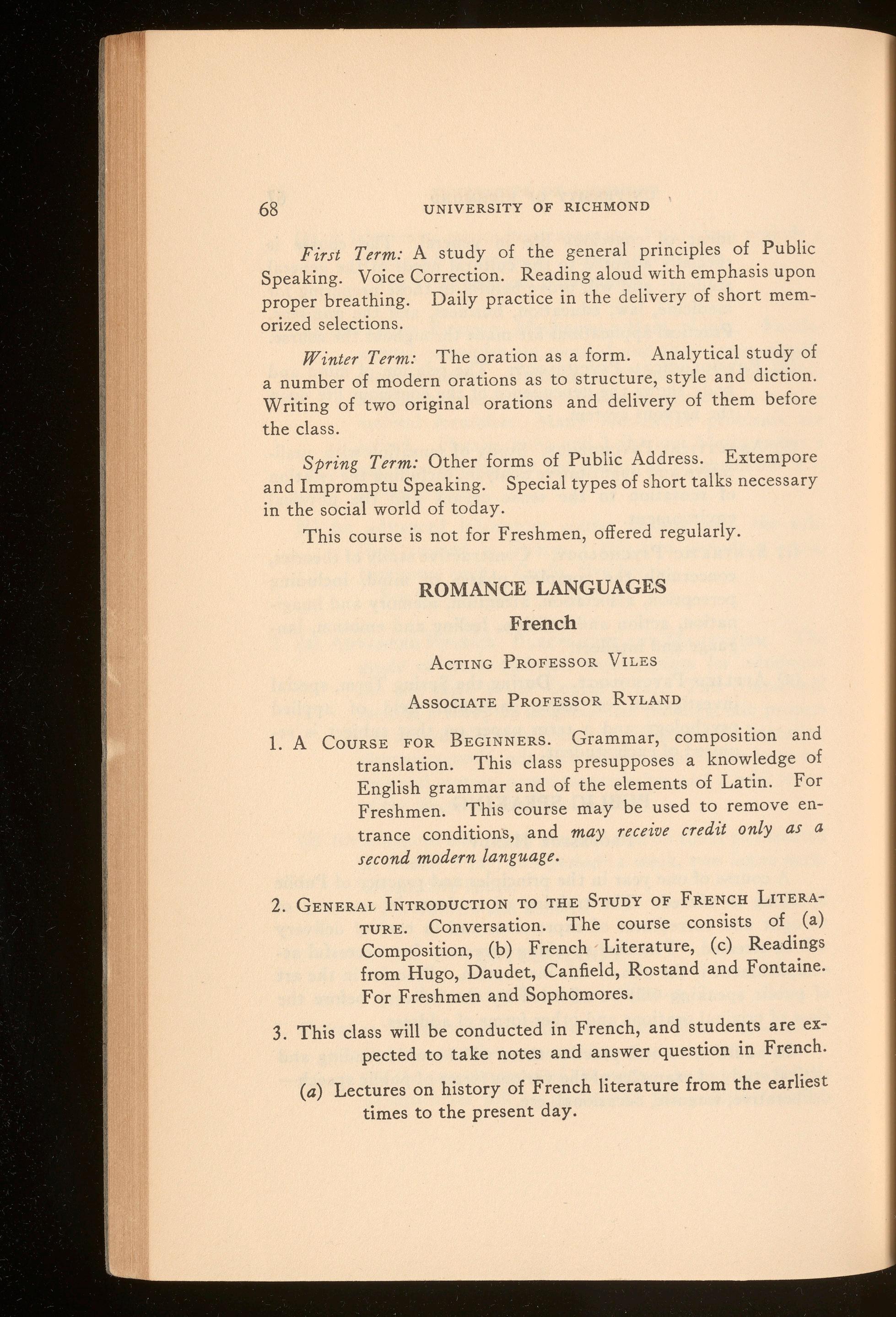
First Term: A study of the general principles of Public Speaking. Voice Correction. Reading aloud with emphasis upon proper breathing. Daily practice in the delivery of short memorized selections.
Winter Term: The oration as a form. Analytical study of a number of modern orations as to structure, style and diction Writing of two original orations and delivery of them before the class.
Spring Term: Other forms of Public Address. Extempore and Impromptu Speaking. Special types of short talks necessary in the social world of today. This course is not for Freshmen, offered regularly.
AcTING PROFESSORVILES
AssocIATE PROFESSORRYLAND
1. A CouRSE FOR BEGINNERS. Grammar, composition and translation. This class presupposes a knowledge of English grammar and of the elements of Latin. For Freshmen. This course may be used to remove entrance conditions, and may receive credit only as a second modern language.
2. GENERAL INTRODUCTIONTO THE STUDYOF FRENCH LITERATURE. Conversation. The course consists of (a) Composition, (b) French Literature, (c) Readings from Hugo, Daudet, Canfield, Rostand and Fontaine. For Freshmen and Sophomores.
3. This class will be conducted in French, and students are expected to take notes and answer question in French.
(a) Lectures on history of French literature from the earliest times to the present day.

(b) Studies in French style, composition, etc.
(c) The reading will include selected classics of the seventeenth centruy, examples of Romanticism and Realism in the nineteenth century, and selections from contemporary literature.
4. A study of the French Drama from its beginnings to the end of the XIX century. Lectures in French, readings and discussions in cla ss in French, outside readings with summaries in French. Prerequisite, course 3.
Three hours a week throughout the year.
1. A CouRSE FOR BEGINNERS. Elementary grammar, composition, and translation of easy Spanish texts. Assigned parallel reading. This course may be used to remove entrance requirements and may receive credit only as a second modern language.
2. SPANISH LITERATURE AND CONVERSATION. The course consists of (a) Composition, (b) Spanish Literature, (c) Readings from selected Spanish authors. Assigned parallel in Spanish history and current South American magazine articles.
3. This course will be conducted in Spanish and the students are expected to take notes and ask questions in Spanish. (a) Lectures on Spanish Literature and history (b) Studies in Spanish style, composition, etc., (c) Readings from selected Spanish classics, and also from present day writers.
UNIVERSITY OF RICHMOND
MARION G. RYLAND, B. A., B. S., Librarian
Lucy T. THROCKMORTON, Assistant Librarian
ELIZABETH P. GAINES, B. A. Westhampton Reading Room
Student Assistants
0. L. HITE
C. G. CARTER
w. N. BEEHLER

RACHEL NEWTON
ELIZABETH GAYLE
C. w. GARRISON
The Library occupies the southern wing of Ryland Hall. The interior is panelled in oak, and the book-cases arranged in alcove plan. There is, at each end, a five-fold Gothic window of striking size and beauty, and in each alcove a casement window, the whole affording natural light at all hours of the day. In convenience and harmony of effect, the Library is the culmination of the collegiate Gothic, that exquisite perpendicular type made familiar by the English colleges, to which all the College buildings strictly conform.
It contains about thirty thousand volumes, not including pamphlets, arranged and catalogued by the Dewey System. The most recent and useful bibliographical aids are provided, and the best· periodicals and reviews, daily and weekly papers are currentiy received. As a depository of the United States Government, the Library acquires annually hundreds of publications especially valuable for reference in social and political science. The students have direct access to the shelves during ten hours each day, and the Librarian and assistants are always on hand to give help in any line of reading or research.
For the convenience of the undergraduates of Westhampton College, there is also maintained in the Reading Room at Westhampton College a well selected reference library.
The College counts itself peculiarly fortunate in having close by s~veral great collections of books, which materially increase its library resources. Through the courtesy of the officials,

the one hundred thousand volumes of the Virginia State Library and the unique collection of the Virginia Historical Society have been made accessible to our students, both for consultation and withdra w~l. These afford exceptional facilities for research, not only in general subjects, but especially in Virginia and American history. It should also be mentioned that our nearness to Washington enables us to make constant use of the Congressional Library, from which rare books and pamphlets invaluable for theses and debates can be quickly obtained.
These Lectures are provided for by "The Thomas Museum Lecture Endowment" of $11,000 donated by his family in memory of the late president of the corporation, James Thomas, Jr. They are delivered annually by eminent men of our own and foreign countries on Science, Philosophy, Art or Literature, and by special provision are open to the public without charge. The following distinguished scholars have delighted large audiences and greatly stimulated literary and scientific research:
Charles A. Young, Ph.D., of Princeton; H. Newell Martin, Ph. D., of Johns Hopkins University; W. T. Harris, LL. D., United States Commissioner of Education; President D. C. Gilman, LL. D., of Johns Hopkins University; Professor Robert Y. Tyrell, M. A., University of Dublin, Ireland; Horace H. Furness, Ph. D., LL. D., of Philadelphia; Professor C. T. Winchester, A. M., of Wesleyan University; Professor Albion W. Small, Ph. D., of Chicago University; President G. Stanley Hall, Ph. D., LL. D., of Clark University; Professor J. Henry Breasted, Ph. D., of Chicago University; President Woodrow Wilson, Ph. D., LL. D., of Princeton University; President Benjamin Ide Wheeler, Ph. D., LL. D., of the University of California; Hamilton Wright Mabie, LL. D., of New York; Sir Robert Ball, of Oxford; Professor Henry Van Dyke, LL. D., of Princeton; Mr. Lorado Taft, of Chicago; Professor Arlo Bates, of the Massachusetts Institute of Technology; Professor John B. Clarke, LL. D., of Columbia University; Professor Josiah Royce, Ph. D., LL. D., of Harvard University; Professor
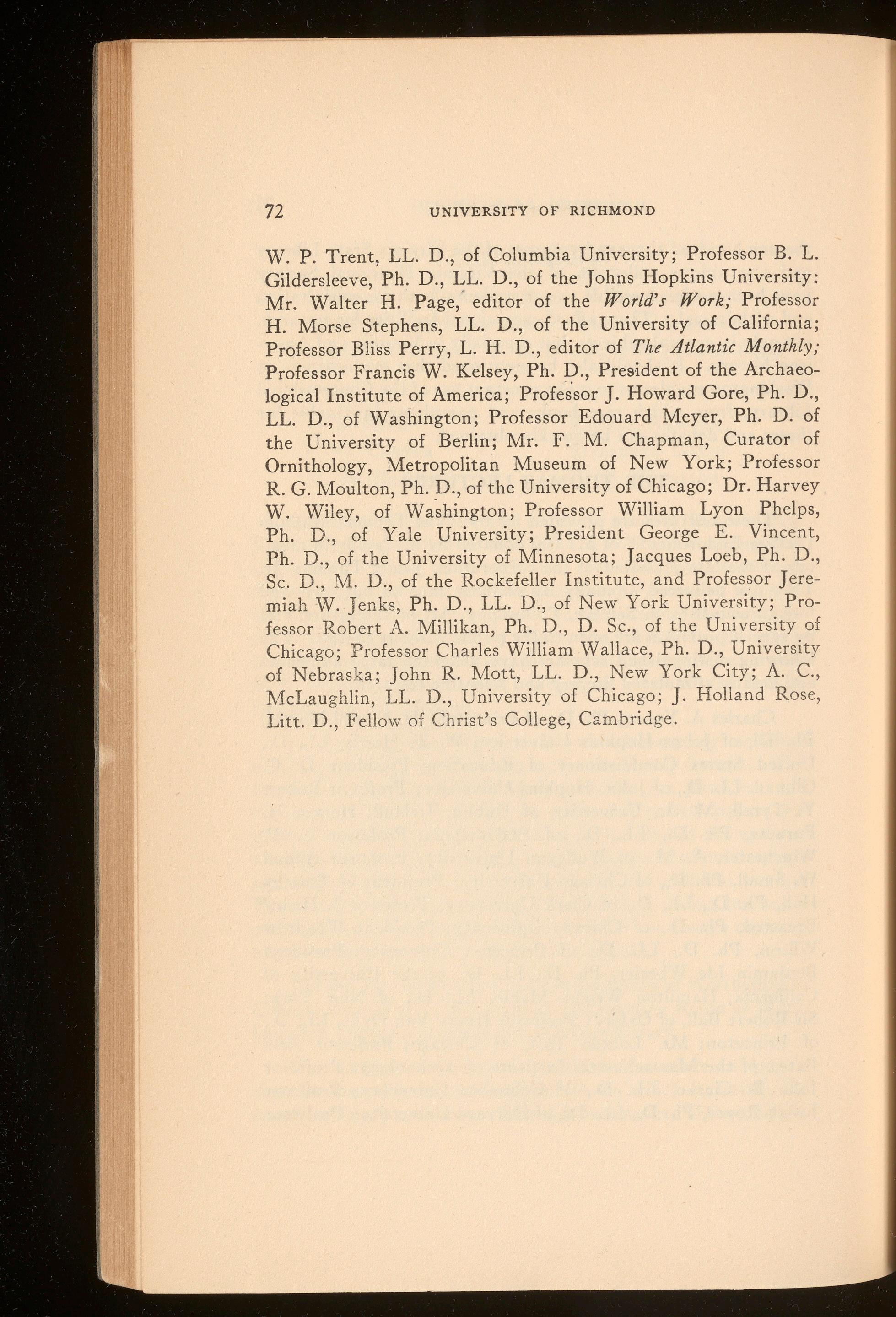
W. P. Trent, LL. D., of Columbia University; Professor B. L. Gildersleeve, Ph. D., LL. D., of the Johns Hopkins University: Mr. Walter H. Page, ' editor of the World's Work; Professor H. Morse Stephens, LL. D., of the University of California; Professor Bliss Perry, L. H. D., editor of The Atlantic Monthly; Professor Francis W. Kelsey, Ph. D., President of the Archaeological Institute of America; Profe -;sor J. Howard Gore, Ph. D., LL. D., of Washington; Professor Edouard Meyer, Ph. D. of the University of Berlin; Mr. F. M. Chapman, Curator of Ornithology, Metropolitan Museum of New York; Professor R. G. Moulton, Ph _I).,of the University of Chicago; Dr. Harvey W. Wiley, of Washington; Professor William Lyon Phelps, Ph. D., of Yale University; President George E. Vincent, Ph. D., of the University of Minnesota; Jacques Loeb, Ph D., Sc. D., M. D., of the Rockefeller In st itute, and Professor J eremiah W. Jenks, Ph. D., LL. D., of New York University; Professor Robert A. Millikan, Ph. D., D. Sc., of the University of Chicago; Professor Charles William Wallace, Ph. D., University of Nebraska; John R. Mott, LL. D., New York City; A. C., McLaughlin, LL. D., University of Chicago; J. Holland Rose, Litt. D., Fellow of Christ's College, Cambridge.
SUGGESTED COURSES LEADING TO DEGREES
1st year
Eng. I Lat. I
Math. I
Hist. 1
Fr. 2
Phys. Ed.
16 hrs.
Eng. 1
Grk. I (No Cr )
Math I
Phys . I
Fr. 2
Phys. Ed.
15 hrs
En g. 1
M ath 1
Phys. I
Fr. 2
Drawin g
Ph y s. Ed
17 hrs.
E n g. 1
M ath. I
Phy s. I
Che m . I
Ph y s Ed.
17 hrs.
En g. I Math. 1
Chem I Phys. I Phys. Ed.
I 7 hrs.
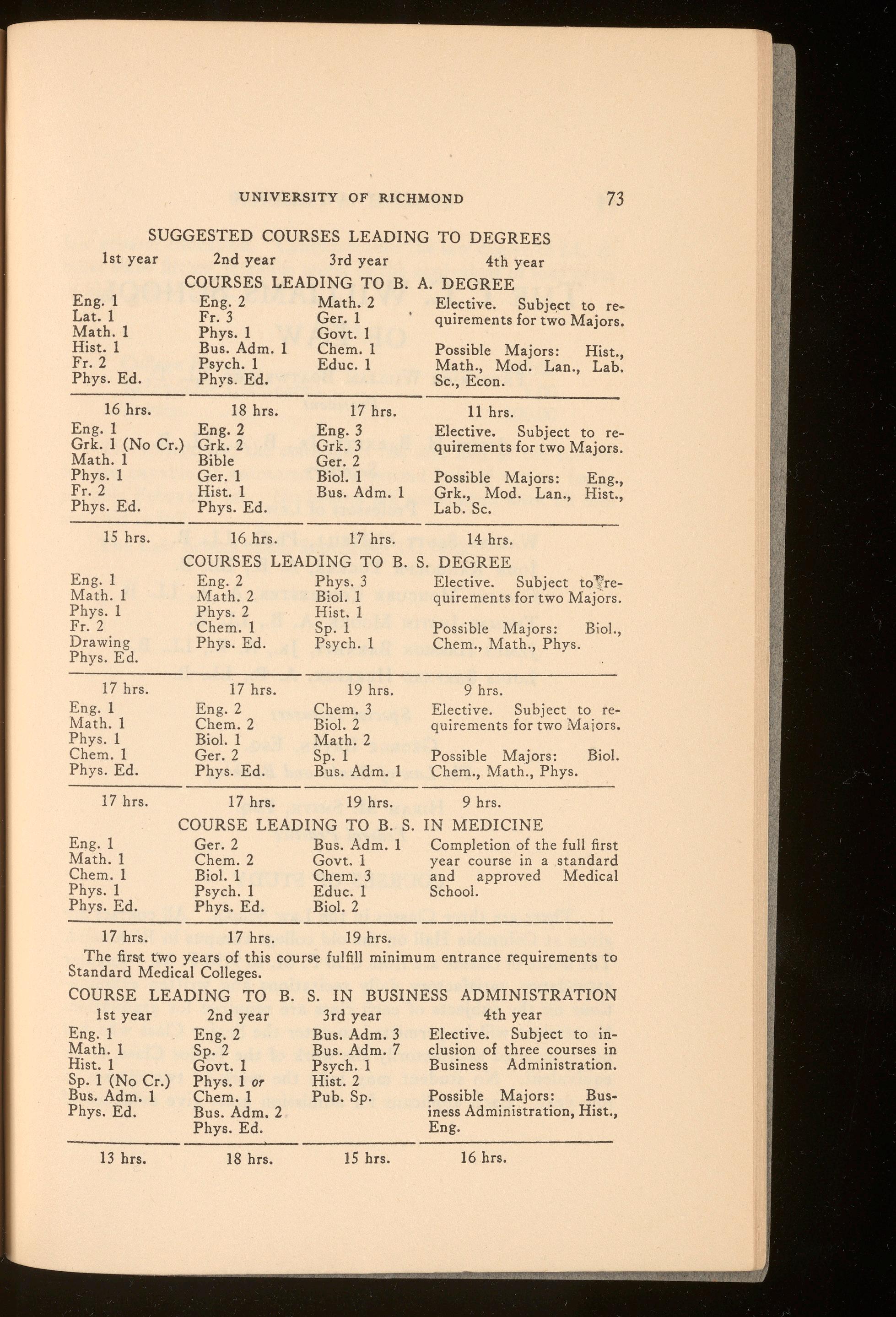
2nd year 3rd year 4th year
COURSES LEADING TO B. A. DEGREE
Eng. 2 Math. 2 Elective. Subje ct to reFr. 3 Ger I quirements for two Majors.
Phys. 1 Govt. I
Bus. Adm. 1 Chem. 1
Psych. 1 Educ. I
Phys. Ed.
18 hrs.
Eng. 2 Grk. 2
Bible
Ger. 1
Hist. 1
Phys. Ed.
17 hrs.
Eng. 3 Grk. 3
Ger. 2
Biol. 1
Bus. Adm. 1
Possible Majors: Hist., Math., Mod. Lan., Lab. Sc., Econ.
11 hrs.
Elective. Subject to requirements for two Majors.
Possible Majors: Eng., Grk., Mod. Lan., Hist., Lab Sc.
16 hrs. I 7 hrs 14 hrs.
COURSES LEADING TO B. S. DEGREE
Eng 2 Phys. 3 Elective. Subject to ".;reMath . 2 Biol. I quirements for two Majors. Phys. 2 H ist. I
Chem. I Sp . I
Possible Majors: Biol. , Phys. Ed. P sy ch. I Chem., Math., Phys
17 hrs 19 hrs. 9 hr s
Eng 2 Chem. 3 Elective. Subject to reChem. 2 Biol. 2 quir ements for two M a iors. Biol. I Math. 2
Ger. 2 Sp. I Po ssible Majors: Biol. Phys Ed. Bus. Adm. I Chem., Math., Phys .
17 hrs. 19 hrs 9 hrs.
COURSE LEADING TO B. S. IN MEDICINE
Ger. 2
Chem. 2 Biol. 1
Psych. I Phys. Ed.
17 hrs.
Bus. Adm I Govt. I Chem. 3 Educ . I Biol. 2 19 hrs. Completion of the full first year course in a standard and approved Medical School.
The first two years of this course fulfill minimum entrance requirements to Standard Medical Colleges.
COURSE LEADING TO B. S. IN BUSINESS ADMINISTRATION
1st year 2nd year 3rd year 4th year
Eng. I Eng. 2 Bus. Adm. 3 Elective. Subject to inMath. I Sp 2 Bus. Adm. 7 clusion of three courses in Hist I Govt. 1 Psych. 1 Business Administration. Sp. 1 (No Cr.) Phys. 1 or Hist. 2
Bus. Adm. I Chem. 1 Pub. Sp. Possible Majors: BusPhys. Ed. Bus. Adm. 2 iness Administration, Hist., Phys. Ed. Eng.
13 hrs. 18 hrs. 15 hrs. 16 hrs.
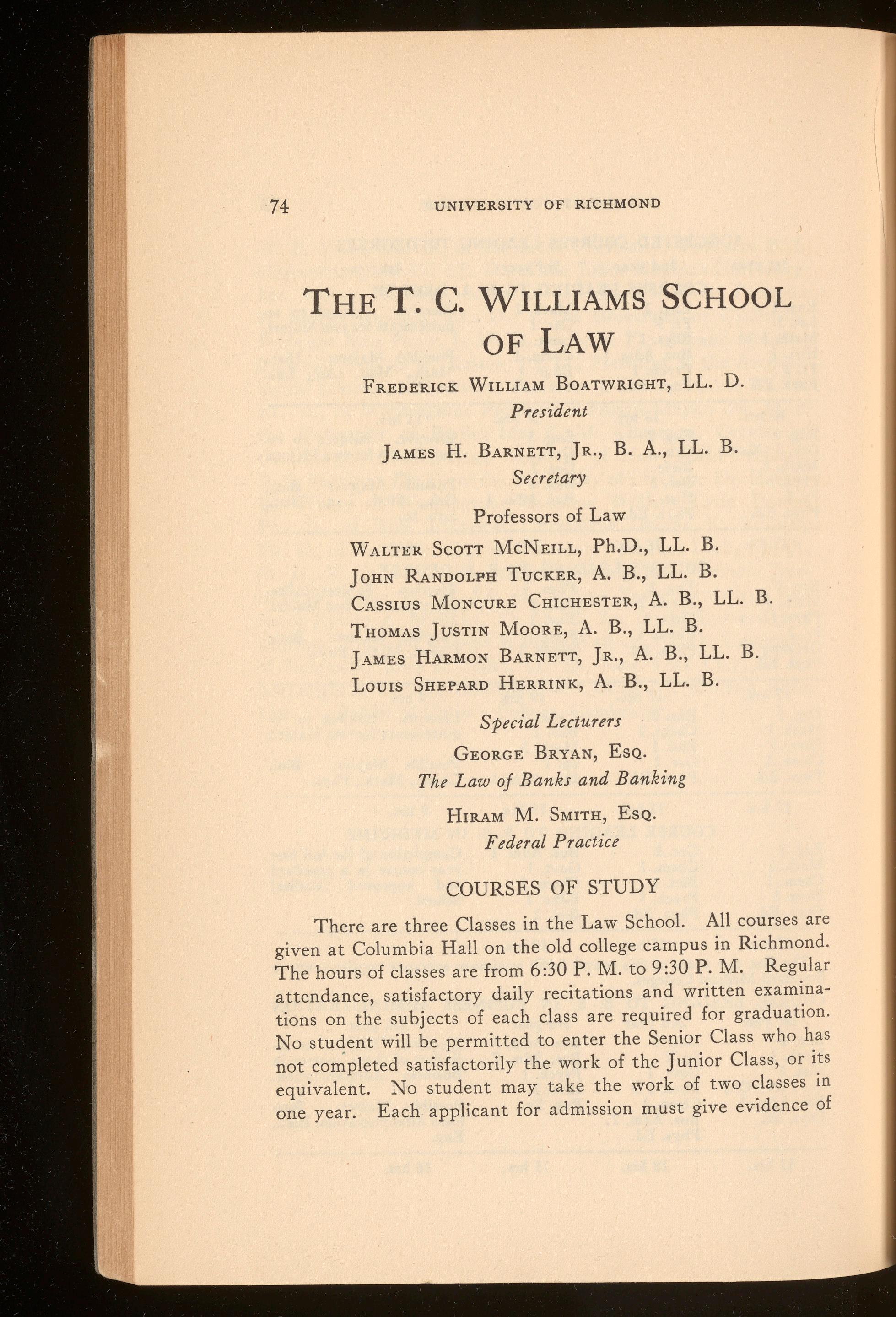
UNIVERSITYOF RICHMOND
FREDERICK WILLIAM BOATWRIGHT,LL. D.
President
JAMES H. BARNETT, JR., B. A., LL. B.
Secretary
Professors of Law
WALTER ScoTT McNEILL, Ph.D., LL. B.
JOHN RANDOLP.H TUCKER, A. B., LL. B.
CASSIUS MONCURE CHICHESTER,A. B., LL. B.
THOMAS JUSTIN MOORE, A. B., LL. B.
JAMES HARMONBARNETT, JR., A. B., LL. B.
Lours SHEPARDHERRINK, A. B., LL. B
Special Lecturers
GEORGE BRYAN, EsQ.
The Law of Banks and Banking
HrRAM M. SMITH, EsQ.
Federal Practice
There are three Classes in the Law School. All courses are given at Columbia Hall on the old college campus in Richmond . The hours of classes are from 6:30 P. M. to 9:30 P. M. Regular attendance, satisfactory daily recitations and written examinations on the subjects of each class are required for graduation . No stu~ent will be permitted to enter the Senior Class who ha s not completed satisfactorily the work of the Junior Class, or its equivalent. No student may take the work of two classes in one year. Each applicant for admission must give evidence of
fair general education. Candidates for the law degree of LL. B. must show fifteen entrance units, or the equivalent of four years of high school work.

The college fee, the contingent fee, and half of the tuition fee are payable at entrance. The second half of tuition fee is payable February 1st. No honors are announced until all fees are paid in full.
The Law School opens September 14, 1922.

President
MAY LANSFIELDKELLER, PH. D. Dean
The buildings of Westhampton College occupy 135 acres of the campus of the University of Richmond. Separated from this campus by a lake of about nine acres in extent are the spacious grounds of the college for men. The situation is in the western suburbs of Richmond, easily accessible by street cars.
Westhampton College is owned and controlled by the University of Richmond corporation, and enjoys all the general advantages afforded by co-ordination with an old and well established college of standard grade. At the same time the college for women has its own separate campus, its own buildings, and its independent institutional life. While many professors teach in both colleges, instruction is separate, and women are not taught in classes with men. The internal administration of Westhampton College is immediately in charge of a woman dean, and both men and women teach in the faculty.
The grounds, buildings, and equipment of Westhampton College are valued at $500,000, and the college shares largely in the benefit of the endowment held by the University corporation. The buildings, of Gothic architecture, are most substantially constructed. The framework is steel set in concrete. All floors are of reinforced concrete, and partitions are of brick or hollow tile. The stairways are of steel with slate treads, the window frames of concrete stone and the sash of bronze. The appointments

UNIVERSITY OF RICHMOND 77
throughout are of the very best. Safety, health, and comfort of students have everywhere been considered.
The same entrance requirements and the same standards apply in Westhampton College as in Richmond College, with which it is co-ordinate. The next session opens September 14, 1922. For special catalogue and other information, address
DR. MAy L. KELLER, Dean of Westhampton College,
University of Richmond, Va.

A course of study lasting six weeks is offered. Various courses suitable to meet the needs of conditioned students, of teachers who wish to obtain the Collegiate Certificate and the Special Certificate will be offered. Certain classes will be formed to enable pre-medical students advantageously to complete preliminary requirements.
For information, address W. L. PRINCE, DIRECTOR OF THE SUMMER SCHOOL. University of Richmond, Virginia.
Alley, Reuben Edward
Atkins, Robert Stephenson .. Booker, Robert Spurgeon ..
Burnette, Otway Kyle ': ,
Carter, Cecil Gentry ........ ...... ..........
Davenport, Boswell Utz ....... .
Dunaway, Thomas Sanford Jr .......
Ellett, Ernest Vernon ...
Eubank, George Duncan
Garst, Robert Edward
Graves, Charles Coakley ...
Grey, Edward Wherry ..
Haynes, William Tyler
Henderson, William Carey
Hite, Oscar Lee
Hui, Ching Yeung .............. ...... ....
L~ek, Charles Francis .....

..Petersburg, Va.
..Windsor, Va.
........ Naruna, Va.
Leesville, Va.
.. ...Salem, Va
...Richmond, Va
.......Smithfield, Va.
...Pocahontas, Va.
. ....Richmond, Va
............ Richmond, Va.
........... Richmond, Va.
..Richmond, Va.
..Richmond, Va.
......... Schuyler, Va.
.........Virgilina, Va.
.Canton, China
.....Baltimore, Md.
Lop.g, James Walter ................ ........... ...........Liberty, S. C.
Marsh, Robert Thornton Jr ...
Mozingo, Bransom Lee ...
Newton, Chauncey Wayland .. ..
Patterson, George Clifton .......
Quillen, Beverage Tate
Rotella, Joseph.... .........
Rudd, Augustus Bartow
Simons, John David
Smith, Albert Gordon ...... ..
Stevens, George Dewey
Tyson, Leo Boddie ... Vandever, William Tolbert ......
Walden, Richard Channing .......
Willis, John Harry ............
Wood, David Edgar... ....
Woodfin, William Clarence
Anderson, Henry Brown
Apperson, Neil Jones
.....Richmond, Va.
........... Korea, Va.
...Graham, Va.
.......Richmond, Va .
.....Gate City, Va.
Norton, Va.
...... Mexico City, Mex .
.......Colerain, N. C.
Altavista, Va.
........ Nace, Va.
.Richmond, Va.
Hampstead, Md.
....Richmond, Va .
. ..Lignum, Va
Charlottesville, Va.
.Ashland, Va.
...... Rio Vista, Va.
..Richmond, Va
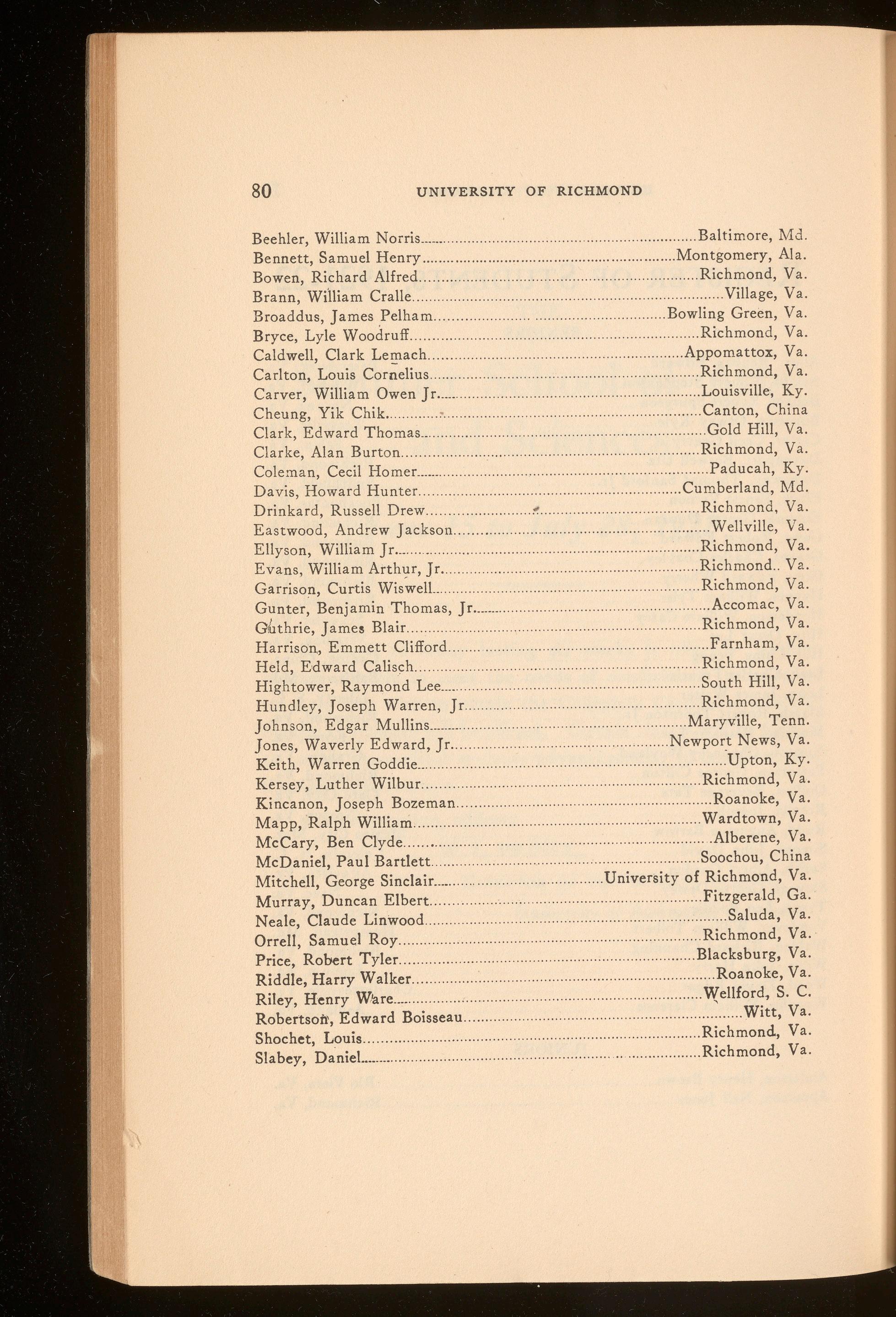
Beehl er, Will iam Norris ......................................... .... ....Baltimore , Md.
Bennett, Samuel Henry ........ ... ........ .. ...Montgomery, Ala.
Bowen, Richard Alfred.. ...... ........ Richmond, Va
Brann, Wi'Iliam Cralle .. .................... .......Village, Va
Broaddus, James Pelham .... ... Bowling Gre en, Va.
Bryce, L y le Woodruff.. Richmon d , Va .
Caldwell, Clark Le!!'lach ...................... ...... ....Appomattox, Va
Carlton, Louis Cornelius ...... _.Richmond, Va
Carver, William Owen Jr ..... ..Louisville, Ky
Cheung, Yik Chik . ................. ......Canton, Chin a
Clar k, Ed ward Tho mas ...... G old Hill, Va
Cla r ke, Alan Burt on.. ............. ............... Richmond, Va.
Col em an, Cecil Ho me r...... ..,..... ..... ........ ..........Paducah, K y.
Da vis , Ho war d Hunte r ....... ....Cu m berland, Md .
Drinkard, Ru ssell Drew.. ~......... ... .Richmon d , Va.
E as tw ood , Andrew Jac kson ..... ... .. ............................... .. W ellville, Va
Elly son, William Jr ....... .................................... ...... ................ Richmond , Va.
Evan s, William Arthur, Jr .. Richmond .. Va
Garri son, Curtis Wis~elL. R ichmond, Va
Gunter, Benjamin Thomas, Jr... ...... .............. Accomac, Va.
G !lt hrie, James Blair ....Richmond, Va.
Harrison, Emmett Clifford ...Farnham, Va
Held, E•dward Cali s~h.. . . .....Richmond, Va.
Hightower, Raymond Lee. South Hill, Va.
Hundley, Joseph Warren, Jr Richmond, Va
John so n , Edg ar Mullins. ....... ..Mar y vill e, Tenn. Jones, Waverl y Edward, Jr... Newport News, Va
Keith, Warren Gaddie.. ... :Upton, Ky.
Kersey, Luther Wilbur. Richmond, Va.
Kincanon, Joseph Bozeman ........ .Roanoke, Va
Mapp, Ralph William ..... ..... ......... Wardtown, Va
McCary, Ben Clyde ...... .. .Alberene, Va .
McDaniel, Paul Bartlett.. Soochou, China
Mitchell, George Sinclair...... .......University of Richmond, Va
Murray, Duncan Elbert.. .. .. ..Fitzgerald, Ga
Neale, Claude Linwood ............ Saluda, Va .
Orrell, Samuel Roy .. ........ Richmond, Va .
Price, Robert Tyler . . Blacksburg, Va .
Riddle, Harry Walker ...... .. ......... Roanoke, Va.
Riley, Henry WIJ.re ............................. Y(ellford, S. C.
Robertsoir, Edward Boisseau. .. ...... ........ ..Witt, Va.
Shochet, Louis ... ... ..... . .................Richmond, Va .
Slabey, DanieL. .. ...... ... .... ...... .. .Richmond, Va
Snead, Clem Newbill. Snead, Edwin Smither... Spicer, Clyde Allen Stockton, Bee
Tarrant, John M. Garland Tucker, James Thomas, Jr
Wescott, Gustave Riden .. White, Henry Palmore . Whitehurst, Lawrence Miles .. Whitted, Hugh Sidney
Addington, Lawton Craft Alderson, Thomas Marshall Andrew~, Ramon Washington Atkins, George Griffith Ball, William Linwood Beaty, Ira Owens Bethel, Ralph Courtney Blanks, James Bailey ...... . Booker, Russell Eubank Bowers, Alfred Ellis Carlton, Graham Ashton .... Cohen, Paul. ......... Cook, George Frederick, Jr Cooke, Ernest . Crowder, William Junius Cummins, Herbert Samuel.. Deaner, Ira Cleon ...... Dekle, Thomas AnseL Dudley, Paul Kreuger .. Edwards, Horace Hall... Flournoy, Sellwyn Lester Frazier, William Dempsey Freedley, George Reynolds Gayle, Seth, Jr George, Lewis Dudley Gladding, Walter Reuben Gordon, John Berkeley Gordon, Thomas Braxton. Harmon, Augustus Morgan . ... Harri"son, Eugene Anderson .. Henson, Clifton William

Dry Fork, Va. H y las, Va.
..Hanover, Va.
............ Richmond, Va.
.. ... .King William, Va.
......... .Huntington, W. Va.
Pain t er, Va
...New Canton, Va. Richmond, Va Scottsville, Va
Coeburn, Va.
.......... Lebanon, Va. Richmond, Va.
.Windsor, Va.
.............. Richmond, Va.
..... ...Front Ro y al, Va.
.... Richmond, Va . Clarksvill e, Va
........ Healys, Va
.......... Richmond, Va.
.Appomattox, Va
......... Richmond, Va. Washington, Va.
....Richmond, Va.
........ Rich mon d , Va.
.Natural Bridge, Va
....Ma d isonville, Va.
........ .Tampa, Fla.
....Roanoke, Va
Ne wp ort News, Va. Richmond, Va .
......Suffolk, Va
....Richmond, Va.
Richmond, Va
........Richmond , Va
Cape Charles, Va
............. Richmond, Va.
.......Appomattox, Va.
..Norton, Va. Richmond, Va . Richmond, Va.
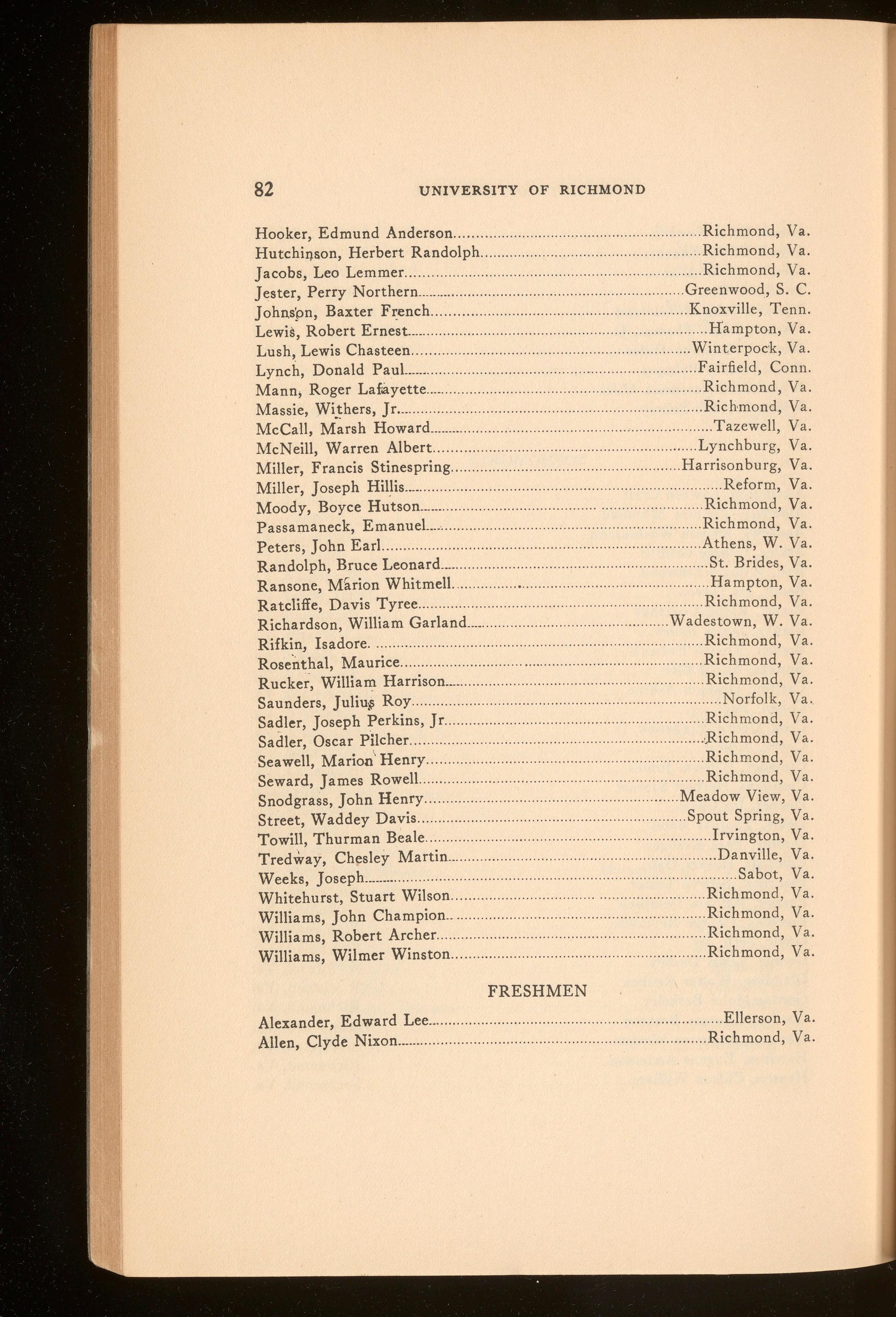
Hooker, Edmund Anderson ... ...... ........ ....... Richmond , Va.
Hutchinson, Herbert Randolph Richmond, Va .
Jacobs, Leo Lemmer. ..... Richmond, Va
Jester, Perry Northern .................... .....Greenwood, S. C
Johnspn , Baxter French ................................ ....Knoxvill e , T enn.
Lewis, Robert Ernest.. ................ ..... ...... Hampt on, Va .
Lush, Lewis Chasteen.. ..... Winterpoc-k , Va.
Lynch, Donald Paul... .. ..Fairfield , Con n.
Mann, Roger Lafayette .. ......Ri ch mo nd , Va.
Massie, Wi_~hers,Jr..... ........Richm ond , Va.
McCall, Marsh Howard .................. T azew ell, Va.
McNeill, Warren Albert .. .... ....... .............. .. Ly nchbur g, Va.
Miller, Francis Stinespring Harri sonburg, Va
Miller, Joseph Hil_lis.. ...... ...... Reform , Va
Moody, Boyce Hutson.. .............. ......Richmon d , Va.
Passamaneck, Emanuel.... ................. Richmond, Va.
Peters, John Earl...... .................... ........ At hen s, W. Va.
Randolph, Bruce Leonard ....................... St . Bride s, Va.
Ransone, Marion Whitmell. ........ ...Hampt on, Va Ratcliffe, Davis Tyree .............. Richmond , Va
Richardson , William Garland. ....................... .. ...W a d es town , W . Va.
Rifkin, Isadore Richmond, Va.
Rose;,_thal, Maurice........ ........ .................... Richm ond, Va
Rucker", William Harrison... .................. Rich mond, Va
Saunders, Juliu§ Roy.... .....N orfolk, Va.
Sadler, Joseph Perkins, Jr ........ ........... ........R ich mo n d, Va. Sadler, Oscar Pilcher ...........:Rich mond, Va .
Seawell, Marion ' Henry.. .. Rich m ond , Va. Seward, James Rowell ...... Richmond , Va . Snodgrass, John Henry. Meadow View, Va Street, Waddey Davis ......... .Spout Sprin g, Va. Towill, Thurman Beale ............ .Irvingt on, Va.
Tredway, Chesley Martin Danvill e, Va
Weeks, Joseph... ....... ..... Sabot, Va
Whitehurst, Stuart Wilson ............ .......Richmon d, Va
Williams, John Champion ...........Richmond , Va. Williams, Robert Archer ......Richmond, Va.
Williams, Wilmer Winston .. Richmond , Va.
Alexander, Edward Lee .......... Ellerson, Va
Allen, Clyde Nixon .................. ........Richmond , Va.
UNIVERSITY OF RICHMOND 83
Allen, Philip Sidne y ..... .......................
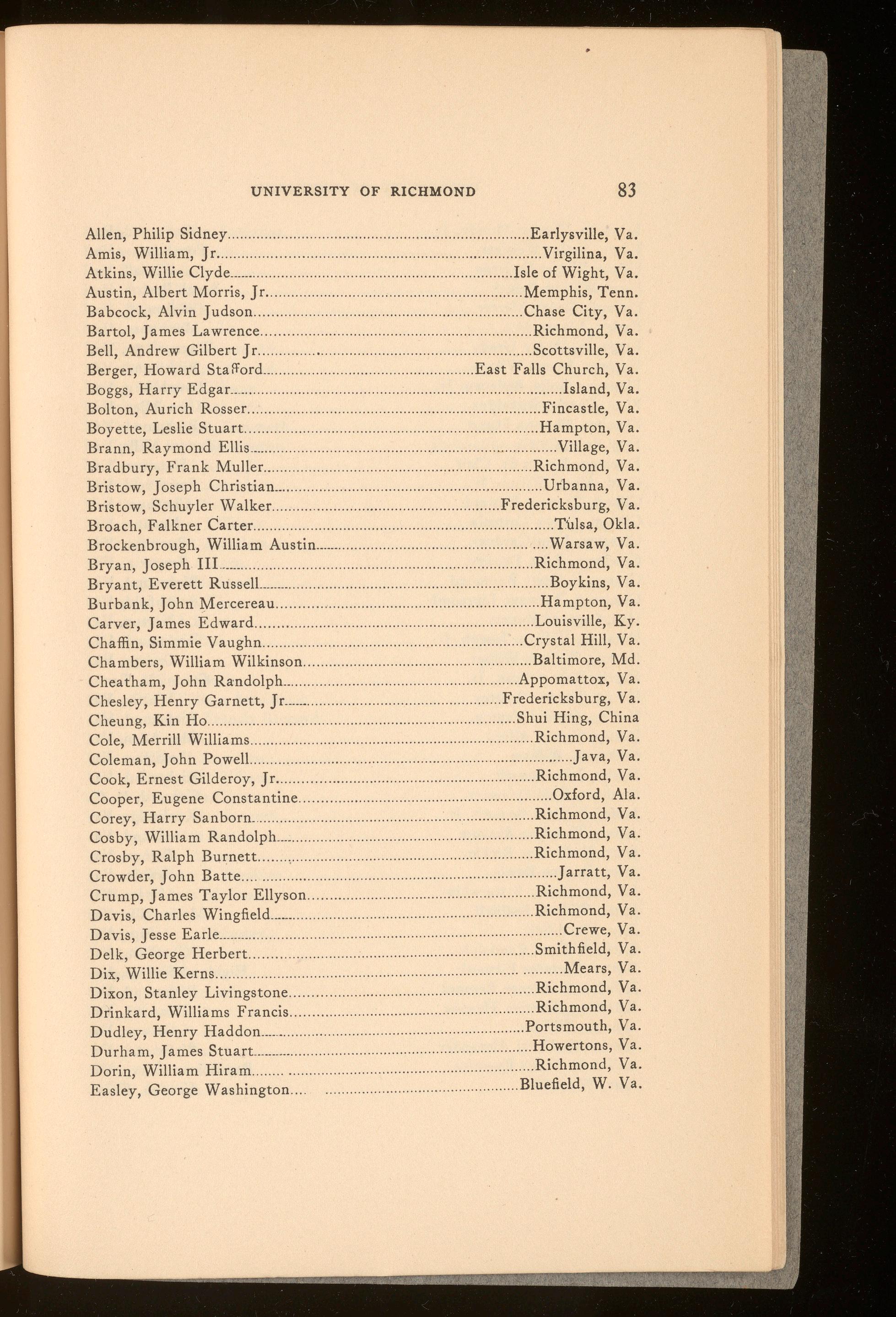
Earlysville, Va.
Amis, Will ia m, Jr....................... ................................................Virgilina, Va.
Atkin s, Willi e Cly d e.... .......................... .................... .. ..Isle of Wight, Va.
Austin, Alb e rt M o rri s, J r ................. ............................ Memphis, Tenn.
Babcoc k , Alv in Judson.. ..... ......... Chase City, Va . Bartol, Jam es Lawrenc e .......... ........ .................... Richmond, Va
B ell, Andr ew Gilbert Jr .......... .......... Scottsville , Va
Ber ger, H o wa rd Sta fford ................................... East Falls Church, Va .
B oggs, H a rr y E dg ar .. .... ..........Island, Va
B olton, Au rich R osse r ................. .........Fincastle, Va.
B oy et te , Le slie St uart .................. ......... Hampton , Va
B rann, R ay mo nd Elli s. .............. ............ .Villag e, Va.
Bradbury, Frank Muller ...........Richmond, Va.
Br istow , Jose ph Chri stian .......... .......Urbanna, Va.
B risto w, Schu y le r W a lk er ......... ......... ........ .Fredericksburg , Va
Broach , Fal k n e r Carter ............... ....Tiilsa, Okla .
B roc kenb ro u gh , William Au stin ....... Warsaw , Va.
Br ya n , J os eph 111......................................... ..........Richmond, Va
Bryant , Everett RusselL. ........ .................. ...... ....Boykins , Va.
Burb a nk , J oh n M e rcereau .. ....... ........ ................ Hampton, Va
Ca rve r, Jam es E d ward ............... Louisville, K y .
C h affin , Sim mie Vau ghn ........... ...... Cr ys tal Hill , Va
Chambe rs, William Wil kin son ................ ........ Baltimore, Md
Ch eatham , J oh n Rand olph ....... Appomattox, Va .
Che sley , H e nr y Garnett, Jr. ......... Fredericksburg, Va .
Cheun g, Kin H o .......Shu i Hing, China
C ole, M er rill William s ..... .......... .... ....................... Richmond, Va
Cole ma n, J o hn Po well ... ........ ...... .Java , Va .
C ook, Ern est Gildero y , Jr . ........... .Richmond, Va
Cooper , Eu gene Const a ntin e ....... ..................... ...... Oxford, Ala
Corey, Harr y Sanborn .................. ... Richmond, Va
Cosb y , W ill ia m Rand olph .................. Richmond, Va .
Cro sb y , R a lph Burnett ..... . ......Richmond , Va
Crowd er, J o hn Batte ............................ Jarratt, Va
Crump, J a m es Ta y lor Elly son .......... . Richmond , Va.
Davi s, Charl es Wingfield ................... Richmond, Va.
Davi s, Jes se Earl e....... Crewe, Va
Delk, Geor ge H e rbe rt. . Smithfield, Va .
Di x , Willi e K e rn s ...................... Mears, Va . Dixon , Stanle y Livin gsto n e .............. R ichmond, Va.
Drin k ard, Williams F ra ncis ....Richmond, Va
Dudle y, Henr y Haddon ...... Portsmouth, Va . Durham, James Stuar t ................ Howertons, Va.
Do rin , Willi a m Hiram ........... ... ...... Richmond , Va.
E asley, Ge o r ge Wa shi ng t o n ............. ... Bluefield , W . Va.
84
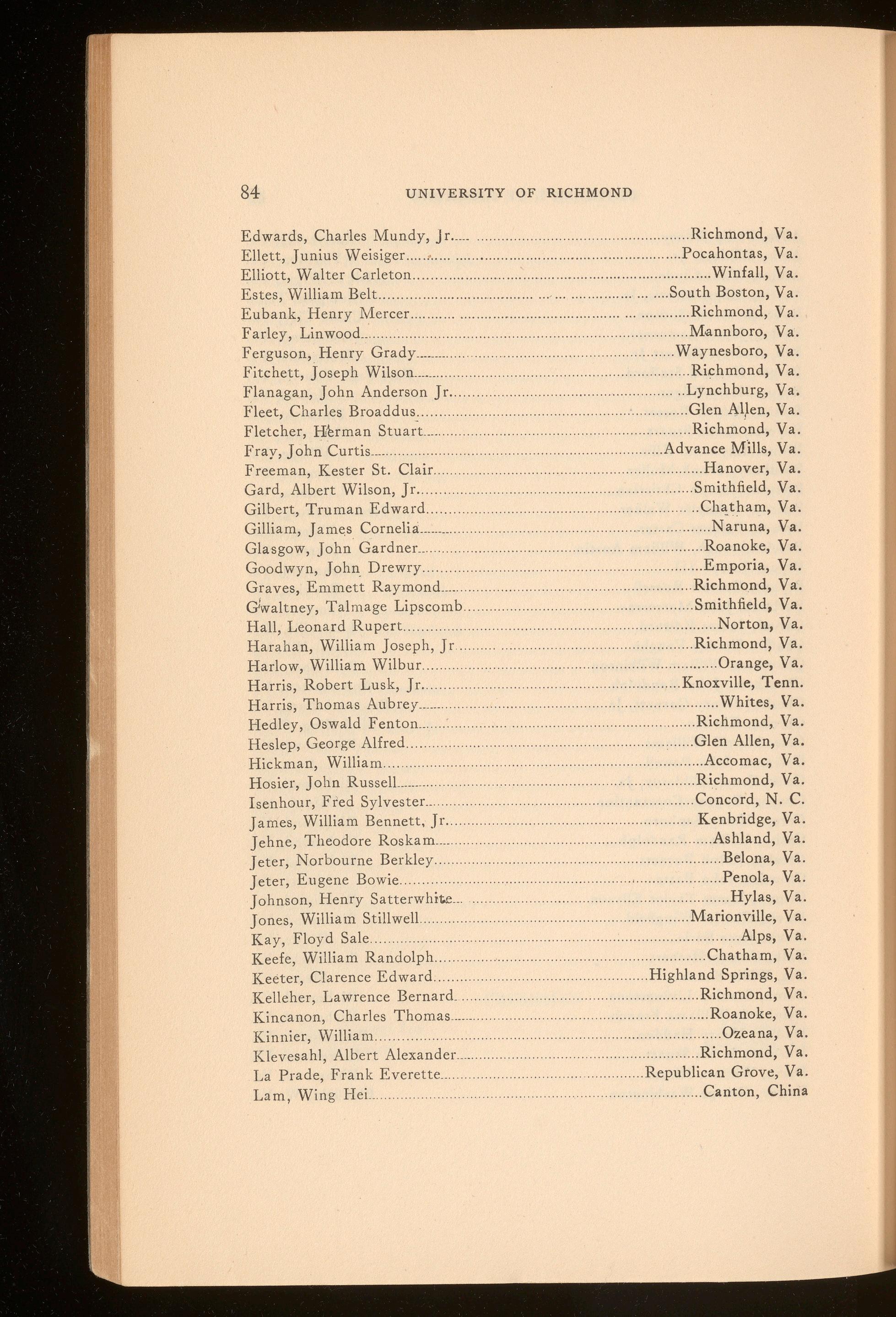
Edwards, Charles Mund y , Jr..... .... ....................................Richmond, Va.
E llett, Junius Weisiger ..... • ........ ........ ........ Pocahontas, Va.
Elliott, Walt er C a rleton ........................................ Winfall, Va.
Estes, William Belt . ... ........... .. South Boston, Va.
Eubank, Henry Mercer ........................ ........................ ........... Richmond, Va.
Farley, Linwood ....... ......... M.mnboro, Va.
Ferguson, Henr y Grad y............. Waynesboro, Va.
Fitchett, Joseph Wilson .. Richmond, Va.
Flanagan, John Anderson Jr... Lynchburg, Va.
Fleet, Charles Broaddus...... Glen Al,len, Va.
Fletcher, Hhman Stuar -t .... .. Richm~nd, Va.
Fray, John Curtis Advance M1lls, Va.
Freeman, Kester St. Clair Hanover, Va.
Gard, Albert Wil son, Jr. Smithfield, Va.
Gilb ert, Truman Edward...... ..Ch~tham, Va.
Gilliam, Jam es Cornelia ... .......Naruna, Va.
Glasgow, John Gardner.. ..Roanoke, Va
Goodwyn, John Drewry .....Emporia, Va.
Graves, Emm ett Raymond.... Richmond, Va.
Glwaltney, Talmage Lipscomb. ... Smithfield, Va.
Hall, Leon a rd Rupert........ ........... Norton, Va.
Ha raha n, William Jos eph, Jr .. ..... Richmond, Va.
Harlow, William Wilbur.... Orange, Va.
Harris, Rob ert Lusk, Jr .. Knoxville, Tenn.
Harris, Thomas Aubrey.. ...Whites, Va.
Hedley, Oswald Fenton Richmond, Va.
Heslep, George Alfred.... .................... Glen Allen, Va.
Hickman, William ..... Accomac, Va.
Hosier, John Russell...... ... ..Richmond, Va.
I senho ur, Fred Sylvester... Concord, N. C.
James, William Bennett, Jr. .......Kenbridge, Va.
Jehne, Theodore Roskam ......... Ashland, Va.
Jeter, Norbourne Berkle y .. Belona, Va.
Jeter, Eugene Bowie Penola, Va.
John son, Henry Satterwhite ....Hylas, Va.
Jones, William Stillwell Marionville, Va.
Ka y , Flo y d Sale ............................. Alps, Va
Keefe , William Randolph.. ... Chatham, Va.
Keeter, Cl are nc e Edward........ Highland Springs, Va.
Kelleher, Lawrence Bernard Richmond, Va .
Kincanon , Charles Thomas Roanoke, Va.
Kinnier, William.. Ozeana, Va.
Klevesahl, Albert Alexander.. .............................. Richmond, Va.
La Prade, Frank Everette ............ Republican Grove, Va.
Lam, Win g Hei .... Canton, China
UNIVERSITY OF RICHMOND 85
Lambeth, Nathan Lavinder .. Leach, John Mel ver. .. Leo, Louis Selnik
Lutz, Athe y Ra gan ......
Lutz, John Mark ............
Mahaney, Wilbur Le e .
Marilla, E s mond Linw o r t h Marshall, Aubrey Edmond
Mart z , Thom a s Gi b so n .. ..
Ma ssie, John H e nr y , Jr.. ....... . McCastor, Jo sep h T ecum se h ....... .. ...
McDaniel, John f¥rrin gt o n
McKee, Samuel Kerr, Jr
McNiel, George Sa unders ..
Meador, Blake William . Miller, Clarence Will i am
Miller, Edward Th eodor e ..
Milner, Morris Edwi~
Minor, Jam es M a dison
Mitchell, Alfred King
Monds, Al v ah Bro w n ...... .
Mood y , Austin R ob e rt
Mood y, Nae! H os ea
Moore , Buford Davi s......
Moorefield, William Armi stea d ..
Mullen, G eor ge Franci s B er nard
Mu sick, Elva
Noble, Willard R ey n olds ....
Nolde, Fred e rick William O'Sullivan , Rolf e Glov e r. ..
Pag e , Norvell W o rd sworth .. Pankey, WilliaI_URussel... . Park e r, L es lie Alt o n Pettus, William J . Hopkins Pilcher, Robert Ma son ....... Pr eva s , Jam es....
Pruden, Edward Hugh es Pull y, Ma son H a rd en Pur y ear, Erwin ..... Rader, Jac o b Kenneth
Ra y , John Robert ........
Reams , Claude Els o m
Reed, Robert Buren
Reese, Rob e rt R oland
Ribble , William Henr y ..
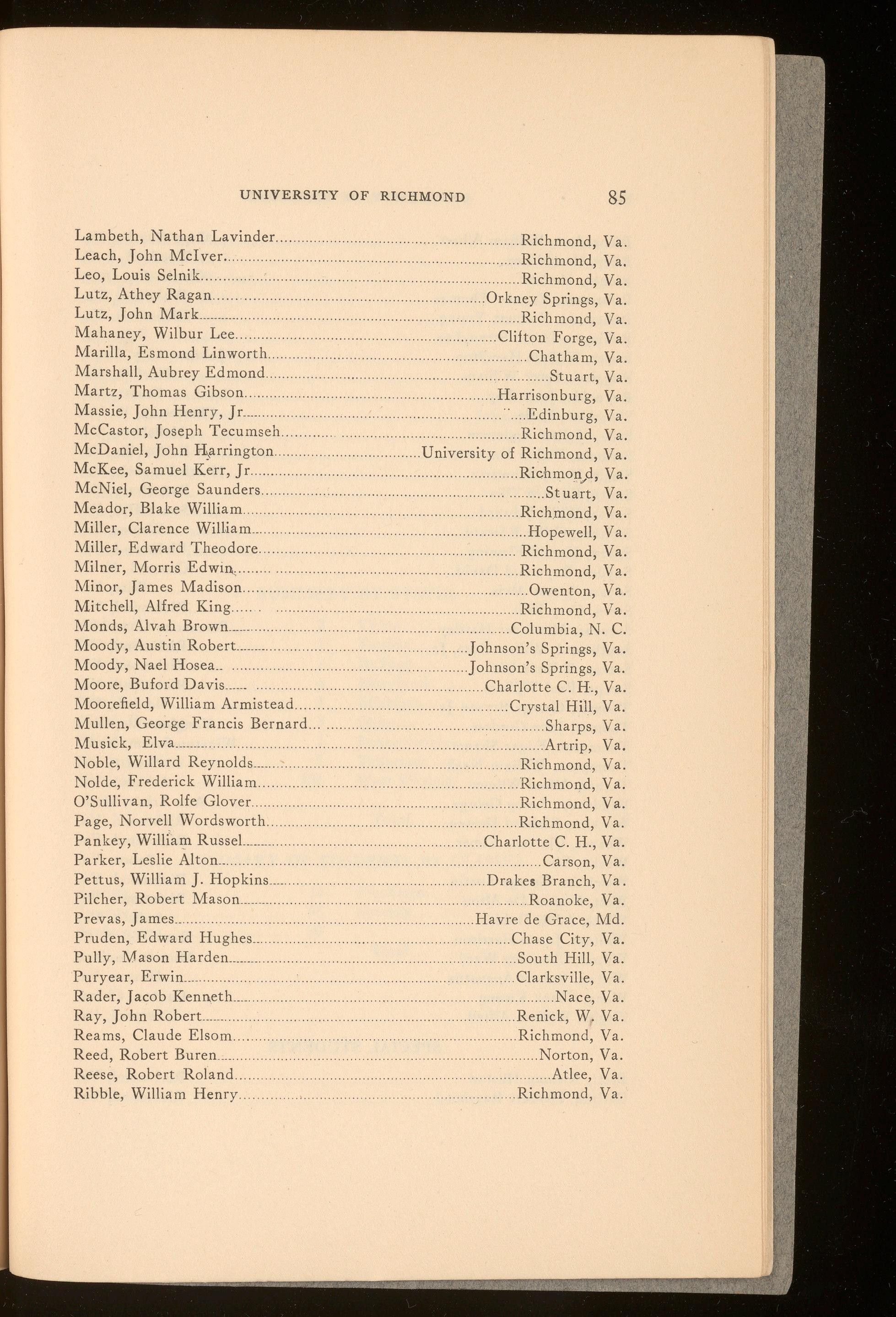
Richmond, Va.
............. Richmond, Va.
. ..Richmond, Va.
Orkne y Sprin gs , Va
............ . Richmond, Va .
....Clifton For ge, Va. Cliatham, Va
Stuart, Va . Harri sonbur g, Va.
··....Edinburg, Va.
Rich mond, Va
Universit y of Richm o nd, Va
. Richmo n.,d, Va.
.........Stuart, Va.
.Richmond, Va.
Hope well, Va.
Richmond, Va.
....... Richmond, Va.
.......Owenton, Va.
Richmond, Va
... .Columbia, N. C.
.Johnson 's Sprin gs, Va.
J o hn son 's Spring s, Va.
.......... Charl ot te C.H , Va .
. .. ...Cry stal Hill , Va.
....Sh a rp s, Va . Artrip, Va.
Richmond , Va ..R ichmond, Va.
...... R ichmond, Va.
..... Richmond, Va .
....Charl ott e C. H , Va .
... Car so n, Va
............ Drak es Branch, Va
................ R oan o ke, Va .
......... H a v re d e Grac e, Md .
.Cha se Cit y , Va.
...... Sou t h Hill , Va Clarksville , Va.
..Nace, Va
.....R e nick , W Va .
.........Richm ond, Va.
........... No rt o n, Va
.Atl ee, Va .
...Richm on d, Va.
86

Richardson, William Albert ........... . .........Cape Charles, Va.
Riley, Harold Lee. ................. .............. ......Woodruff, S. C
Ricker, Herbert . ...... ....... ............. ..... ...Chickasha, Okla.
Robert/son, Eugene Thomas ............... ...........Wak~fi~ld, Va.
Robertson, Emmett Young ............. ........... .Richmond, Va.
Robinson, David Straughan ................... ............... .Palls, Va
Roper, William Hamilton .. ............. ..... ............. .............Johnson City, Tenn.
Ruggieri, Peter William.... ... ............ ........ ......Norfolk, Va.
Reynolds, Jesse Fay ............... ....................... ............... Stuart , Va .
Shamblen, Earle ..... ............ ....... ......Charleston, W. Va.
Salle, Julian A~erson ....... ..... .......... ... Hallsboro, Va.
Scribner, Walter Emmett .. ... ............ ...................... .......... Earlysville, Va
Slagle, H.arry Schwartz. ... ...... .............. ..North Emporia, Va.
Smith ., Edward Tillar ...................... ............... ................................. Petersburg, Va
Smith, Willie ~dward ...... ........ ............ South Hill, Va.
Smither, Collin Edward ............... .................. ..................................... Weems, Va
Snead, Harold Fleming ......... ... ............ Richmond, Va
Snyder, Raymond David ........ ............. .......... Concord, N. C
Soyars, James Alvis ................. ............... ........ ..... Witt, Va .
Stern, Cary Ellis ........ ........... ... ...... ..Richmond, Va.
Stevens, Alexander Hartley ... .. ...... ................ Pocomoke City, Md
Southward, Wilber Ross, Jr... ........ Richmond, Va
Sutton, Tribble Dix ............... ....... ..... ......Richmond, Va.
Swope, Paul Wjlliam .. . ........ .......... . ......Richmond, Va.
Thomas, George Bryson Jr .. ............ Norfolk, Va
Thomas, John Gordon ........... .............. Vanghnsville , Ohi o
Thompson, Edgar Shaner.. ...... .Winston-Salem, N C.
Thompson, William Nash ............... ........... ........................ Stuart, Va .
Turner, Alfred Wilmer . ........... .......... ................ Ashland, Va
Vandeveer, Leroy George ....... .......... ... . Ann Arbor, Mich
Watkins, Richard Hasten ........... ......... ................... ....... .Richmond, Va .
Weaver, Clr1rence Elmer ............... ............... Richmond , Va
Week's, Elie ..... ............ ............. Sabot, Va.
Welchons, George Austin .. ............. ..... ......Richmond, V a.
West, Eugene De Alton ............ .......Richmond, Va
White, Addis Dobie .... ........... ........... ............. Suffolk, Va
Whitner, James Harrison. ............... ....................Rock Hill, S. C. Wilson, Channing w ard ..... . . .... .......... .Muncie, Indiana
Witten, Robert Augustus . . ... ........... ....... Hatton, Va. Wong, Chack Kwong . ............... ......... ......... .Canton, China. Ziegler, William Alfred . . ............ ............. Liverpool, Pa
Brett, Rieman Huston ... ................ ............. Richmond, Va
Carlton, Herbert Raymond ..... ... ............................. Richmond, Va
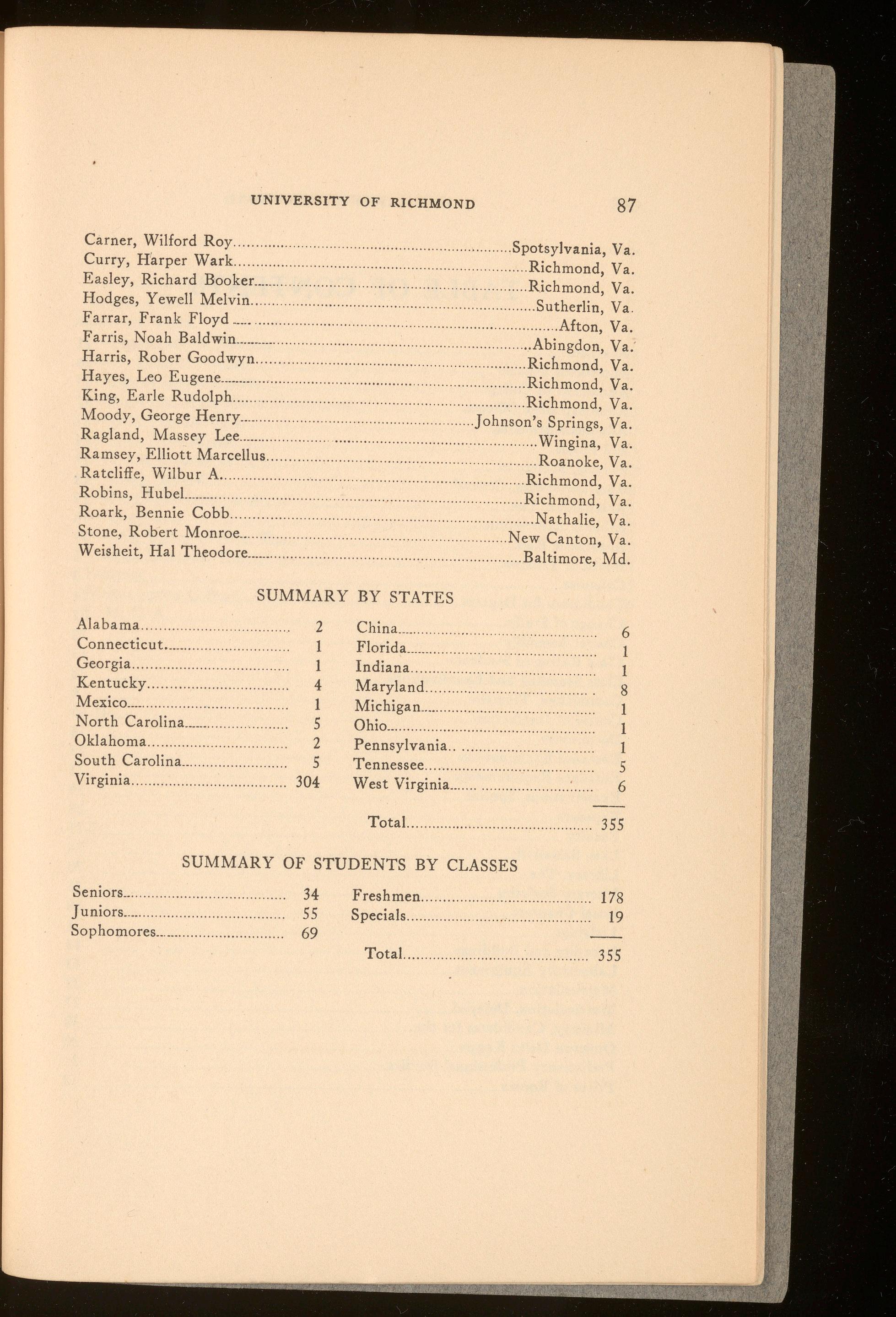
Carner, Wilford Roy ....... .. .......................... ... Spotsylvania, Va. Curry, Harper Wark.. ......... .......... ...................... ...... Richmond, Va. Easley, Richard Booker.... ......Richmond, Va. Hodges, Yewell Melvin ........... ............. ............ Sutherlin, Va . Farrar, Frank Floyd ................ ...................... ... ....... ....Afton, Va. Farris, Noah Baldwin.... ....... ................. .......... ............... ..Abingdon, Va. Harris, Rober Goodwyn. ... ........................ Richmond, Va. Hayes, Leo Eugene....... ..... ................... .............. ...... Richmond, Va. King, Earle Rudolph. ............ .... ............ . Richmond, Va Moody, George Henry ........... Johnson's Springs, Va. Ragland, Massey Lee ................ ........ ...... Wingina, Va. Ramsey, Elliott Marcellus.... ............ Roanoke, Va. Ratcliffe, Wilbur A.. . ...................... Richmond, Va. Robins, Hubel.......... ... ...Richmond, Va. Roark, Bennie Cobb.. ..... .....Nathalie, Va. Stone, Robert Monroe.. .. ......New Canton, Va. Weisheit, Hal Theodore.... ........................ ... ......Baltimore, Md.
Absence s ....
Accredited Schools
Admi ssion t o College ......
Admini strati ve Officers ..
Advanced Standing
Aid Funds
Alumni, Society of... .
Announcements, General. ..
Arachnidae, The Athletic As sociation
Automatic Rule
Board of Tru s tee s
Calendar
Candidate s for D eg ree s .......
Chan ge of Study
Chapel Assembl y
Cl
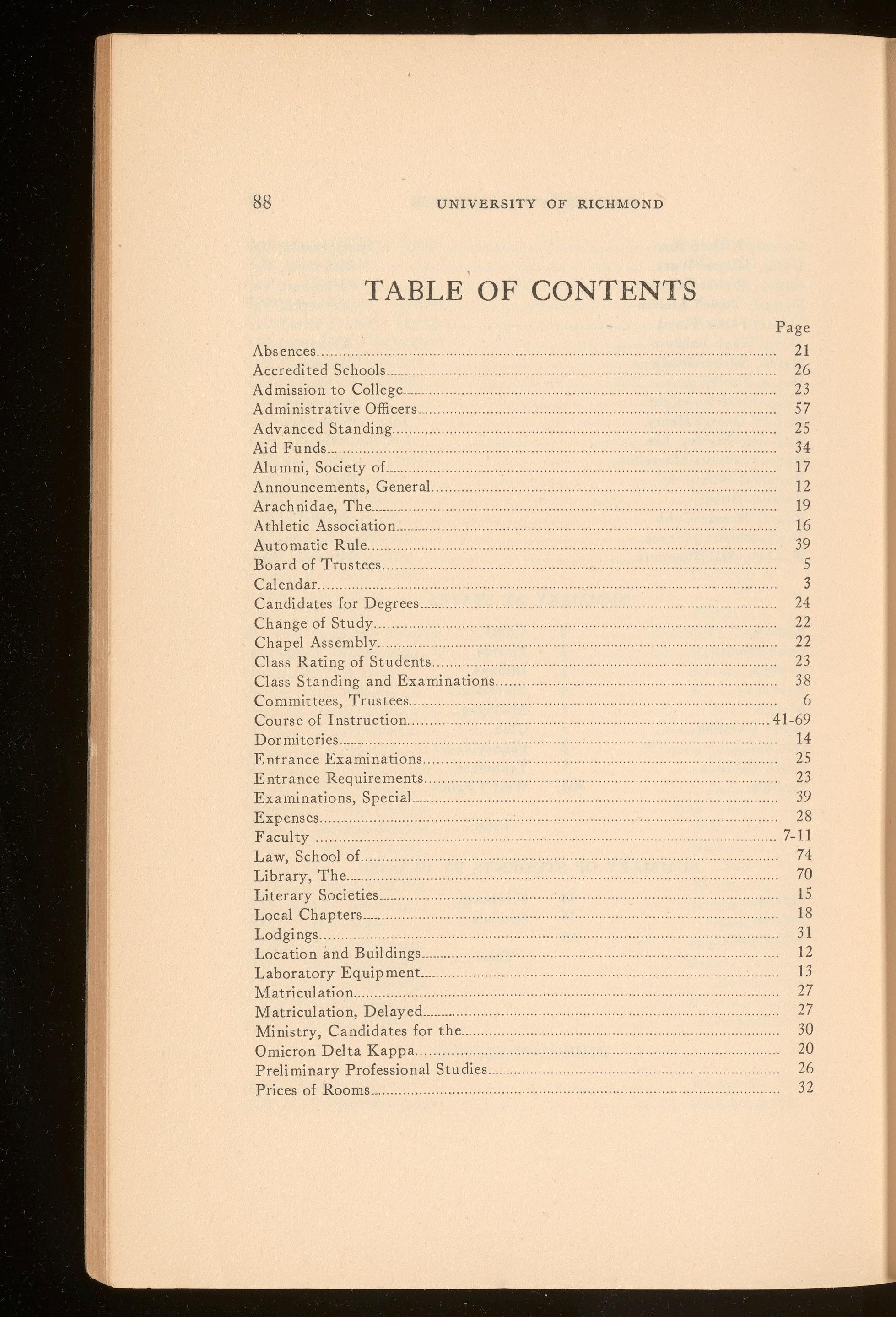
Expen ses.
. Law, School of Library, The . . Literary Societies
Local Chapters
Lodgings ..
Location and Buildings .
Laboratory Equipment .
Matriculation .
Matriculation, Delayed Ministry, Candidates for the ..
Omicron Delta Kappa Preliminary

Prizes __ ..
Regulations Governing Athletics _______ _
Religious Services----------·•··
Reports, Term Requirements for Degrees
Reservation of Rooms ______ ..
Residence Requirements. ____ _
Scholarships, Regulations Concerning Student Organizations ________ ..
Student Publications ____
Students, Register of _____ _
Students, Special Stu dent Self-Government _____ _
Summary ______
Summer School of Arts, The .. Thomas Lectures, The .. Trustees ______ Westhampton


